A Cornered Lion: Chapter 6-The Great Crusade
Game: Hearts of Iron III
Published: 2019-11-03, edited: 2020-01-08
Comments thread
Part of the campaign:
A Cornered Lion
Previous part:
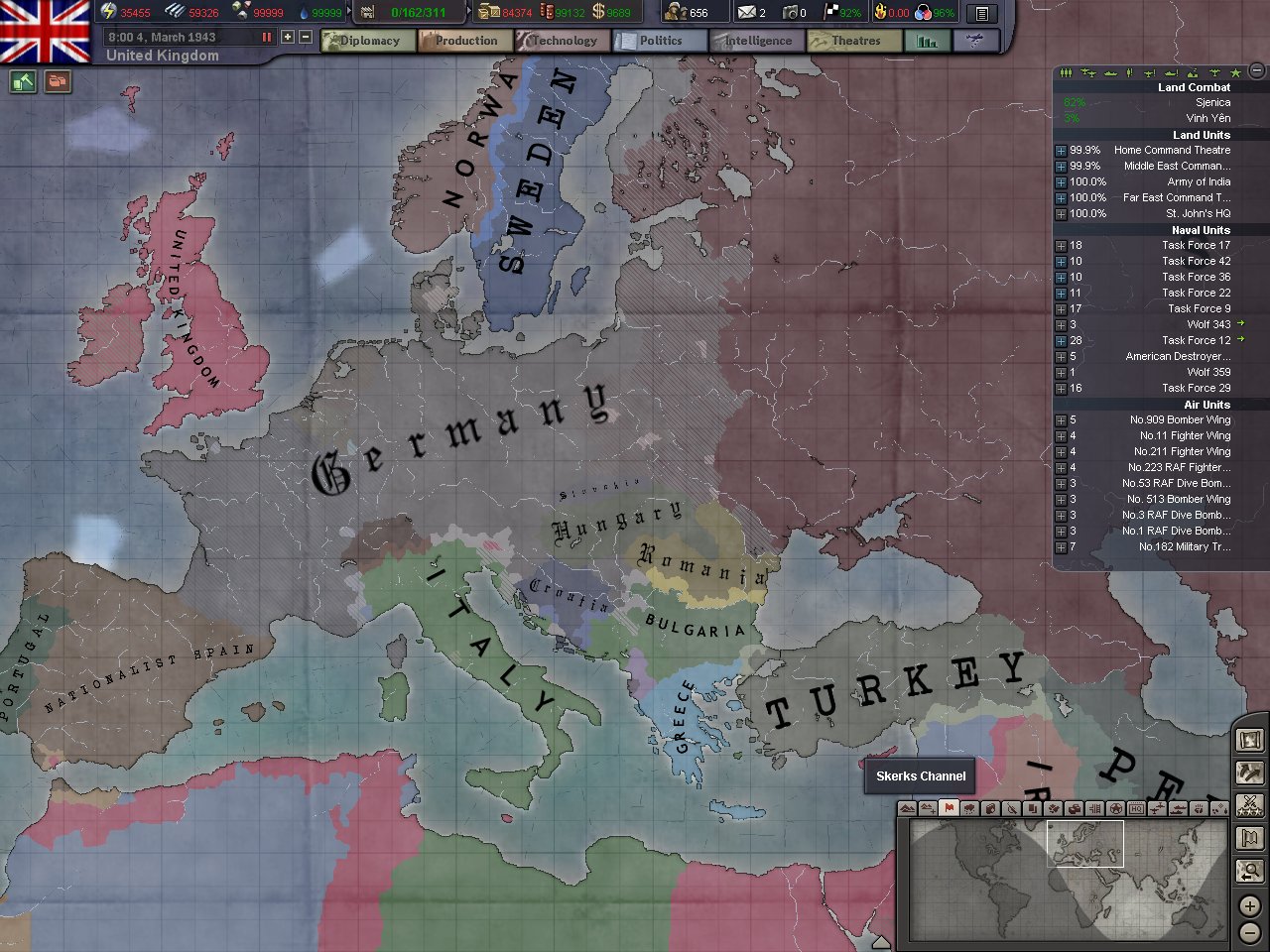
March 1943.
The situation in Europe has changed drastically in a year. Our two small corps in Greece have broken out of their pocket and are on the advance in the Balkans. Bulgaria has been liberated and changed sides, and our forces are nearing the Romanian capital city.
Italy has also changed sides following a daring commando raid which resulted in the capture of the Italian government. Our forces are now digging into positions in the Alps on the German and French border, and preparing for whatever the few remaining Axis nations in Europe will throw at them.
In the Far East our forces are locked in a bitter and bloody struggle for Hanoi. The Japanese have landed over 20,000 men into their small pocket, and everyday more land. To knock out the Japs from their final toe hold in Vietnam will either cost us thousands of young men, or were going to have to get daring.
The situation in Europe has changed drastically in a year. Our two small corps in Greece have broken out of their pocket and are on the advance in the Balkans. Bulgaria has been liberated and changed sides, and our forces are nearing the Romanian capital city.
Italy has also changed sides following a daring commando raid which resulted in the capture of the Italian government. Our forces are now digging into positions in the Alps on the German and French border, and preparing for whatever the few remaining Axis nations in Europe will throw at them.
In the Far East our forces are locked in a bitter and bloody struggle for Hanoi. The Japanese have landed over 20,000 men into their small pocket, and everyday more land. To knock out the Japs from their final toe hold in Vietnam will either cost us thousands of young men, or were going to have to get daring.
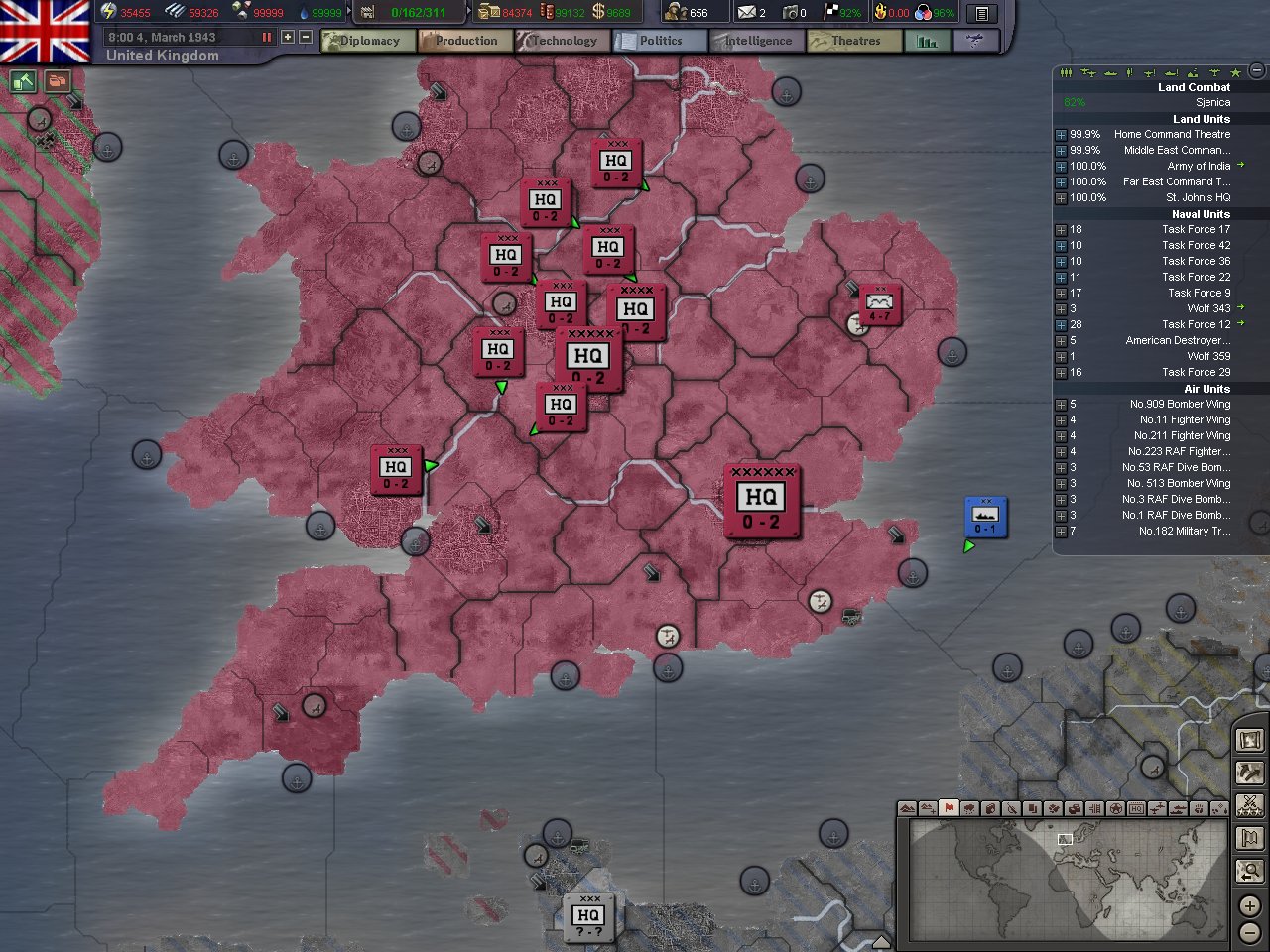
Back in England, the two armies that have been training for the last year and a half are finally given orders. All divisions are ordered to the coast and begin preparations for a major amphibious operation to come.
The spearhead of the operation will be led by three Royal Marine Commando corps, several infantry corps, one armored corp. And the elite Paratrooper Corp.
The spearhead of the operation will be led by three Royal Marine Commando corps, several infantry corps, one armored corp. And the elite Paratrooper Corp.
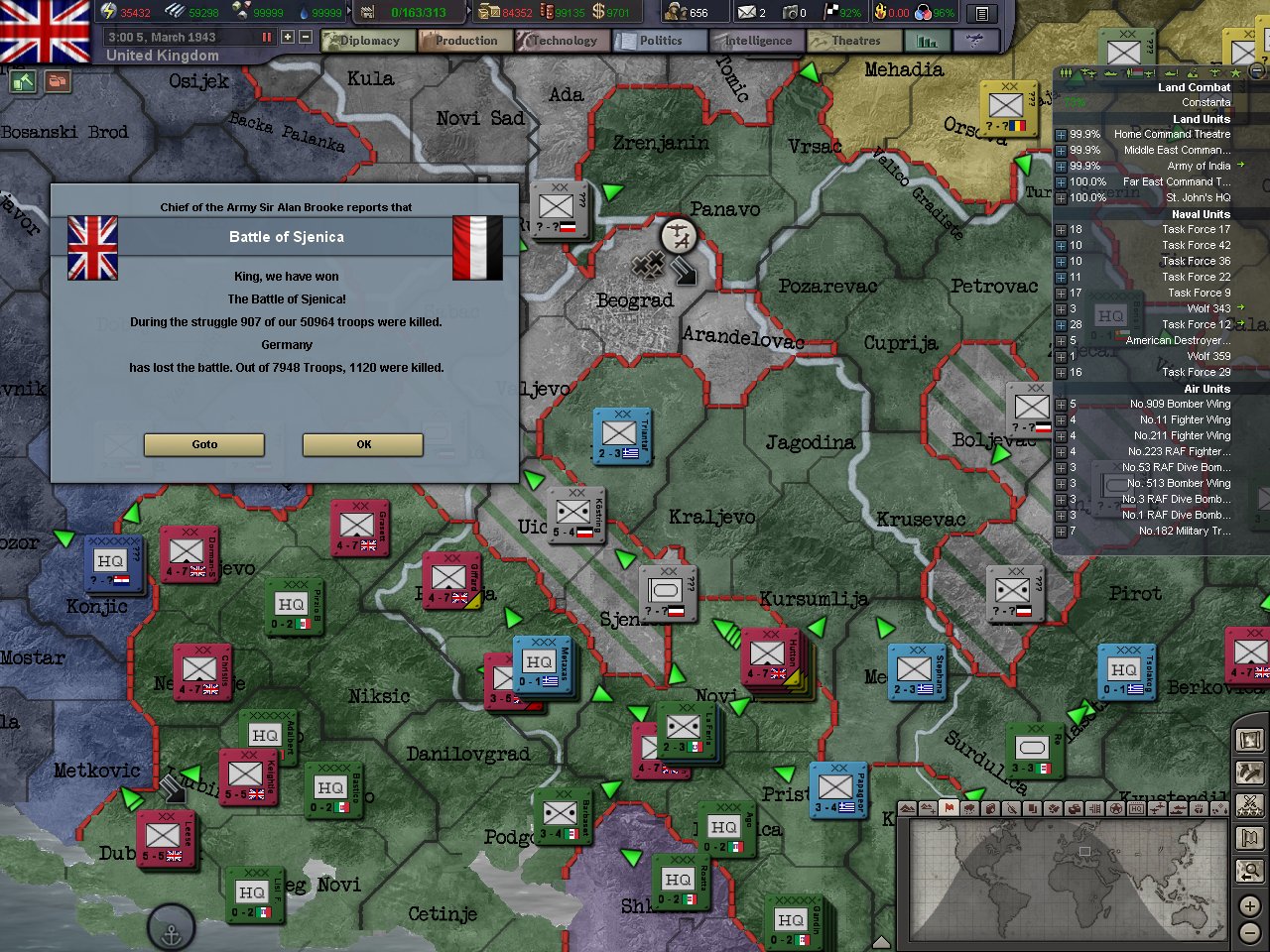
In the Balkans our forces continue to try and isolate German units where they can. With the front lines so fluid on this front and Allied forces advancing so rapidly, German units getting left behind are sitting ducks for our troops. Surrounding them is the easy part, but actually destroying them is another story. Surrounded and alone or with support, German soldiers rarely give up the fight easily.
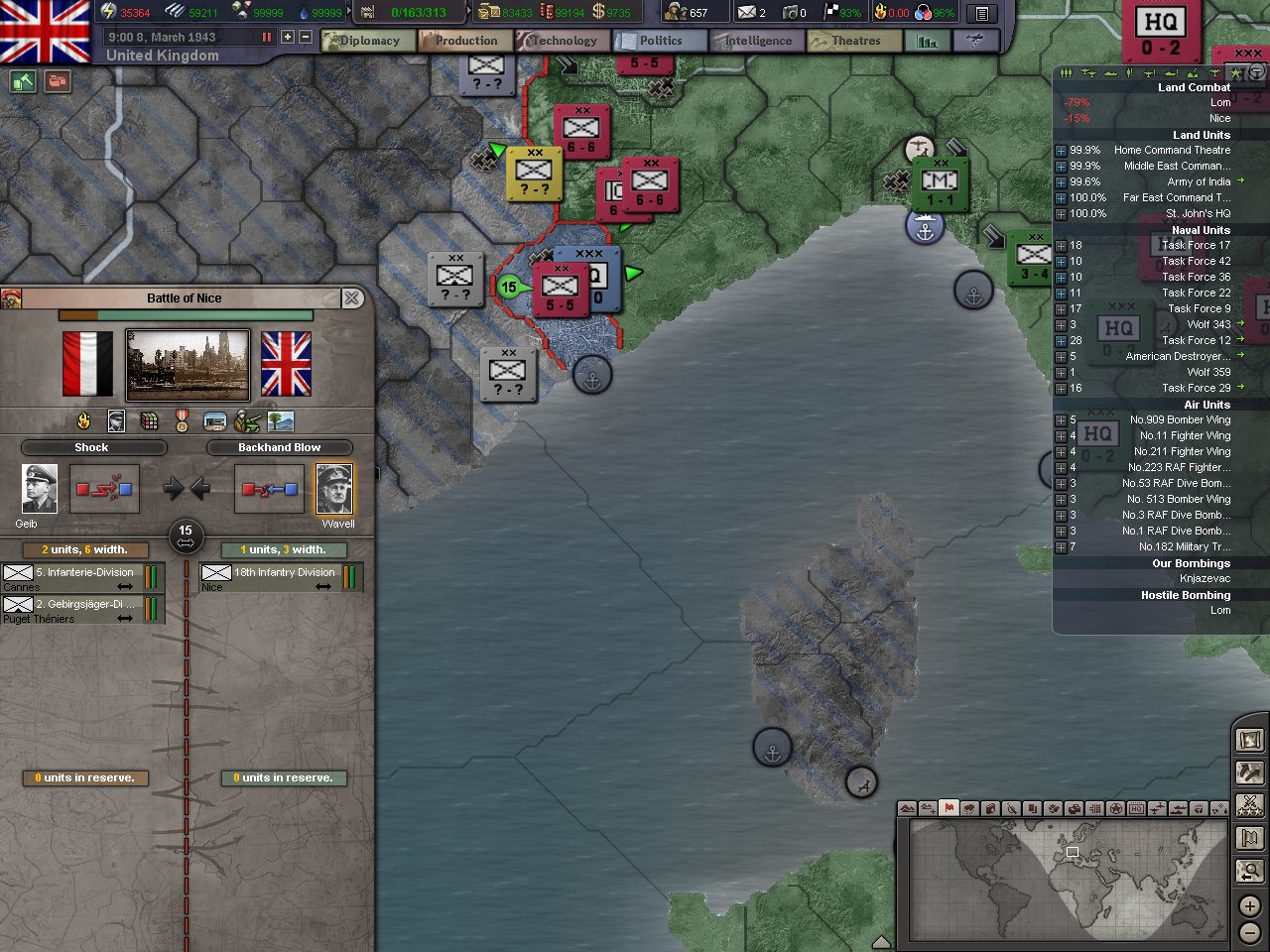
In France, the city of Nice on the Italian-Franco border rose up in revolt.
Two infantry divisions were hastily moved into the city to support the Free French Forces that are fighting in the city. As well as naval support, in the form of Vice Admiral Mountbatten's Task Force 29 with the battleships Rodney, Royal Sovereign, and Royal Oak to give supporting fire to our troops.
Almost day and night Mountbatten's task force ran up and down the French coast raining shells on anything that moved. Smaller ships moved closer to the coast and provided close artillery support in the streets of Nice.
Two infantry divisions were hastily moved into the city to support the Free French Forces that are fighting in the city. As well as naval support, in the form of Vice Admiral Mountbatten's Task Force 29 with the battleships Rodney, Royal Sovereign, and Royal Oak to give supporting fire to our troops.
Almost day and night Mountbatten's task force ran up and down the French coast raining shells on anything that moved. Smaller ships moved closer to the coast and provided close artillery support in the streets of Nice.
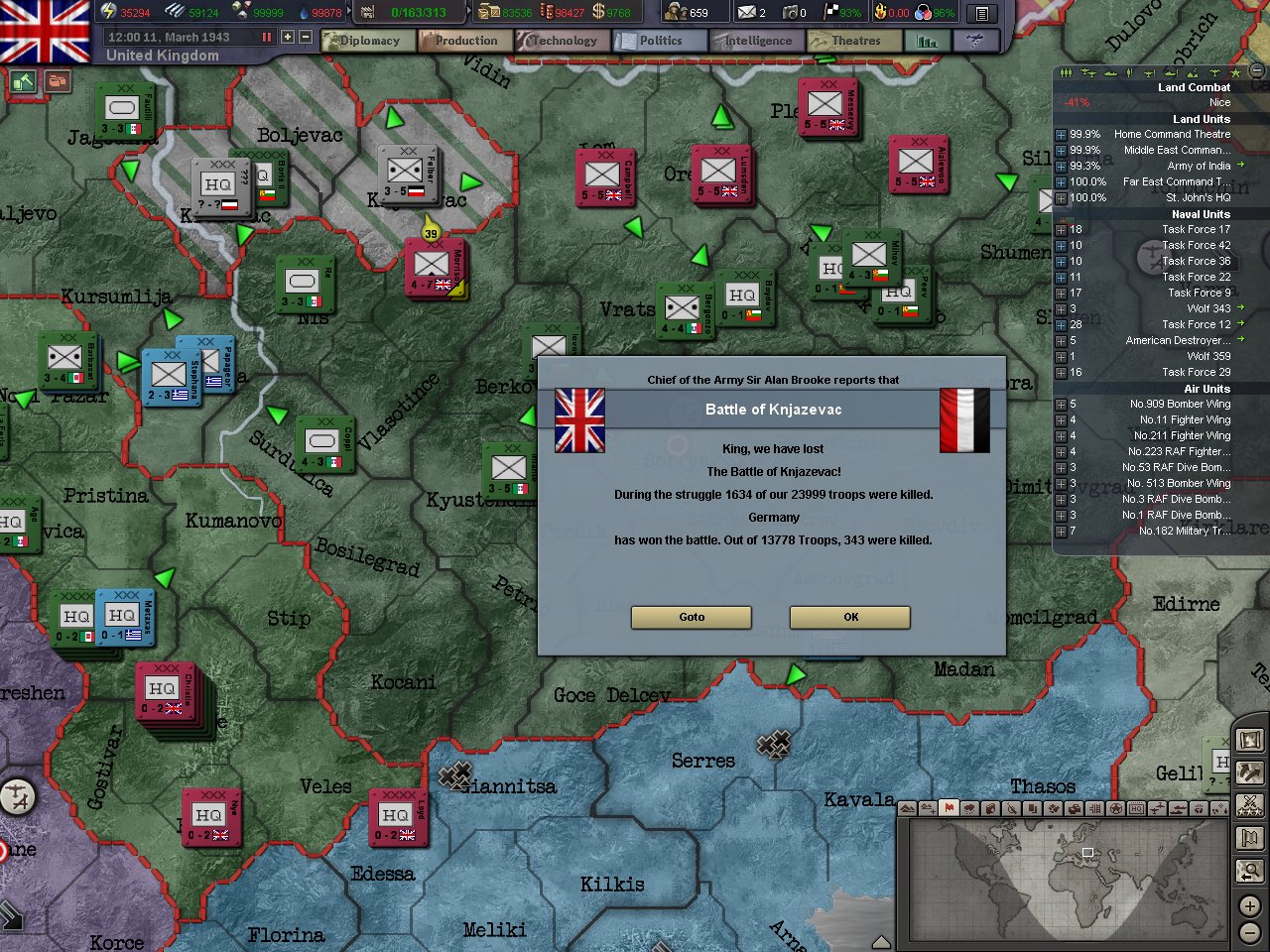
In a text book display of the desperation of our enemy , two German motorized divisions fight like men possessed to break out of their pocket. And in two battles they inflicted 2,260 causalities on us.
Luckily an Italian armored division and two Greek infantry divisions are close by to help keep the fight going on the Germans trapped.
Luckily an Italian armored division and two Greek infantry divisions are close by to help keep the fight going on the Germans trapped.
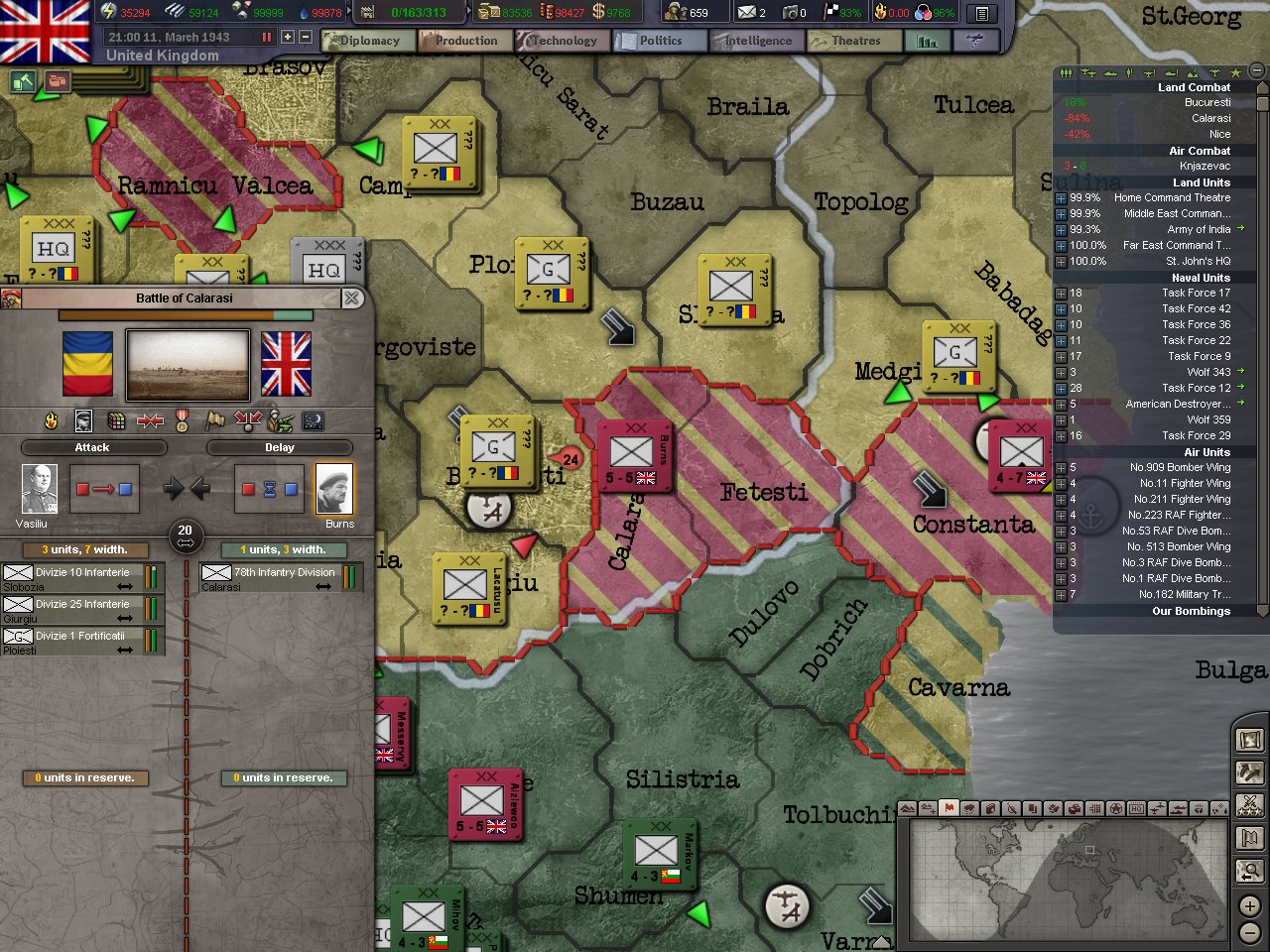
While our forces are attempting to destroy Germans trapped behind our lines, two of our divisions had flanked and were attacking the Romanian capital from the east. More forces would soon join the battle once they forced crossings over the Romanian-Bulgarian border.
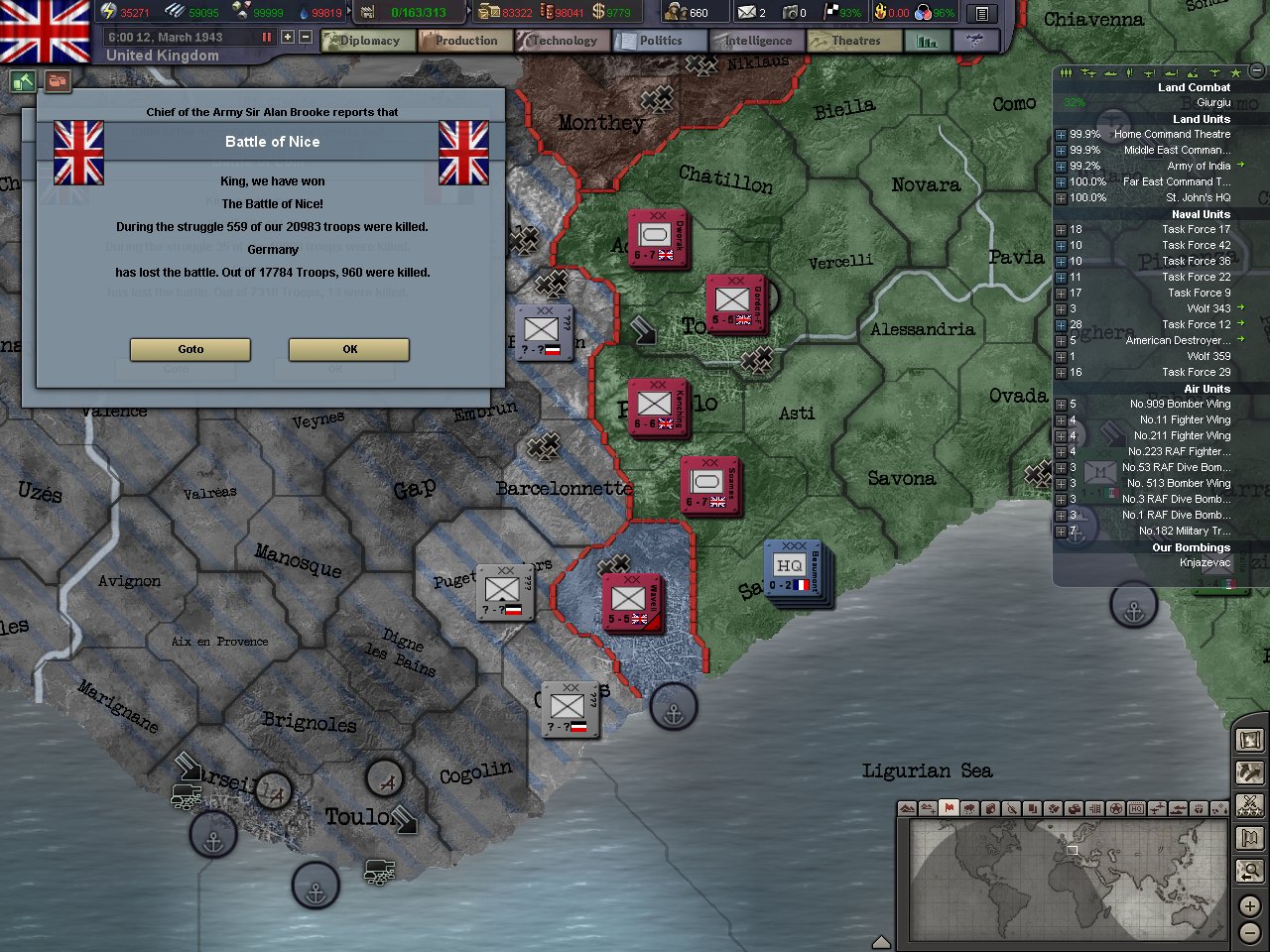
With a victory in Nice, a chink in the line of fortifications that the Germans occupied on the border was exposed. Now it was just a matter of using the flanks to get around the occupied bunkers and fortresses.
The old French fortifications may have been constructed before 1938 but were still just as deadly.
The old French fortifications may have been constructed before 1938 but were still just as deadly.
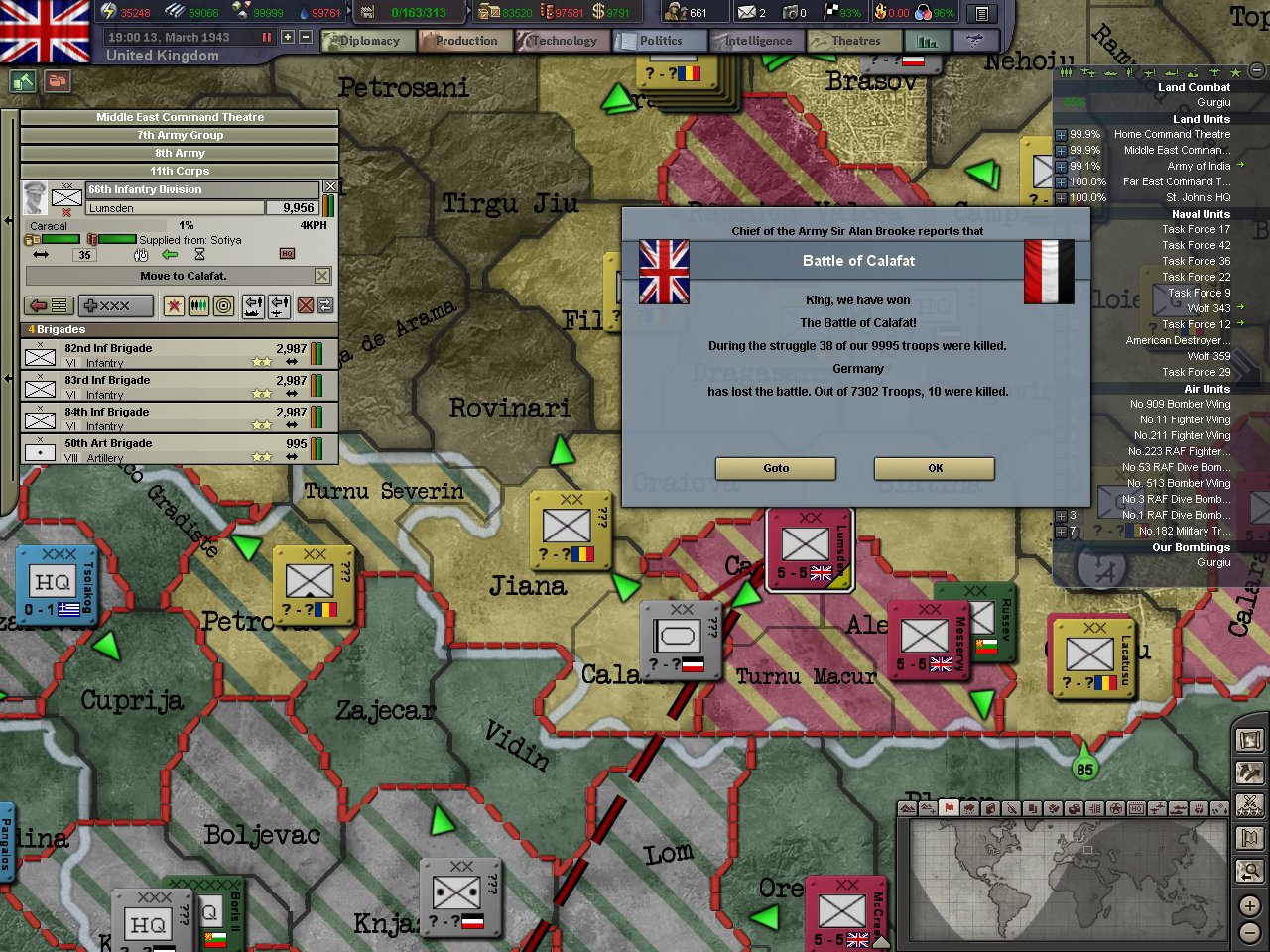
With two of our divisions across the Romania border we began clearing the banks and moving towards the capital. A German heavy armored division that could've really hurt our troops was forced to retreat when our infantry appeared on the flank of their line and was sent running to the north-west, away from our forces thankfully.
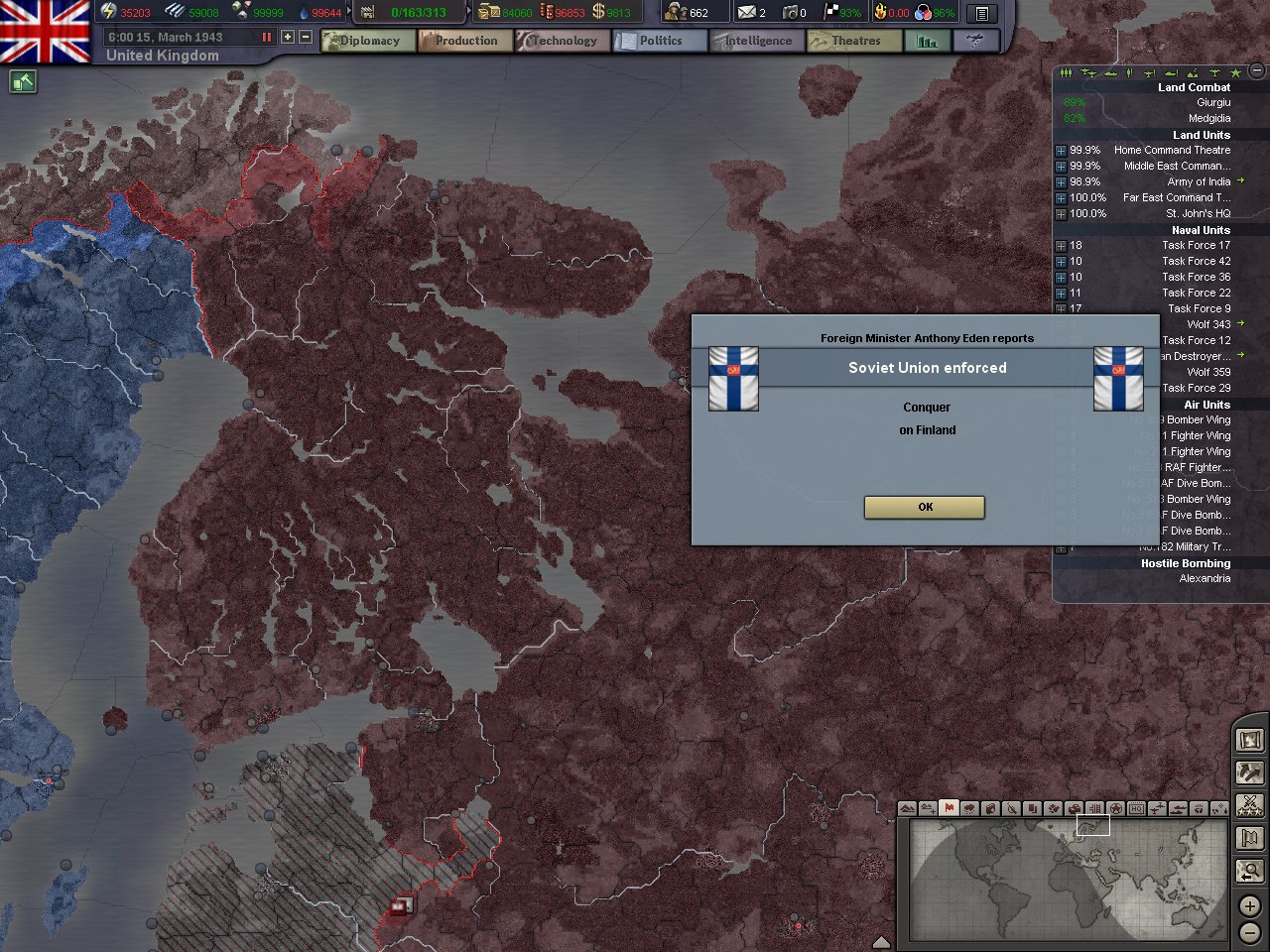
Away from the frontlines and the blood and the guts, international news was made. The Soviet Union formally annexed Finland, adding them their union of states.
In Parliament, several MP's made comments on the brutal communist regime in Moscow, swallowing up another democracy. While they didn't say it in plain English, some MP's did make illusions to, once Germany was defeated, to continue the fight and liberate occupied countries from under the fist of Moscow. They were met with scattered applause but public support steadily began to shift against Communist parties in the Empire and around the world.
And as more news was filtered from the eastern front of the terrible fighting and savage acts committed by both sides on the civilian population. Public opinion began to shift heavily towards liberating oppressed people in Europe. Whoever might be ruling those lands.
In Parliament, several MP's made comments on the brutal communist regime in Moscow, swallowing up another democracy. While they didn't say it in plain English, some MP's did make illusions to, once Germany was defeated, to continue the fight and liberate occupied countries from under the fist of Moscow. They were met with scattered applause but public support steadily began to shift against Communist parties in the Empire and around the world.
And as more news was filtered from the eastern front of the terrible fighting and savage acts committed by both sides on the civilian population. Public opinion began to shift heavily towards liberating oppressed people in Europe. Whoever might be ruling those lands.
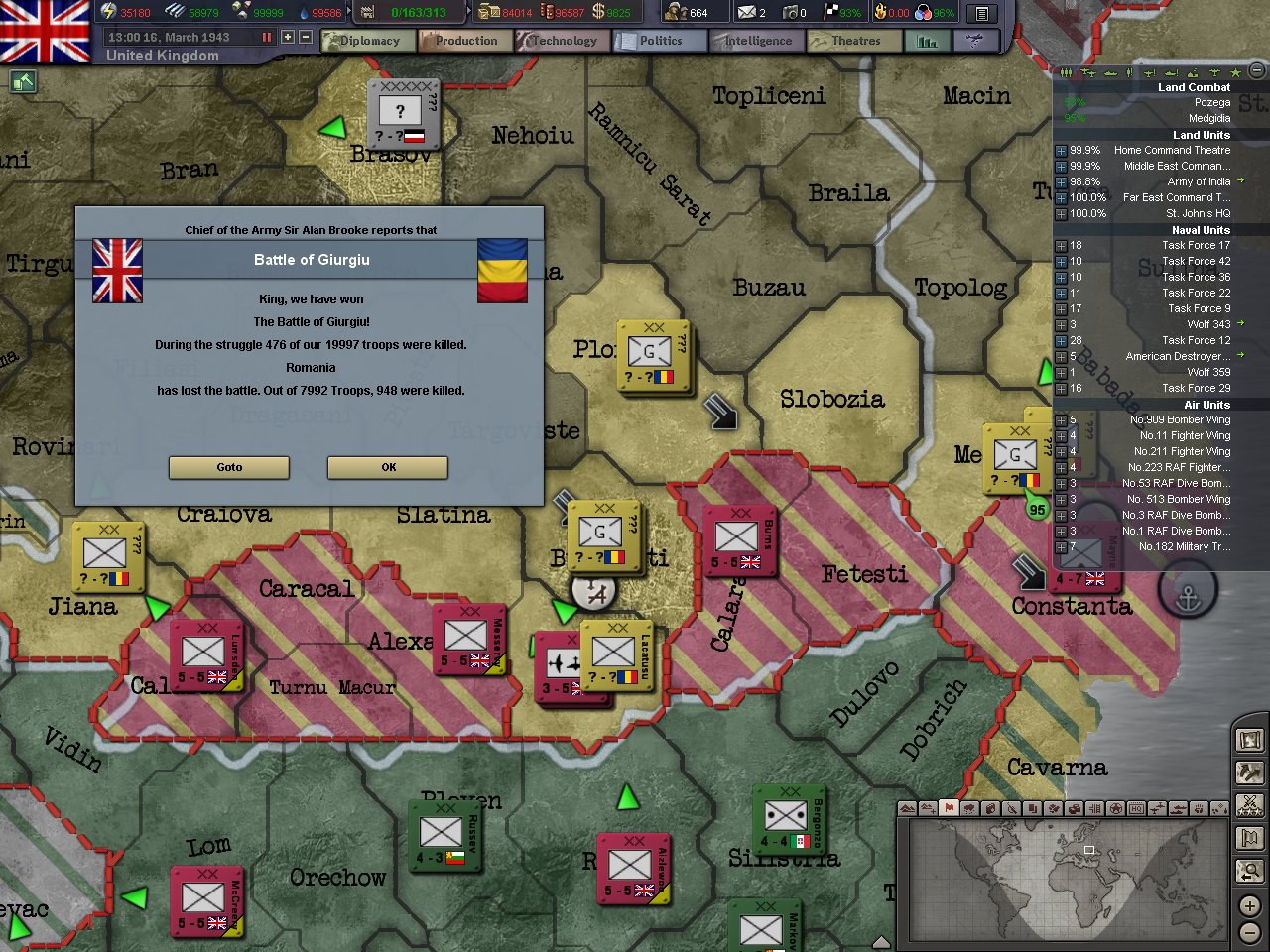
With three of our divisions across the river and soon to be in position. An assault on Bucharest was going to commence soon. But before our troops would go in, the RAF would spend the days before the assault hammering Romania positions around the city.
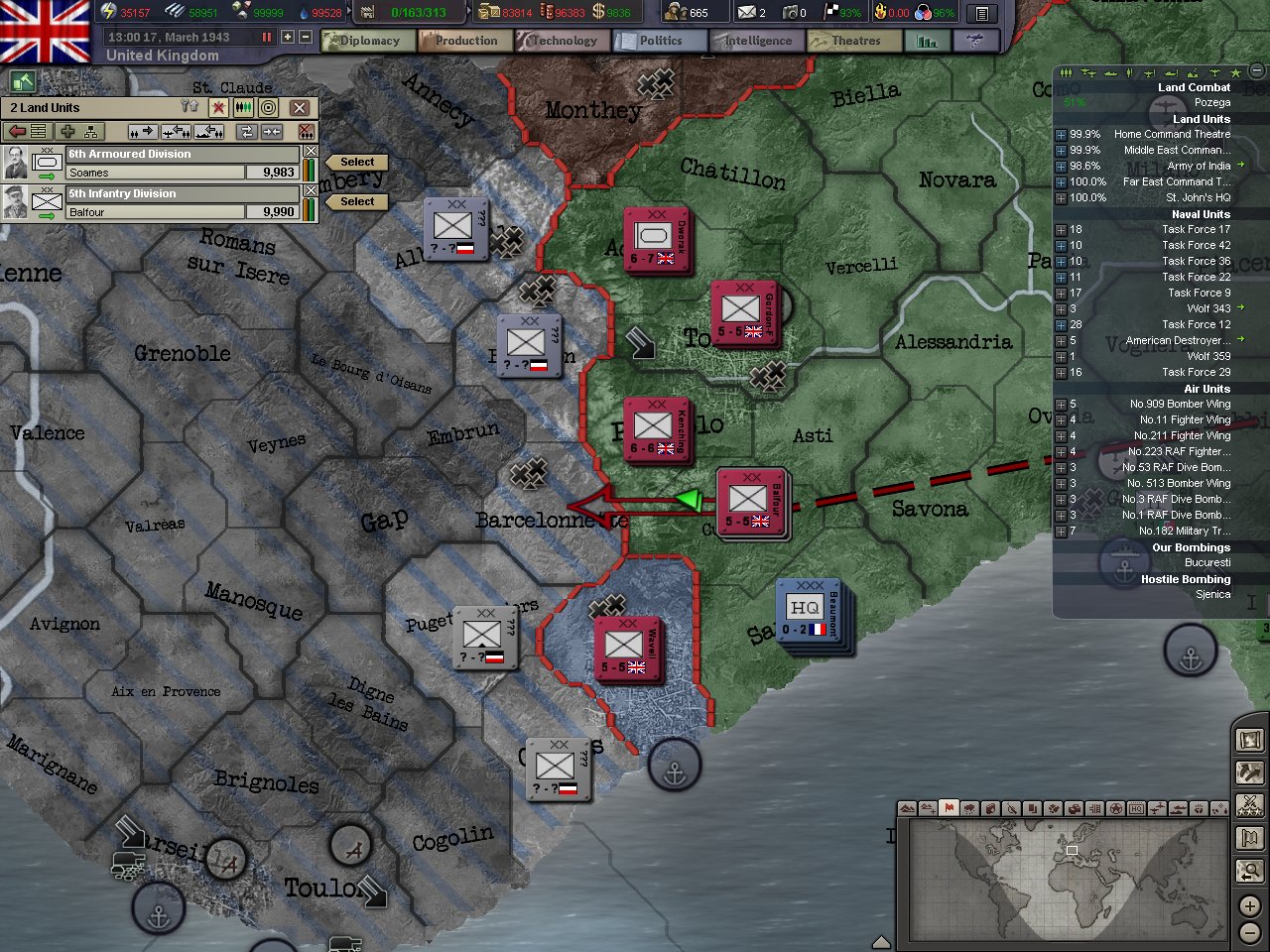
As the fronts our troops were fighting on became wider, German troops became more and more stretched out and isolated. In the French Alps, the 6th Armored and the 5th Infantry advanced into a gap in the German lines to occupy Barcelonne. Once the region was taken, our tanks could punch anywhere and be outflanking the German lines.
In the German Alps, almost a total front advance was ordered. The scattered German, Romania, Slovakian and Croatian forces were to thin and to weak to resist our advance. The fighting would be brutal in the mountains but we were hopeful that our troops could force a way into the heartland of southern Germany.
In the German Alps, almost a total front advance was ordered. The scattered German, Romania, Slovakian and Croatian forces were to thin and to weak to resist our advance. The fighting would be brutal in the mountains but we were hopeful that our troops could force a way into the heartland of southern Germany.
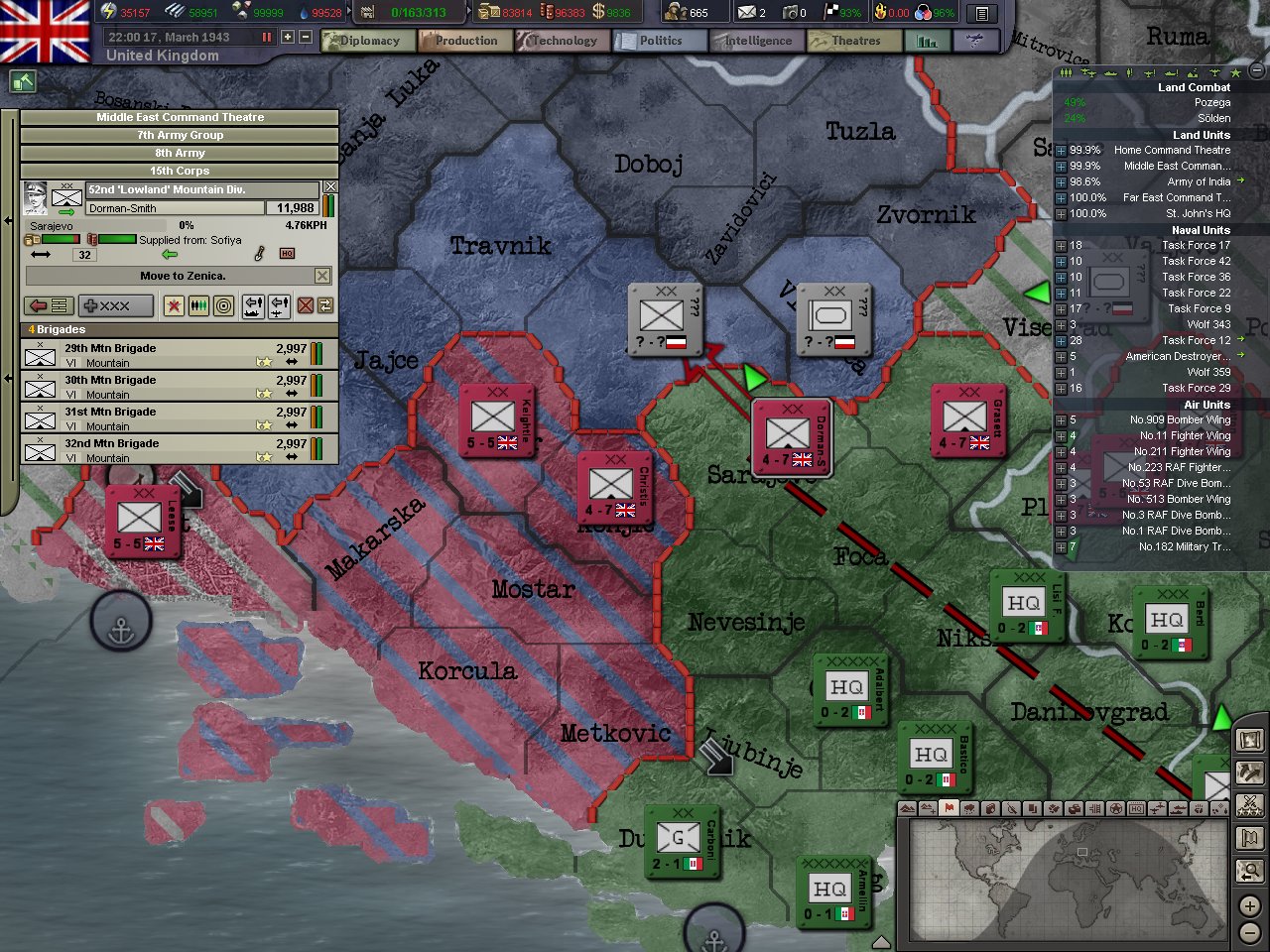
Down in Croatia, the only two points of resistance are a German infantry and Panzer division. The plan was to us the RAF in cooperation with our ground forces and outflank the infantry division then the Panzer division. And either force them back north, or to the east.
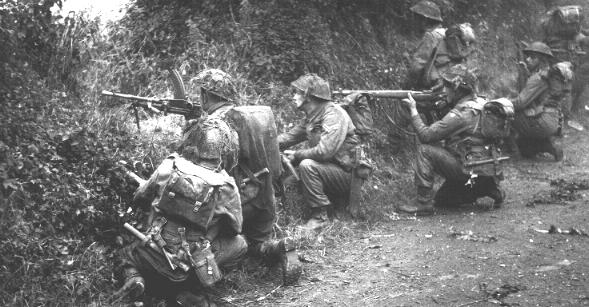
Empire infantry take up firing positions against German forces in Croatia, march '43
A day after the assault began the German infantry were forced to the north-east. The flank of the Panzer division was open for our troops. Hopefully the Panzers would try and hold the line and not retreat in support of their infantry.
Our troops in the Balkans had been fighting nearly non stop February 14th 1941 and were among some of the most battle harden men in the world.
A day after the assault began the German infantry were forced to the north-east. The flank of the Panzer division was open for our troops. Hopefully the Panzers would try and hold the line and not retreat in support of their infantry.
Our troops in the Balkans had been fighting nearly non stop February 14th 1941 and were among some of the most battle harden men in the world.
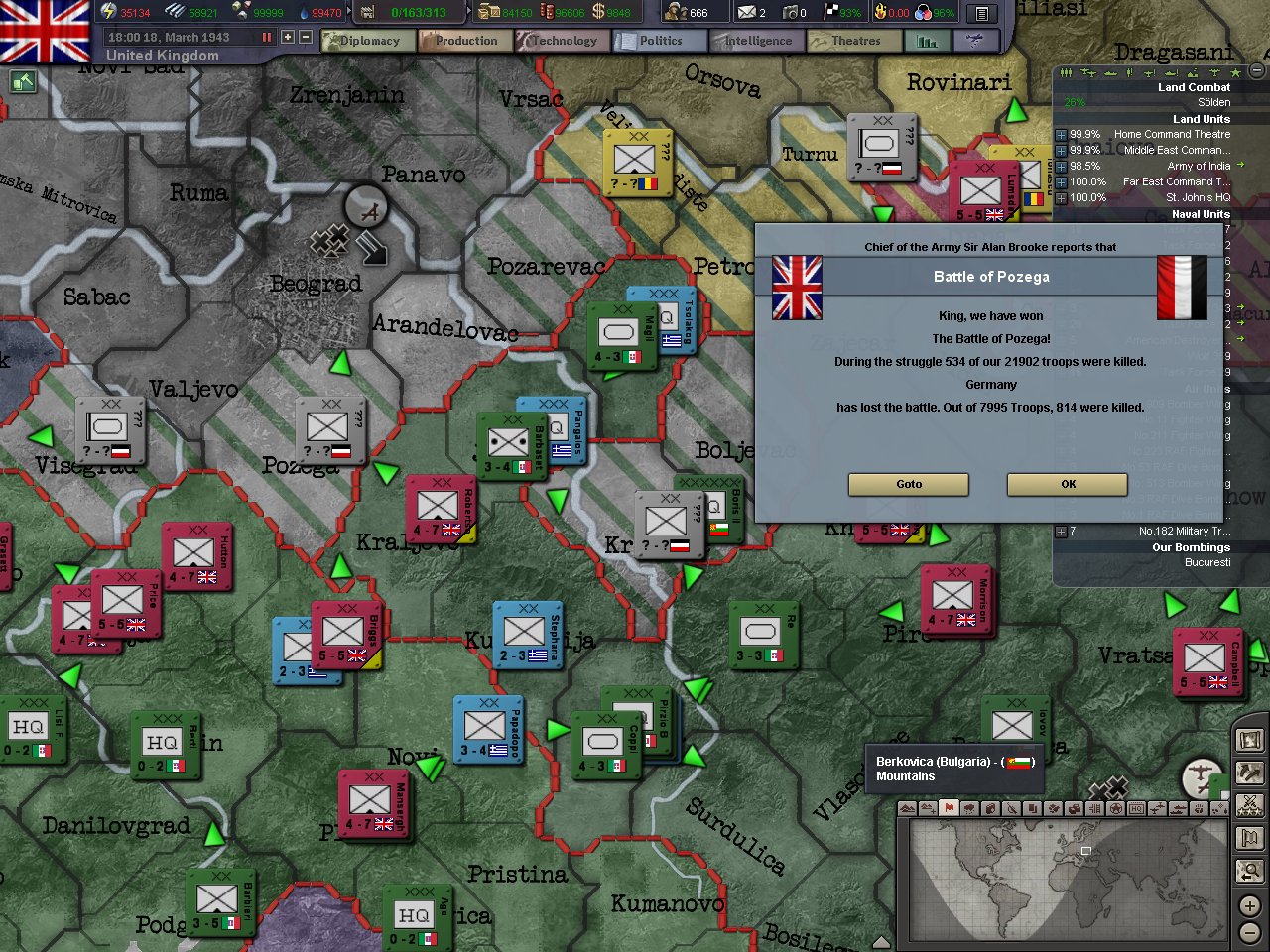
A bloody battle came to an end in the central Balkans. A German division guarding the road to Belgrade was forced back towards the city. Our troops, with support from our allies Greece and Italy were quickly on the enemy heels towards the city.
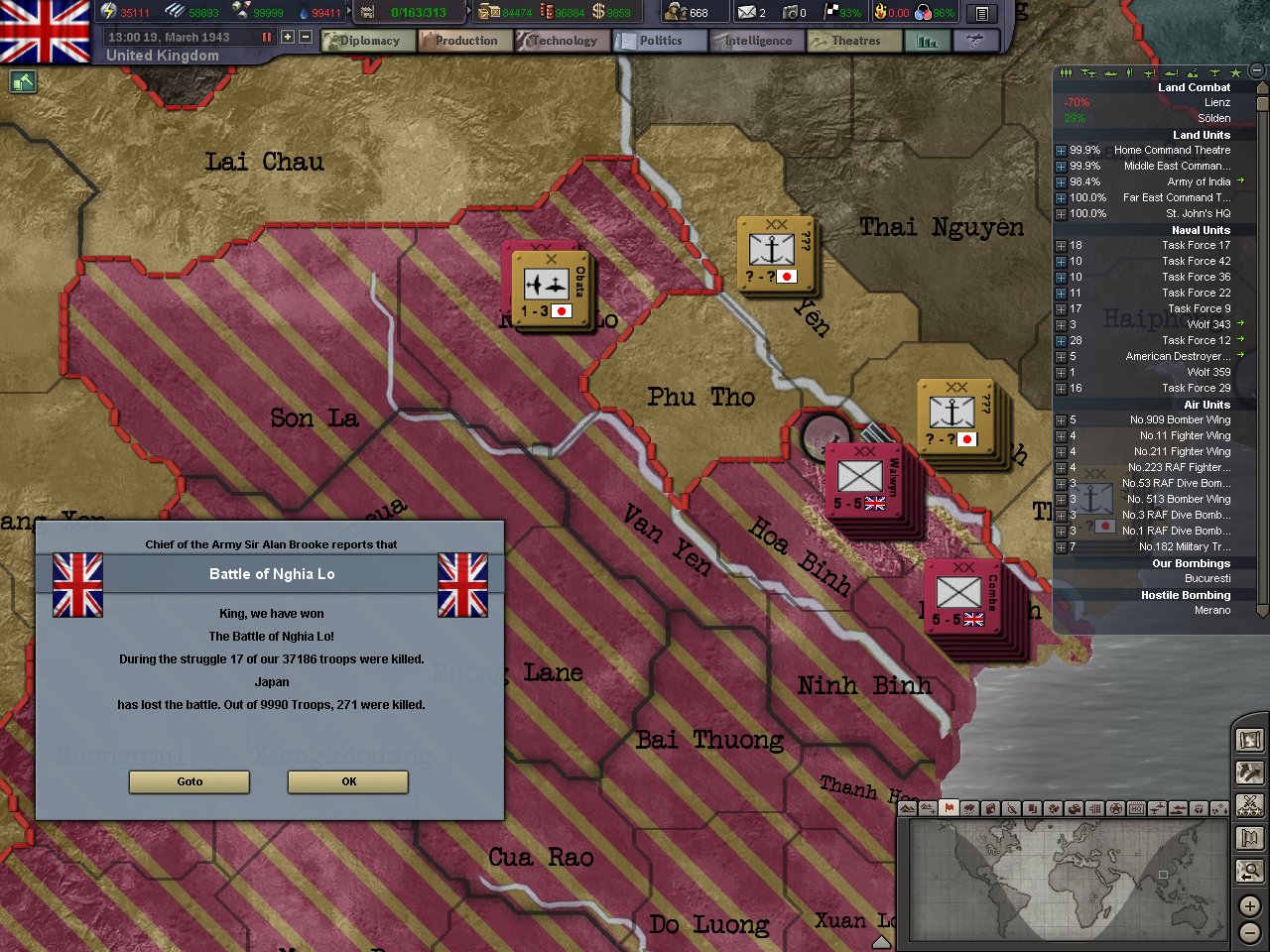
While our troops kept slogging in the Balkans, our troops in Vietnam kept fighting.
A Japanese attack on our positions on the Hanoi river was quickly repulsed with few causalities. The lone Japanese marine division wouldn't keep up the attack for fear of over extending and creating a hole our forces could exploit.
The next night, after another division joined them. The Japanese would launch a second night attack a would meet the same fate, huge losses with no gains to show for it.
A Japanese attack on our positions on the Hanoi river was quickly repulsed with few causalities. The lone Japanese marine division wouldn't keep up the attack for fear of over extending and creating a hole our forces could exploit.
The next night, after another division joined them. The Japanese would launch a second night attack a would meet the same fate, huge losses with no gains to show for it.
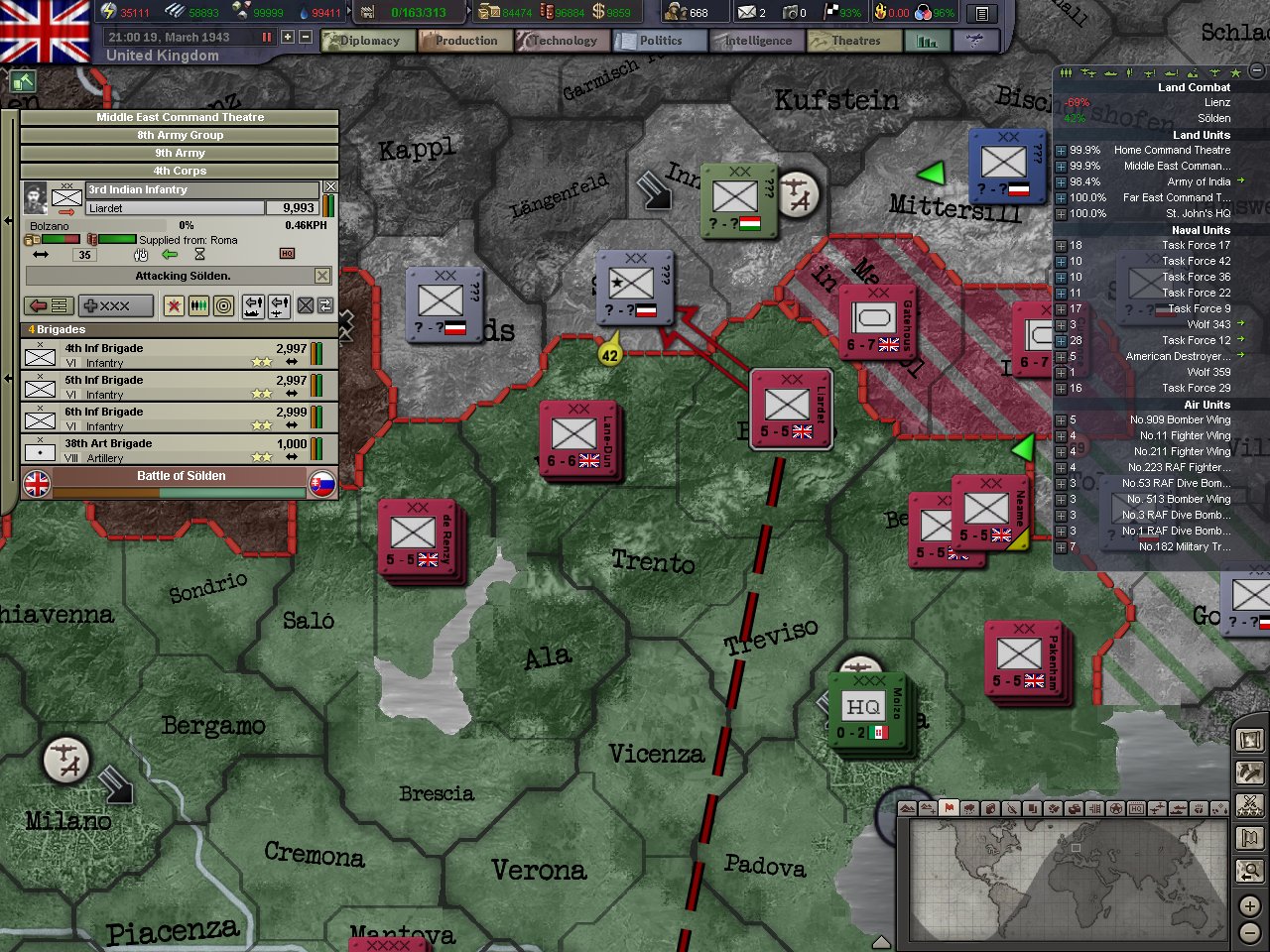
In the German Alps, a Slovakian SS division was dug in deep into the mountains and was proving to be a hell of a nut to crack. RAF fighter bombers were soon called in to help knock the Germans off their of their high castles.
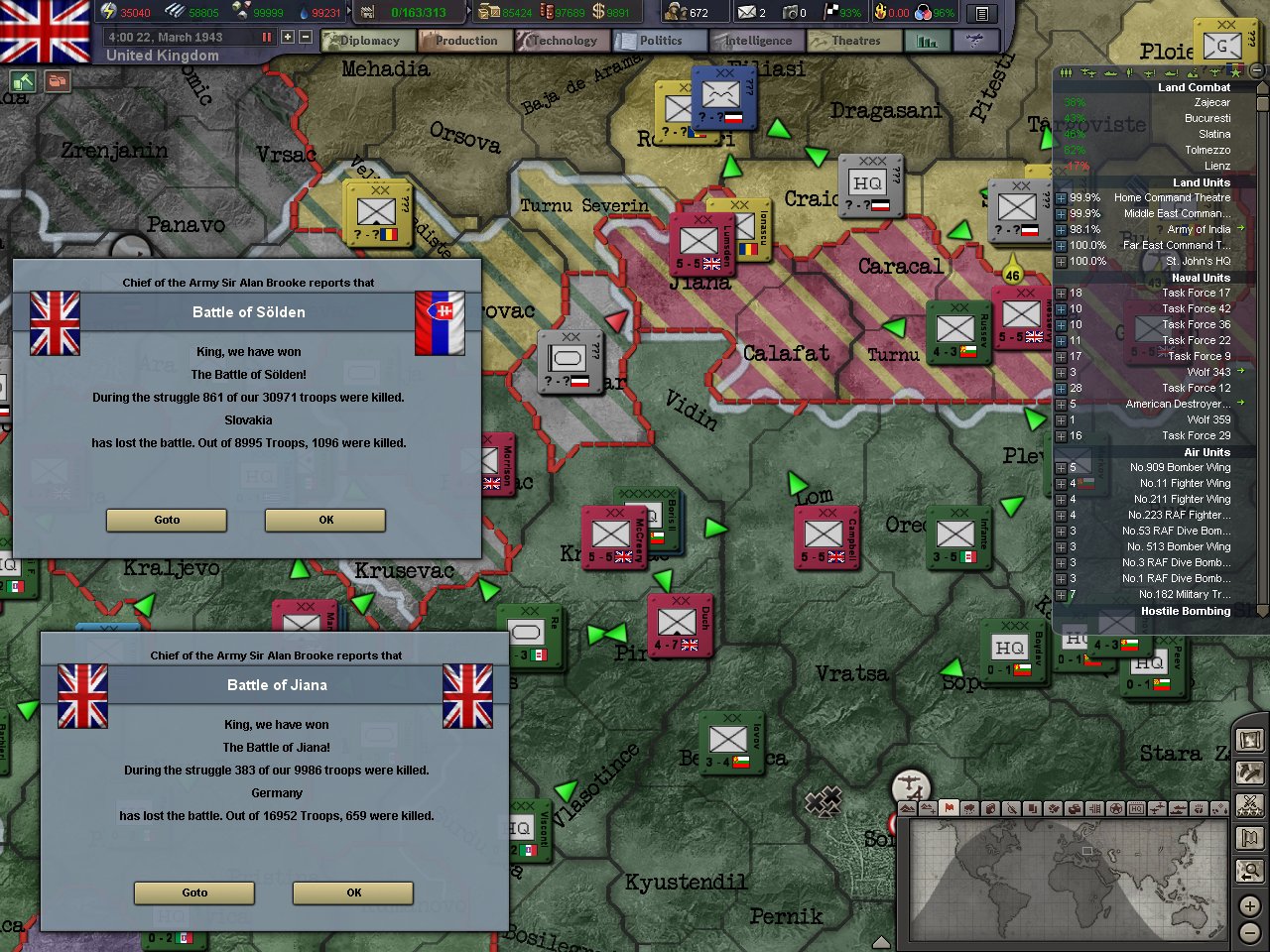
Two bloody battles came to an end near Romania.
A German heavy panzer division was repealed as they attempted to attack our troops from the rear. The Battle of Solden was a bloody affair as German troops kept a Romanian division in the fight. It would take hours of artillery and RAF rockets and bombs before the Germans and their allies would fallback from the attack.
A German heavy panzer division was repealed as they attempted to attack our troops from the rear. The Battle of Solden was a bloody affair as German troops kept a Romanian division in the fight. It would take hours of artillery and RAF rockets and bombs before the Germans and their allies would fallback from the attack.
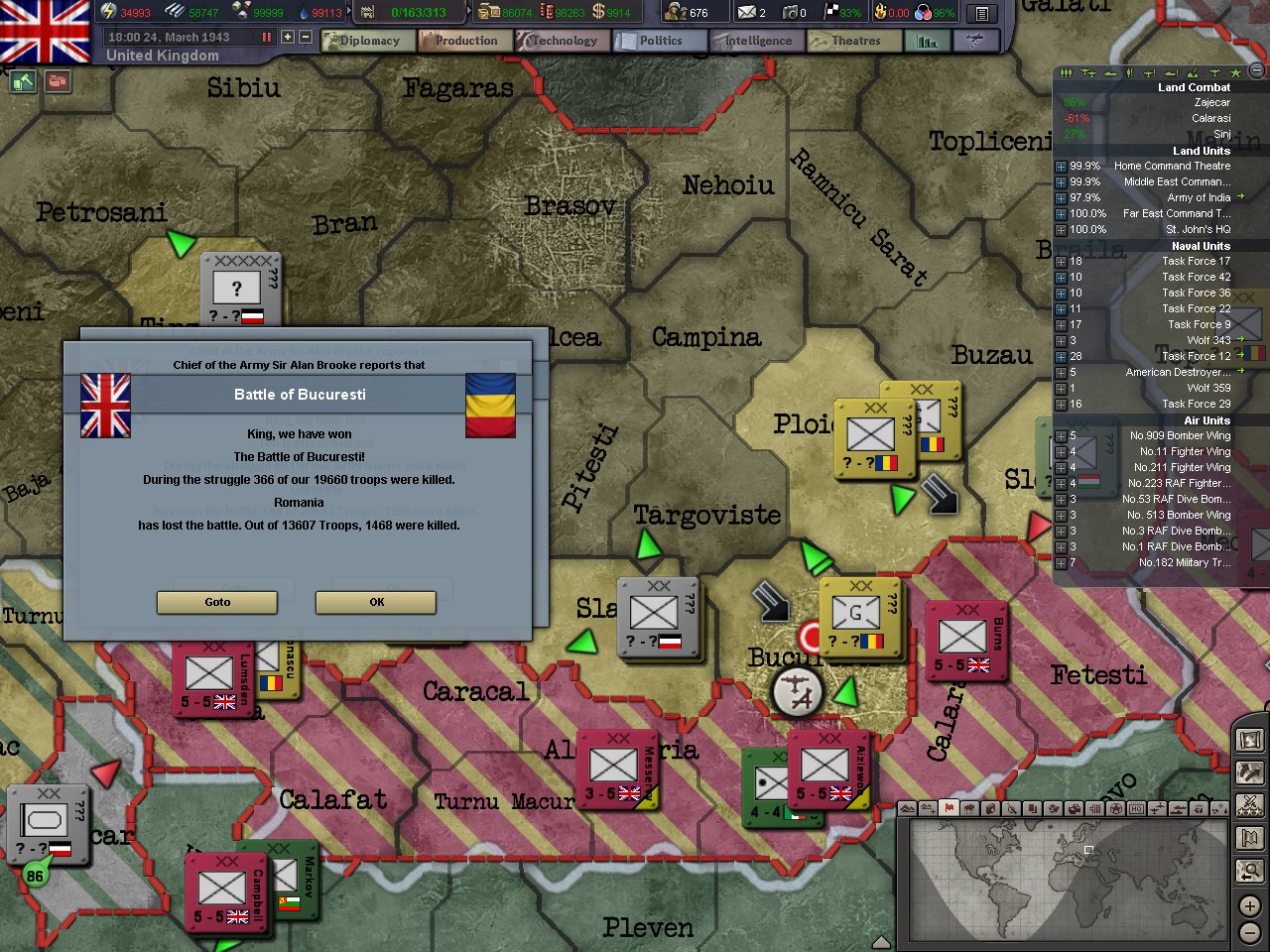
A week after our troops moved into the area around Bucharest, the city fell to our troops after a bloody struggle.
The RAF was quickly proving to be a valuable asset that our military had in it's arsenal to call in. RAF fighter bombers were among some of the best in the European theater.
Back west in Croatia, the exposed German panzer division that our troops were trying to outflank moved back east, leaving the road north open and exposed.
The RAF was quickly proving to be a valuable asset that our military had in it's arsenal to call in. RAF fighter bombers were among some of the best in the European theater.
Back west in Croatia, the exposed German panzer division that our troops were trying to outflank moved back east, leaving the road north open and exposed.
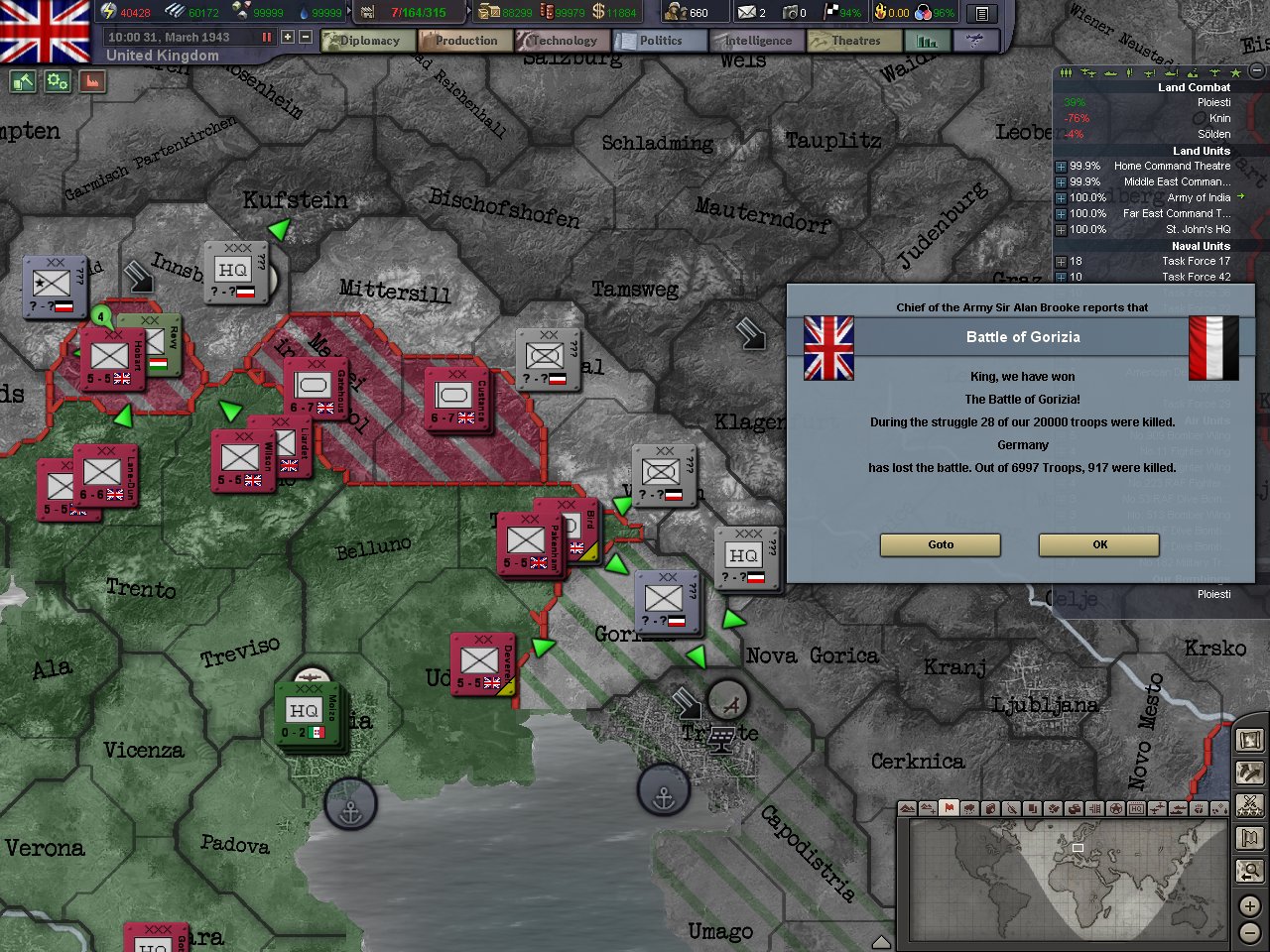
In the Alps our forces were pouring over the Axis lines.
Our troops were simply overwhelming the scattered German lines and advancing wherever our troops could.
On the northern part of the Alps our troops had forced the Slovakian SS division out of their lines and they were attempting to counter attack but were not having any luck with it. The Germans trying to stop our southern advance were meeting the same fate.
Our troops were simply overwhelming the scattered German lines and advancing wherever our troops could.
On the northern part of the Alps our troops had forced the Slovakian SS division out of their lines and they were attempting to counter attack but were not having any luck with it. The Germans trying to stop our southern advance were meeting the same fate.
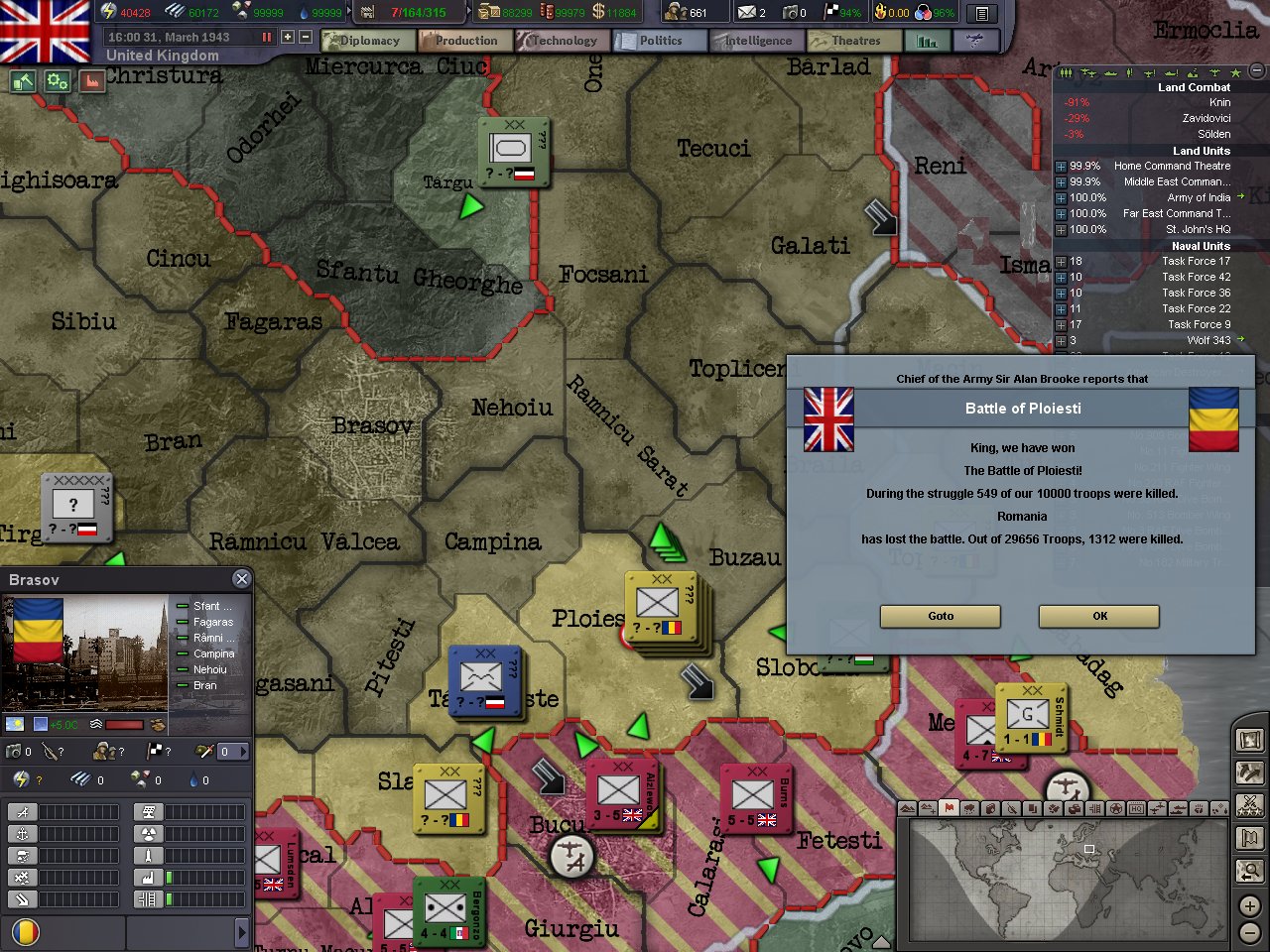
Romanian troops were caught off guard by our forces in a night assault and were forced back.
The attack was so devastating that the Romanian cabinet was captured in the assault as well as many high ranking Romanians. The causalities were also very uneven, with only 500 of our men dead and 1,300 Romanian dead.
The attack was so devastating that the Romanian cabinet was captured in the assault as well as many high ranking Romanians. The causalities were also very uneven, with only 500 of our men dead and 1,300 Romanian dead.
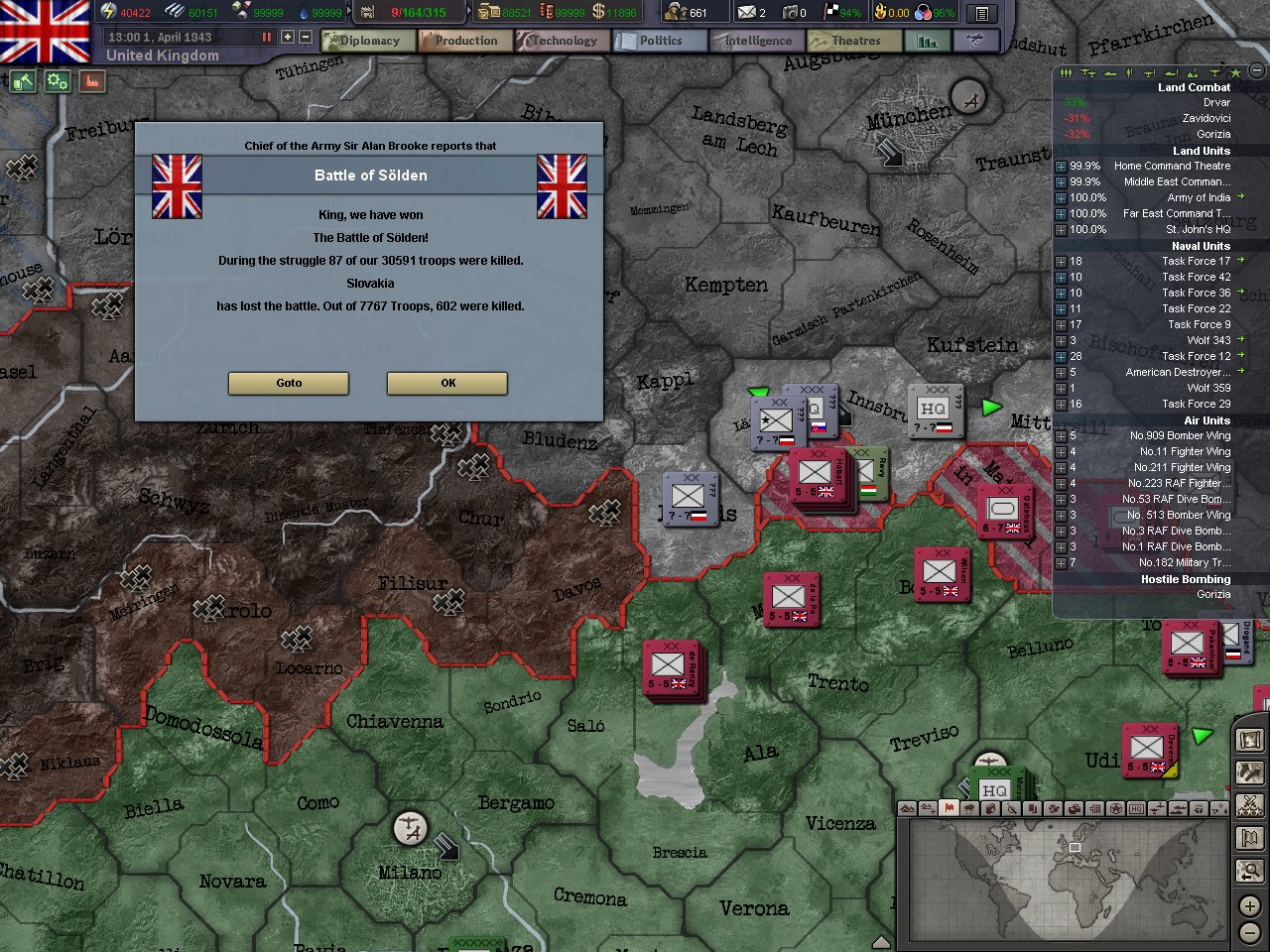
The Slovakian SS division was devastated from their attack. Casualties were very uneven and captured Slovakian soldiers reported that morale among the SS across the line was very low. And with our troops holding the high around in the sector no further Axis attacks would hit us.
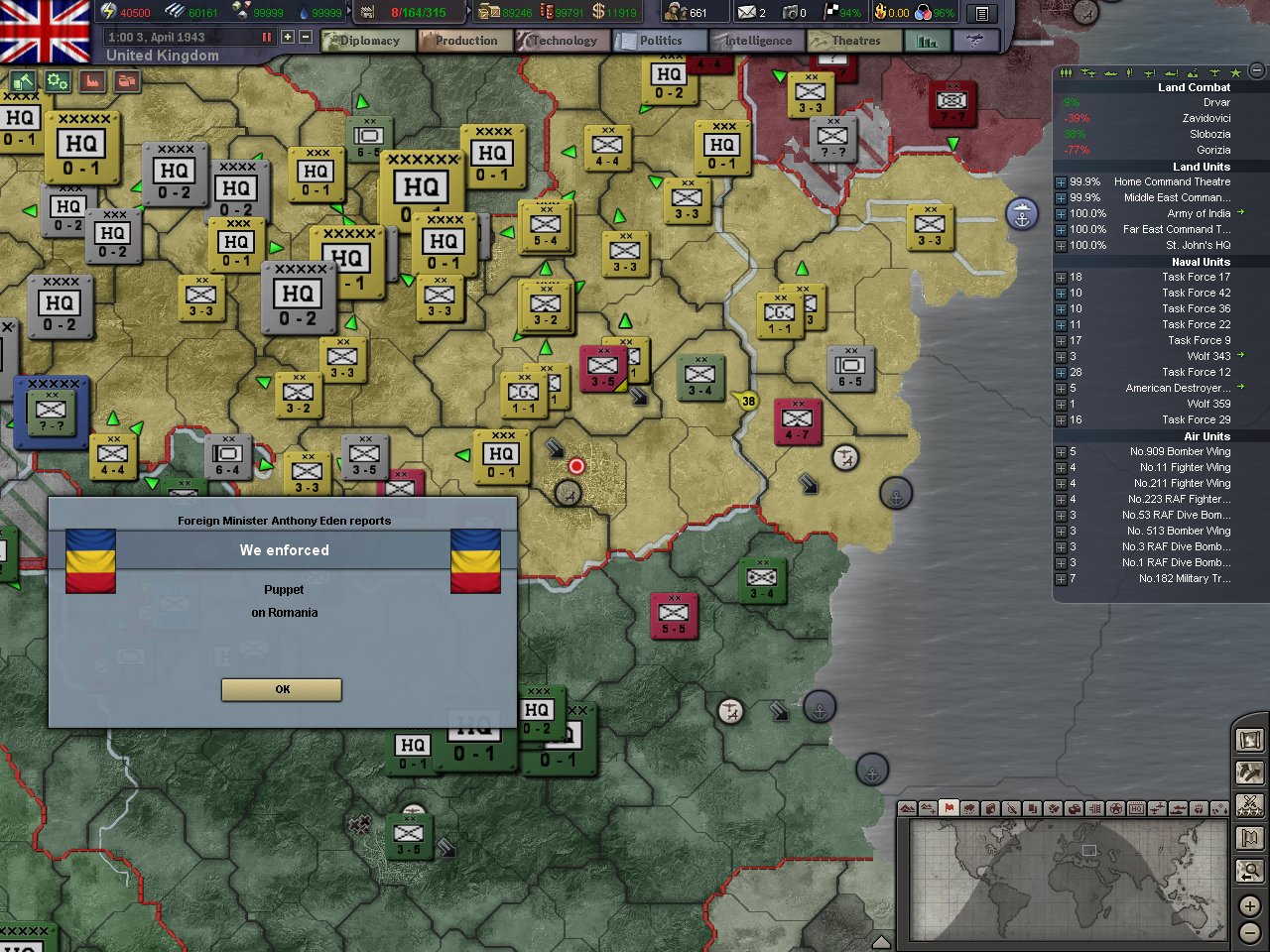
And like a bad April fools joke to the German High Command, Romania surrendered and switched sides. Thousands of Romania troops were now on our side, and thousands of German troops were now trapped behind our lines again.
This also opened up a path into southern Poland, Slovakia and Hungary. As well as stopped the Soviet advance into Romania and the Balkans.
This also opened up a path into southern Poland, Slovakia and Hungary. As well as stopped the Soviet advance into Romania and the Balkans.
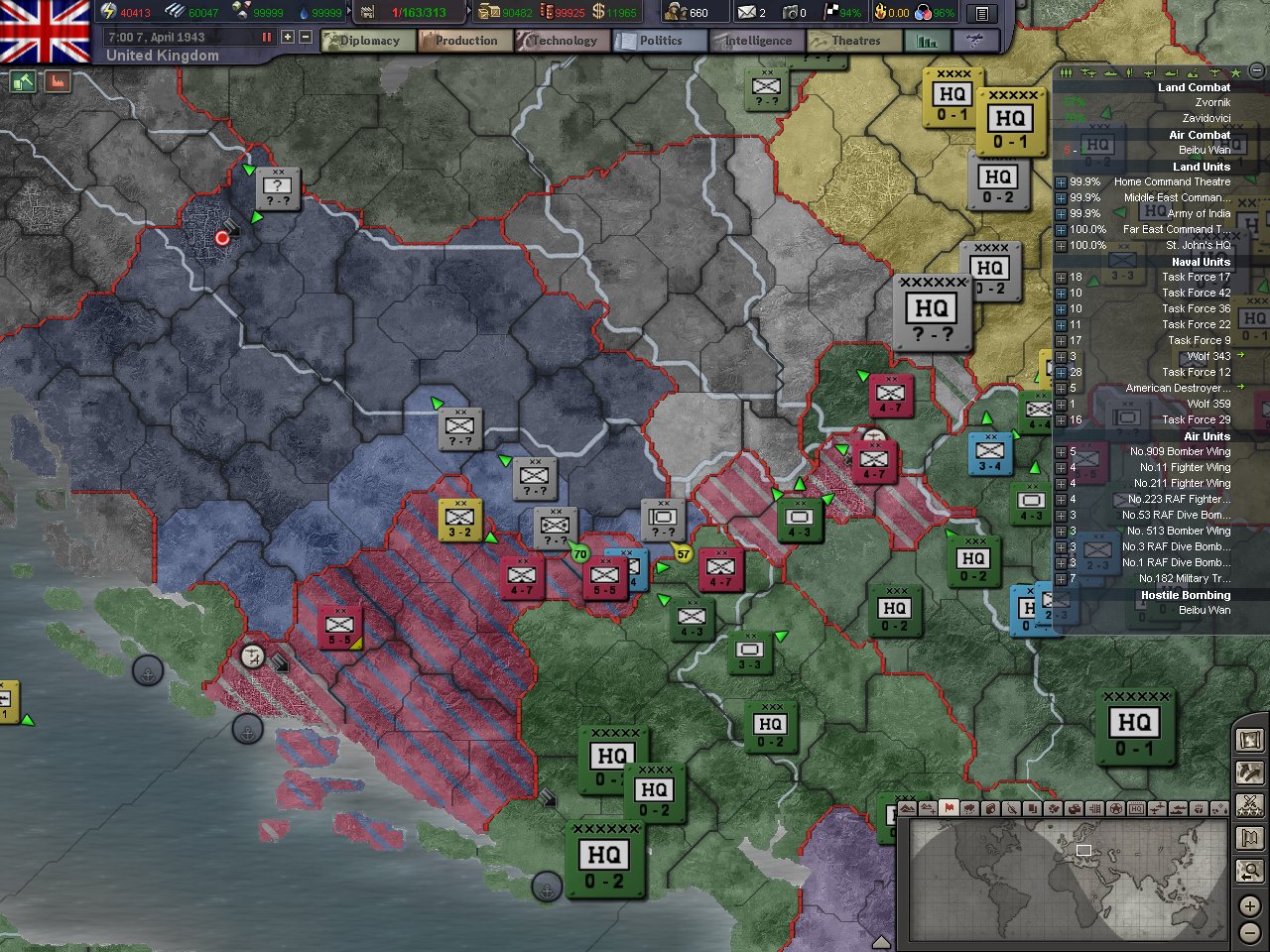
In Croatia our divisions were making some progress.
A German counterattack had bloodied the nose of one of our divisions but reinforcements were brought up to the frontline and steady progress was once again made north.
The main problem our troops were running into as we pushed the Germans back was the amount of rivers that criss crossed the Balkans. They made for excellent defensive lines for the Germans and forced our troops to either make tough frontal assaults or out flank the enemy divisions.
A German counterattack had bloodied the nose of one of our divisions but reinforcements were brought up to the frontline and steady progress was once again made north.
The main problem our troops were running into as we pushed the Germans back was the amount of rivers that criss crossed the Balkans. They made for excellent defensive lines for the Germans and forced our troops to either make tough frontal assaults or out flank the enemy divisions.
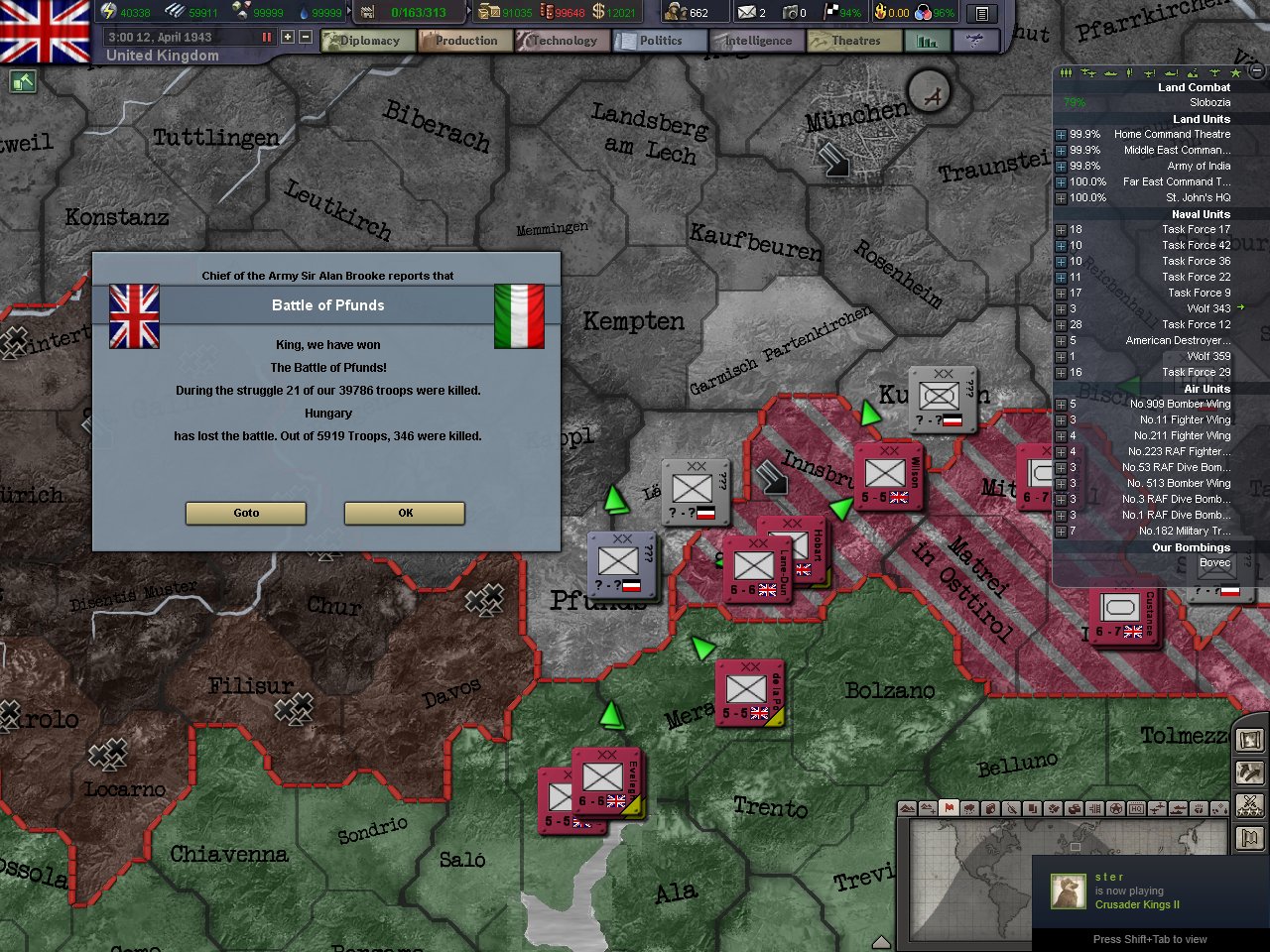
In the Alps,a rookie Slovakian and German division was forced out of the Alps.
Our troops managed to silently make their way through the Slovak lines during the night and appeared on high ground behind the Axis lines. And when morning came an attack was launched on the front of the Axis line and then our troops behind the enemy struck. The resulting attack quickly turned into a rout as the enemy couldn't get out of their trenches fast enough.
Our troops managed to silently make their way through the Slovak lines during the night and appeared on high ground behind the Axis lines. And when morning came an attack was launched on the front of the Axis line and then our troops behind the enemy struck. The resulting attack quickly turned into a rout as the enemy couldn't get out of their trenches fast enough.
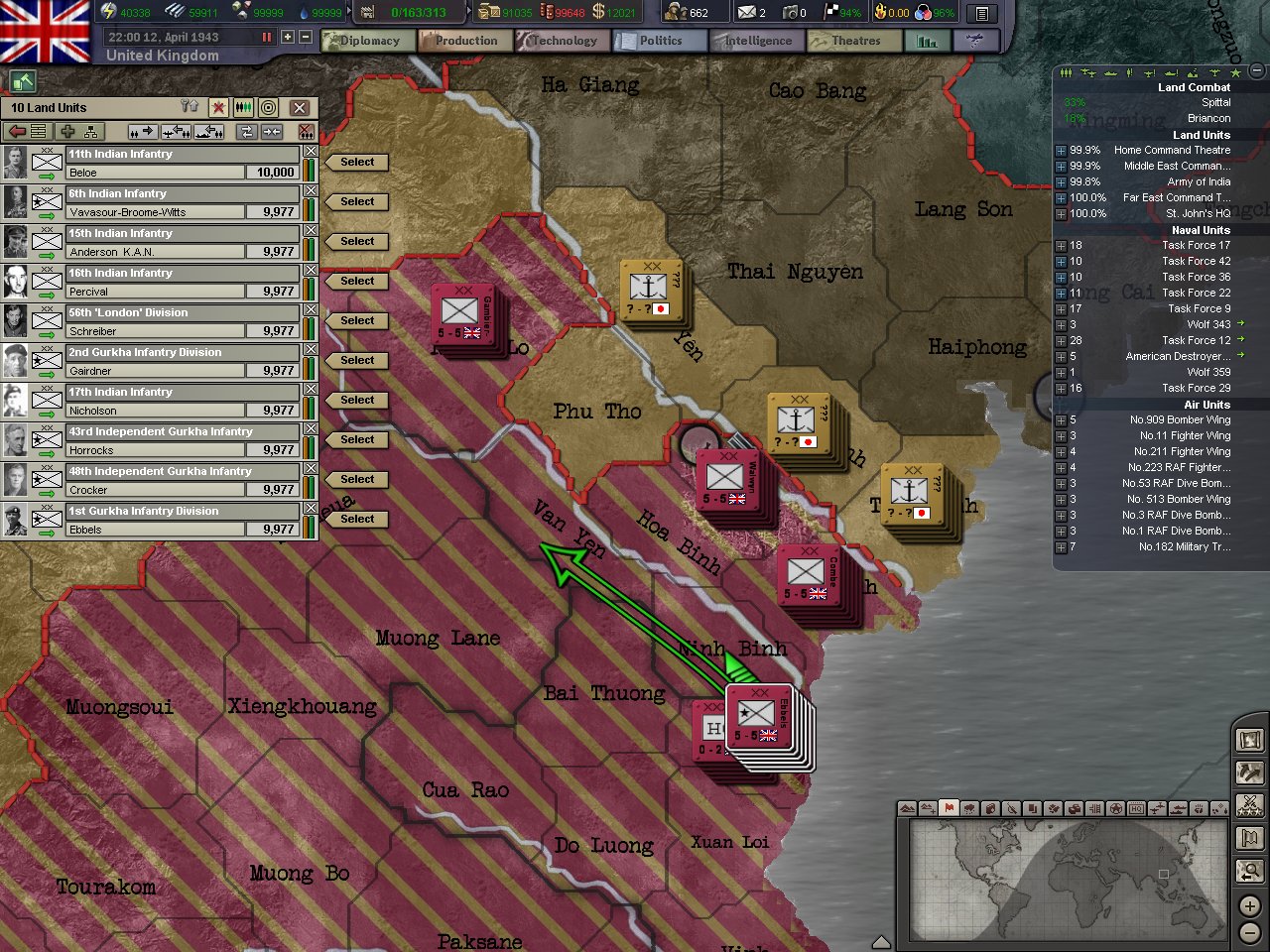
In the Far East, our transport ships had managed to transport all of our divisions that were finished mopping in Siam and South Vietnam up north near Hanoi. This would add ten new fresh divisions to the fight around Hanoi and would hopefully tilt the balance of the fight into our favor.
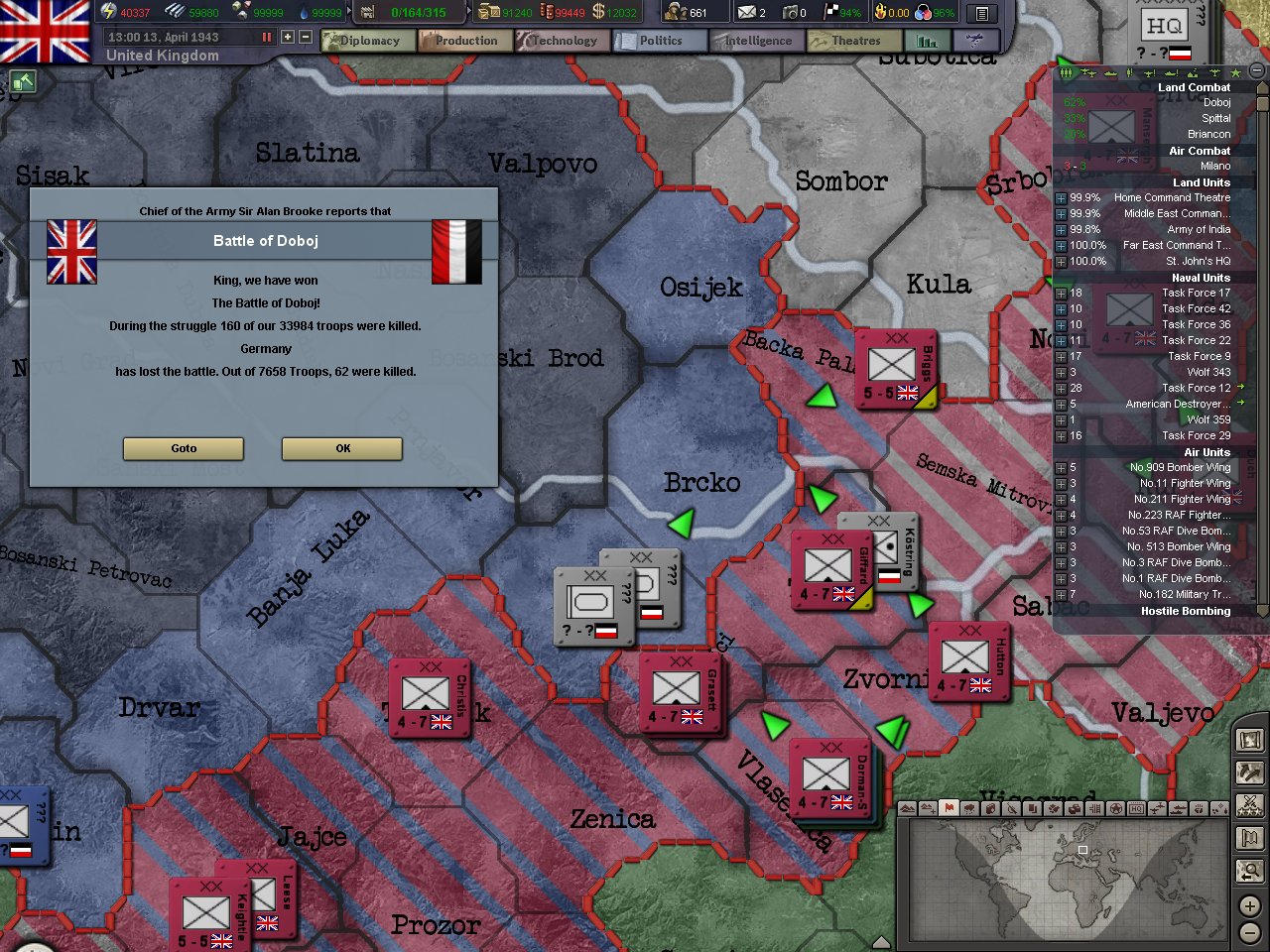
Over the 13th and 14th of April we won several hard fought battles in the Balkans, Romania and the German Alps.
Each step towards Berlin would be paved with blood but no price was to big to pay for liberty and freedom.
Each step towards Berlin would be paved with blood but no price was to big to pay for liberty and freedom.
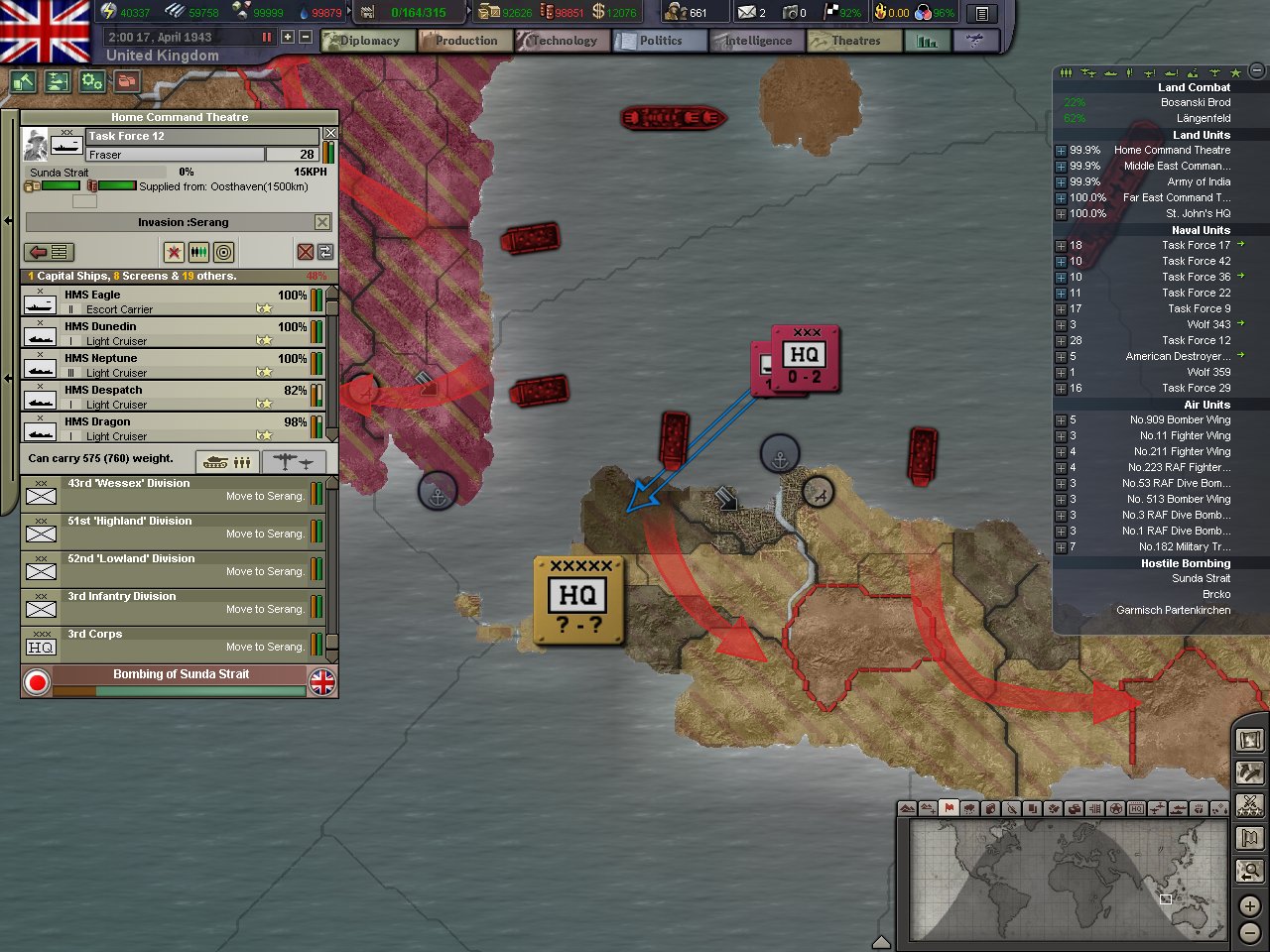
At 2AM local time on April 17th, a corp was landed to complete phase 2 of Operation Midsummer.
The goals for Operation Midsummer was the liberation of the Dutch Indies, securing the vital ports and airfields that the Japanese were using there; and securing the valuable gold and rubber mines also located in the colony.
The goals for Operation Midsummer was the liberation of the Dutch Indies, securing the vital ports and airfields that the Japanese were using there; and securing the valuable gold and rubber mines also located in the colony.
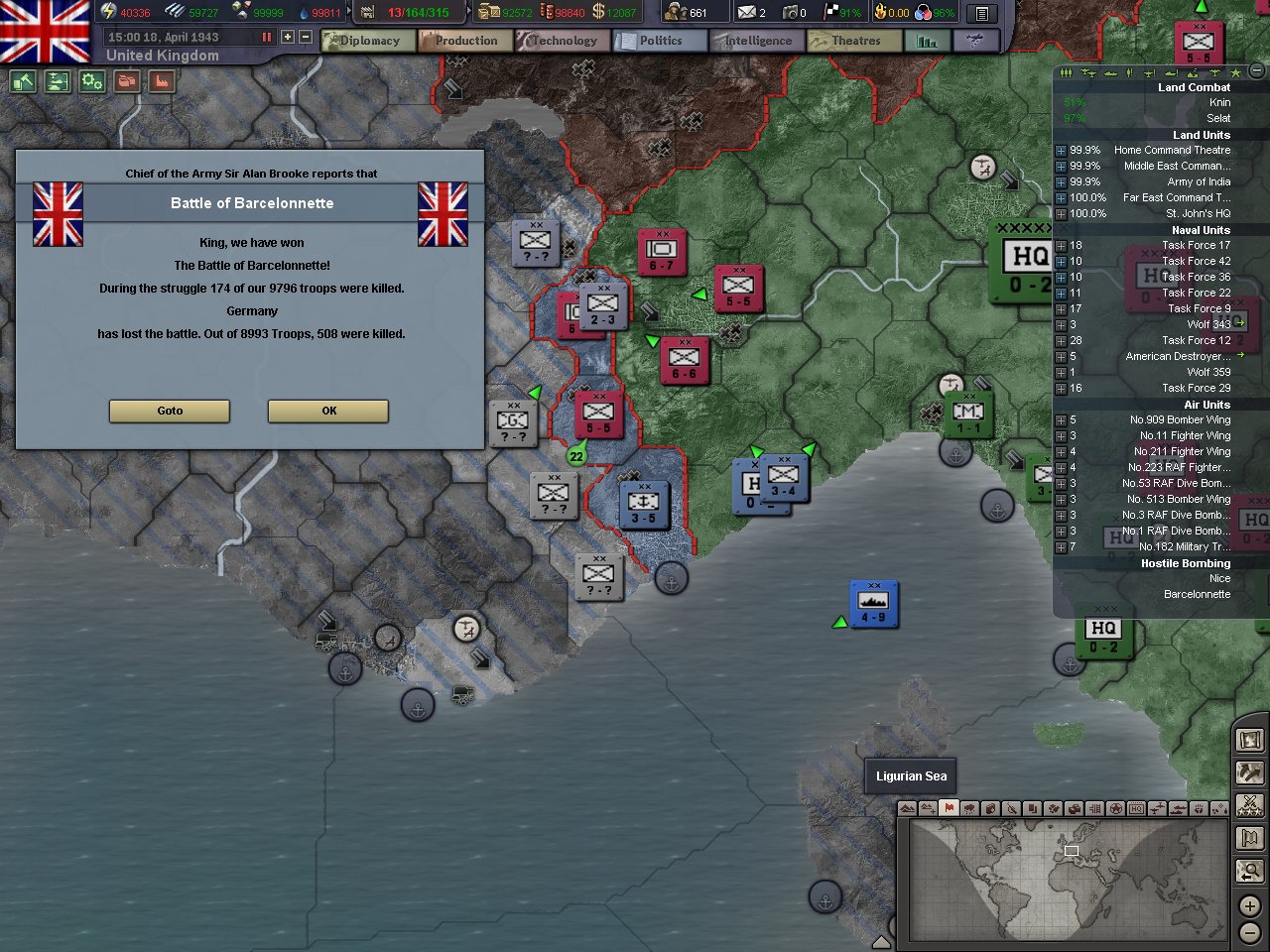
In the French Alps, the Germans had restructured their lines and launched a counterattack with Luftwaffe support.
Stukas would try and blast holes in the old French fortifications that our troops had occupied.
As our troops in England prepared to launch a major amphibious operation. Orders were sent out to all of our forces to launch attacks or draw enemy forces away from possible landing sites in western Europe.
Stukas would try and blast holes in the old French fortifications that our troops had occupied.
As our troops in England prepared to launch a major amphibious operation. Orders were sent out to all of our forces to launch attacks or draw enemy forces away from possible landing sites in western Europe.
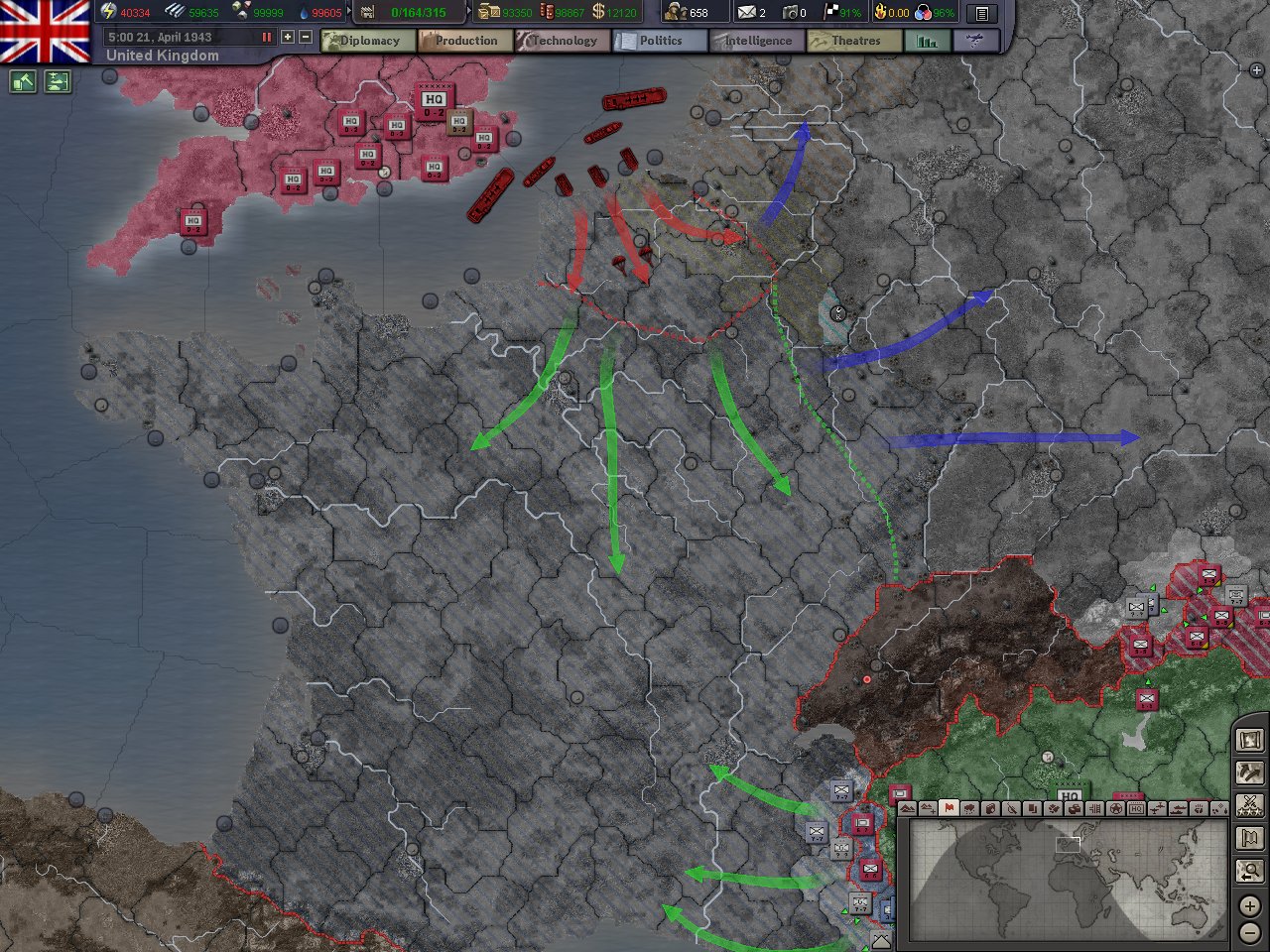
As combat in the Balkans and the Alps began to pick up. The planning of Operation Juno was finished.
The plan called for landings by three Commando Corps on the northern French coasts around Calais. The immediate objectives of the Commandos is securing the ports of Calais and Dunkirk and two minor ports. Paratroopers will then land securing the only paths between the Somme and another river to the north. The Commandos and Paras will then secure a beachhead, known as the Red Line.
Then once heavier equipment and more forces were to be transported onto mainland Europe and a breakout would be launched. The main effort is to be launched towards the Rhine River to secure the Green Line. As the breakout from the Red Line was launched our troops in the Alps would attack securing southern France.
The third phase would see the invasion of Germany, the liberation of Belgium and the Netherlands. An offensive from the Balkans and German Alps would also be launched in support of the breakout from the Rhine.
The operation was ambitious, but hopefully a strong force of Axis forces in France could be trapped in France and not breakout or retreat into Germany.
The plan called for landings by three Commando Corps on the northern French coasts around Calais. The immediate objectives of the Commandos is securing the ports of Calais and Dunkirk and two minor ports. Paratroopers will then land securing the only paths between the Somme and another river to the north. The Commandos and Paras will then secure a beachhead, known as the Red Line.
Then once heavier equipment and more forces were to be transported onto mainland Europe and a breakout would be launched. The main effort is to be launched towards the Rhine River to secure the Green Line. As the breakout from the Red Line was launched our troops in the Alps would attack securing southern France.
The third phase would see the invasion of Germany, the liberation of Belgium and the Netherlands. An offensive from the Balkans and German Alps would also be launched in support of the breakout from the Rhine.
The operation was ambitious, but hopefully a strong force of Axis forces in France could be trapped in France and not breakout or retreat into Germany.
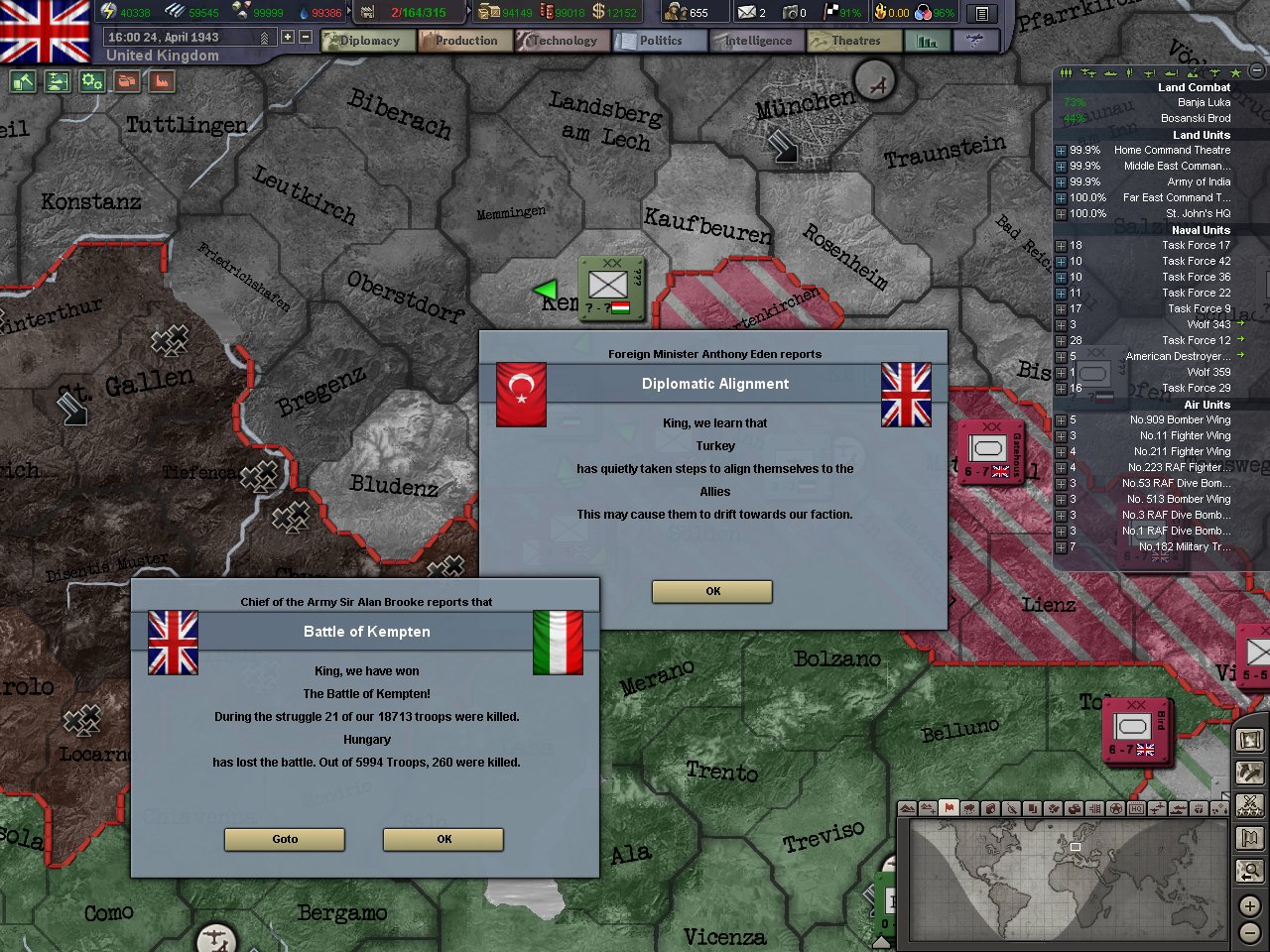
As planning for the great crusade kept moving forward, international news struck.
The Soviet Union had begun making diplomatic moves towards Turkey most likely to secure passage through the Bashporous Straits or to try and get Turkey to move over and become Communist.
Troops in the Balkans and our mounted corp in Syria were put on alert for a potential assault from the Soviets into Turkey.
It was beginning to seem that as the end came into site everyone began eyeing up were they would like to have the lines drawn.
The Soviet Union had begun making diplomatic moves towards Turkey most likely to secure passage through the Bashporous Straits or to try and get Turkey to move over and become Communist.
Troops in the Balkans and our mounted corp in Syria were put on alert for a potential assault from the Soviets into Turkey.
It was beginning to seem that as the end came into site everyone began eyeing up were they would like to have the lines drawn.
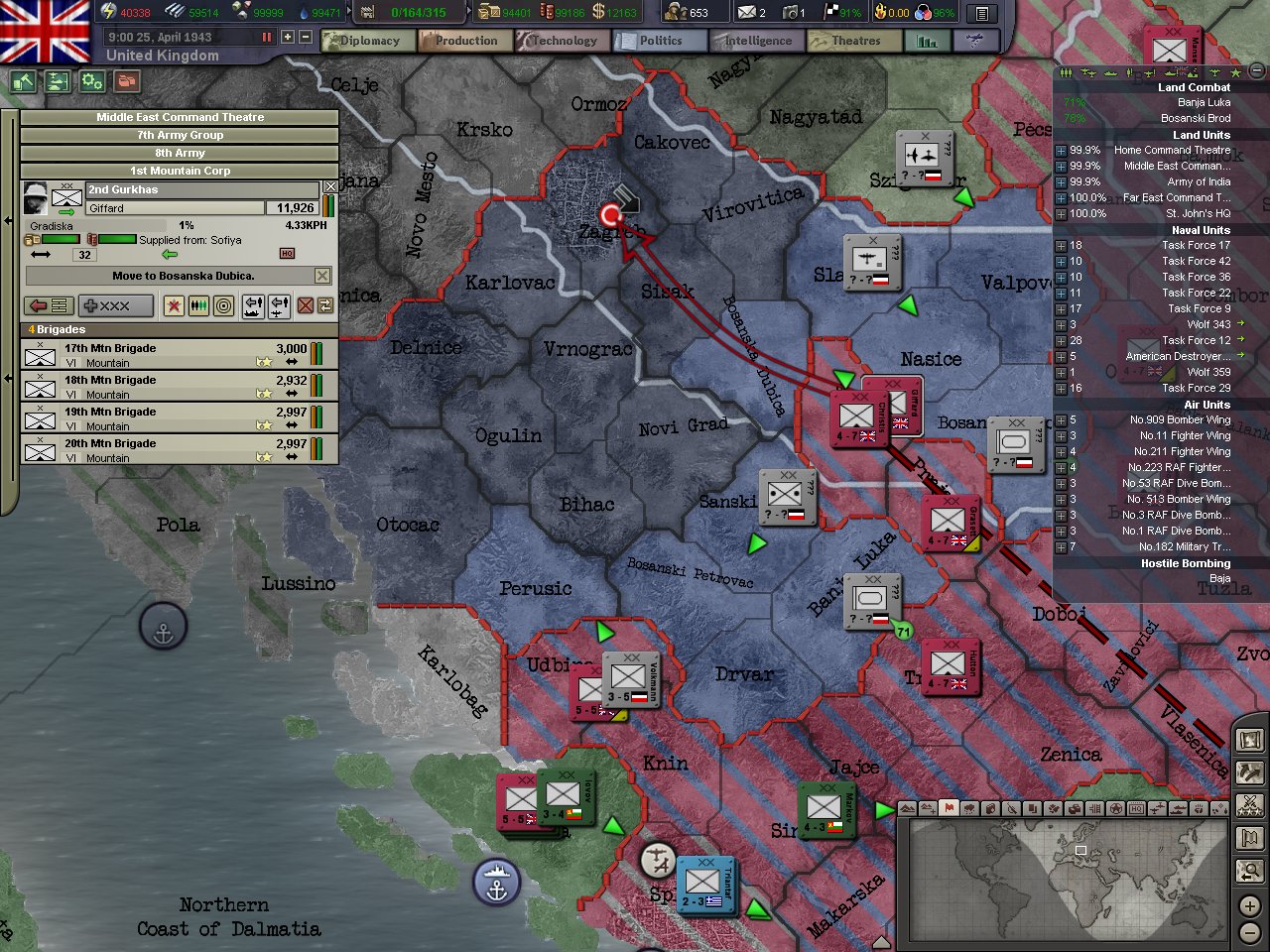
Far away from Parliament and it's politicians, our troops spotted an opening.
In an operation that was quickly devised and launched, a lighting strike was to be launched to secure the Croatian capital and knock them out of the war. The path seems clear for the Gurkhas to move north along the east side of the river and take the capital out from under the nose of the Germans.
In an operation that was quickly devised and launched, a lighting strike was to be launched to secure the Croatian capital and knock them out of the war. The path seems clear for the Gurkhas to move north along the east side of the river and take the capital out from under the nose of the Germans.
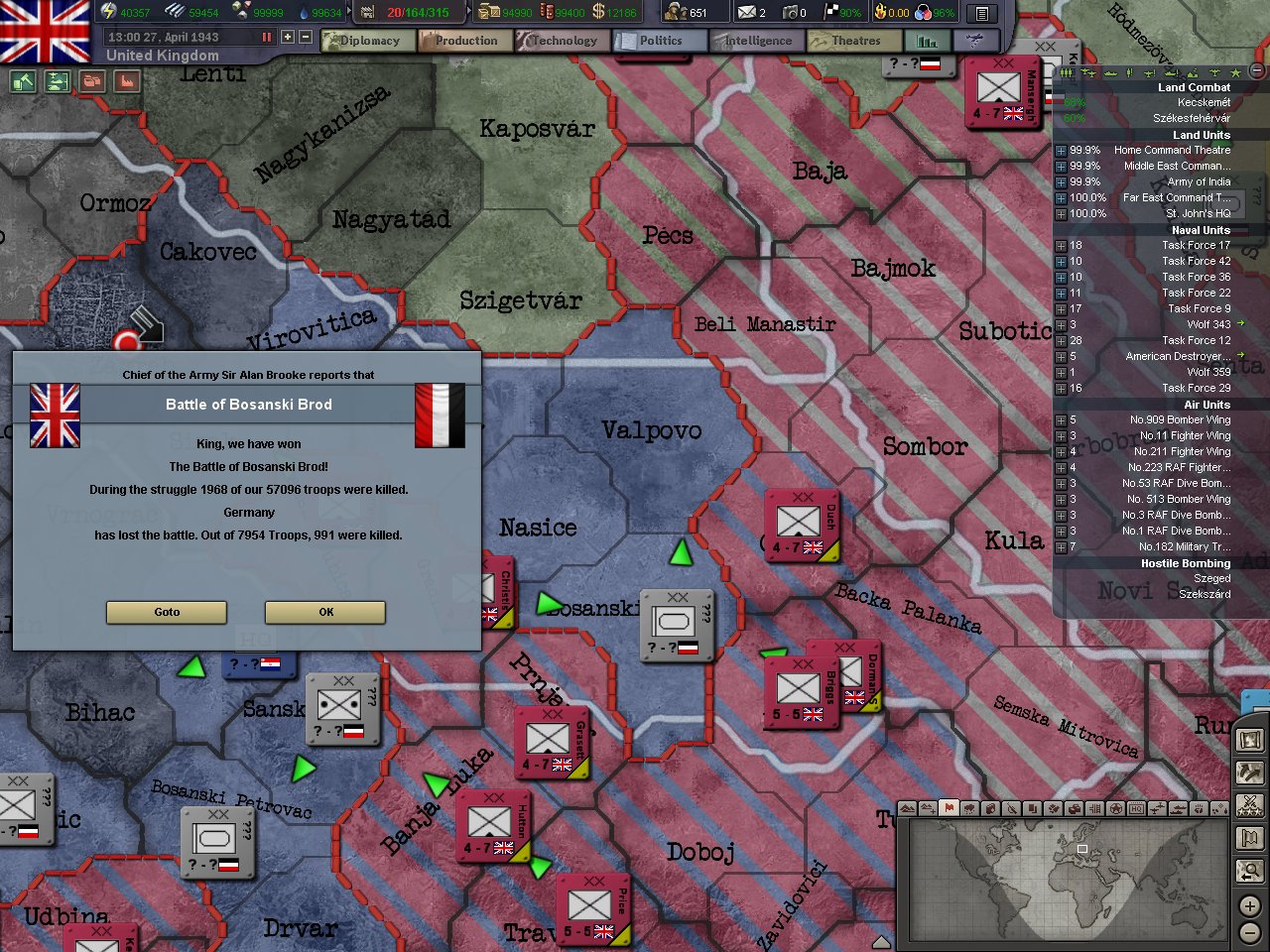
In support of the Gurkha assault on Zagreb, our troops launched an attack on a well dug in panzer division. Clearing the flank of the Gurkhas costed nearly 2,000 men, but would hopefully help in the advance.
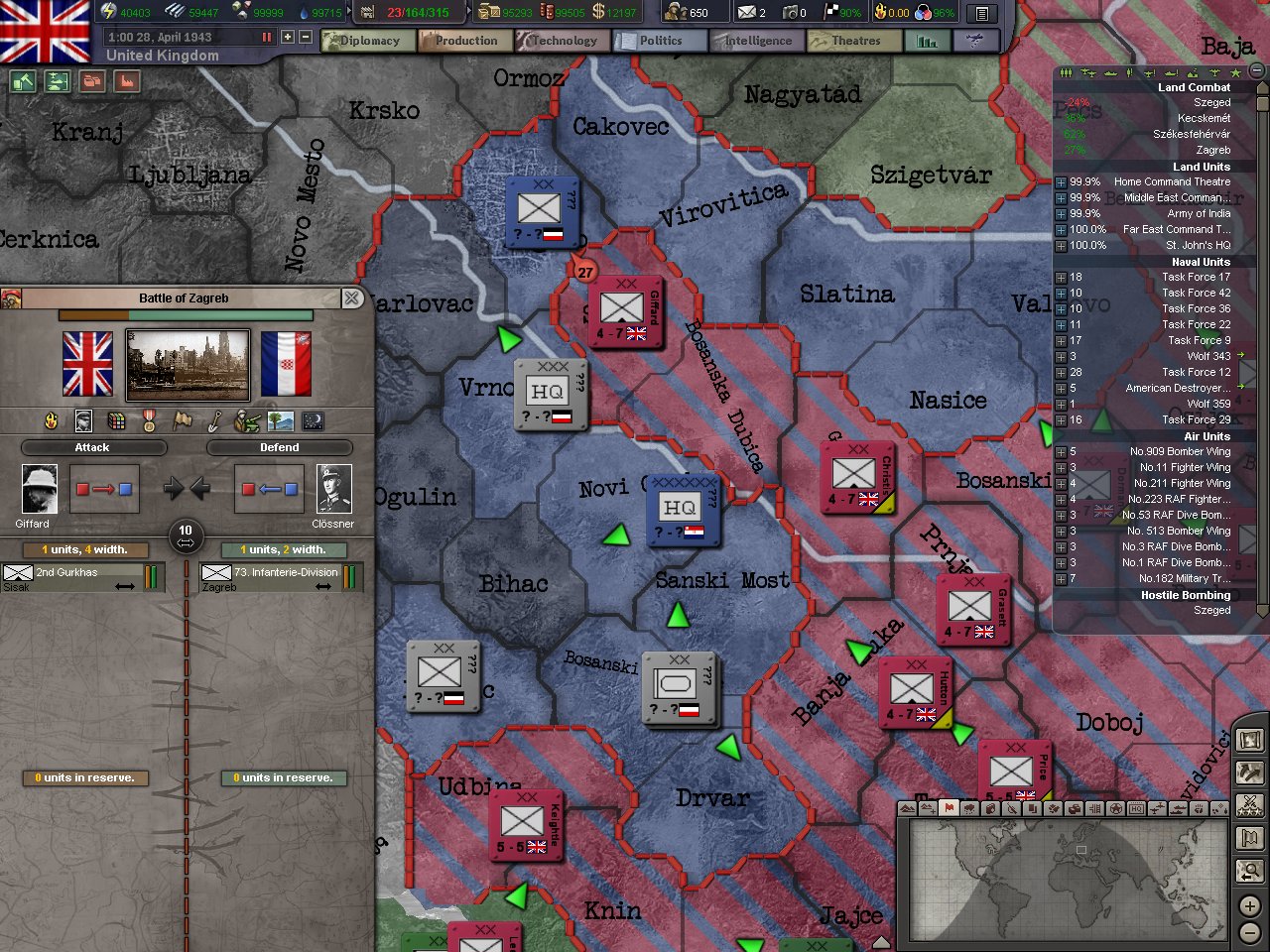
As the Gurkhas reached the outskirts of Zagreb, patrols were met with serious resistance from the city. The assault was called off and the RAF was called in as well as reinforcements to hopefully take the city from the flanks and stretched the Axis defenders.
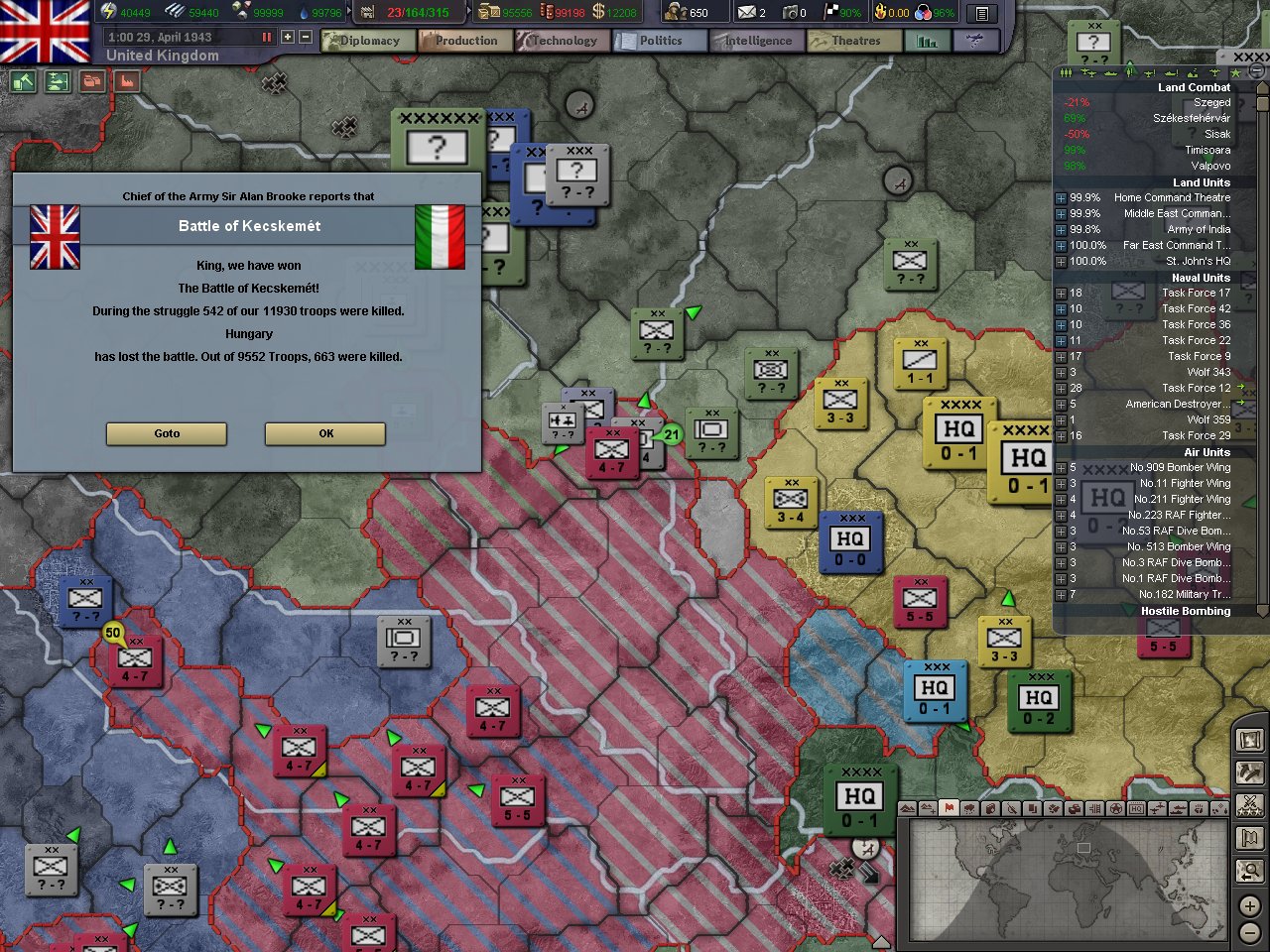
To the east away from the city,advance units of a mountain division entered Slovakia and came into contact with Slovakian and German divisions. The Slovaks were waging a brutal war as our troops entered their homeland. Ambushes were frequent and firefights were deadly and close.
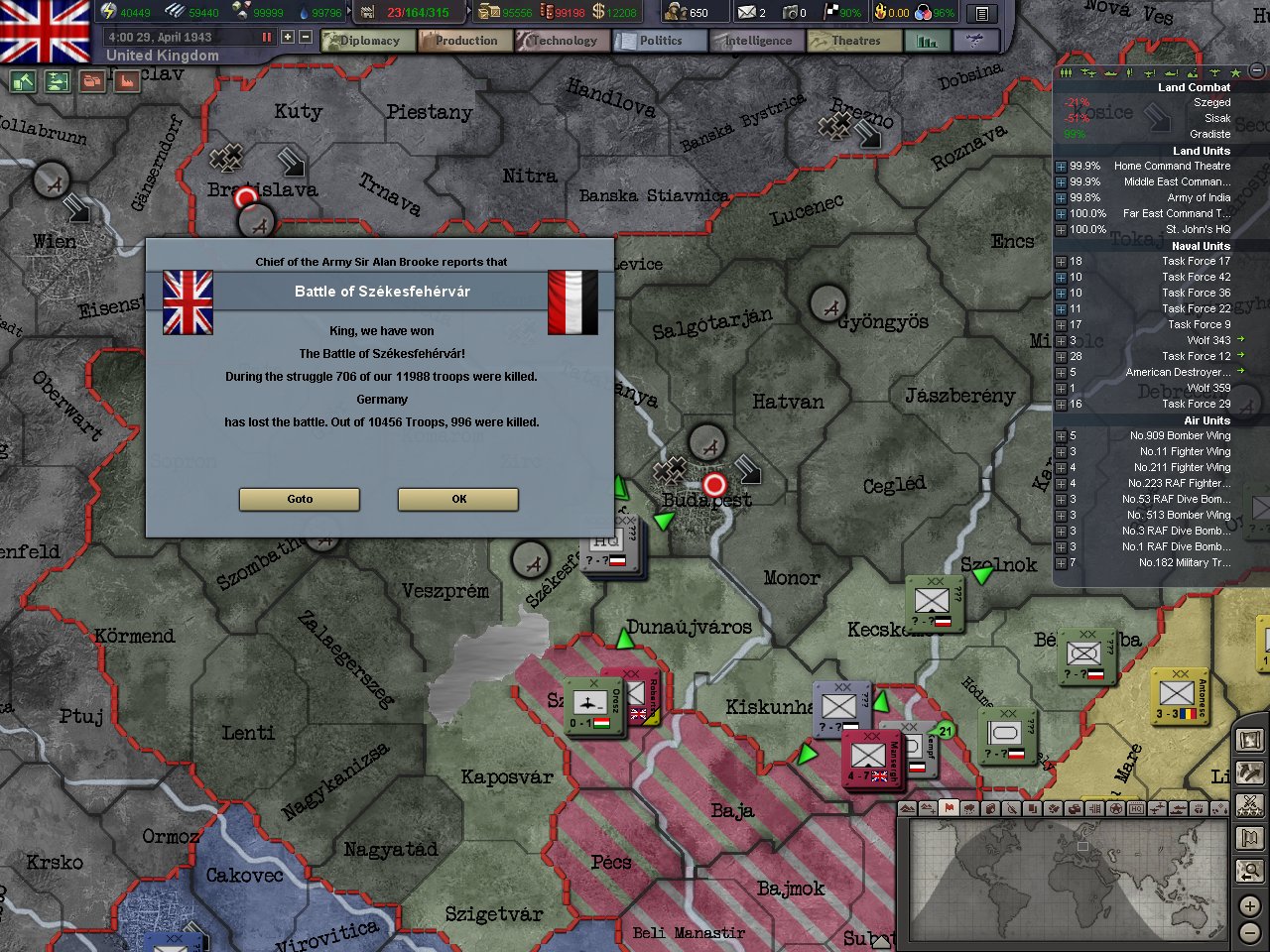
As the fighting become more brutal as our forces advanced, one of our divisions fought a brutal battle opening the path to Budapest. The plan was now to get our divisions on the eastern side of the river up and assault the city from the west and east.
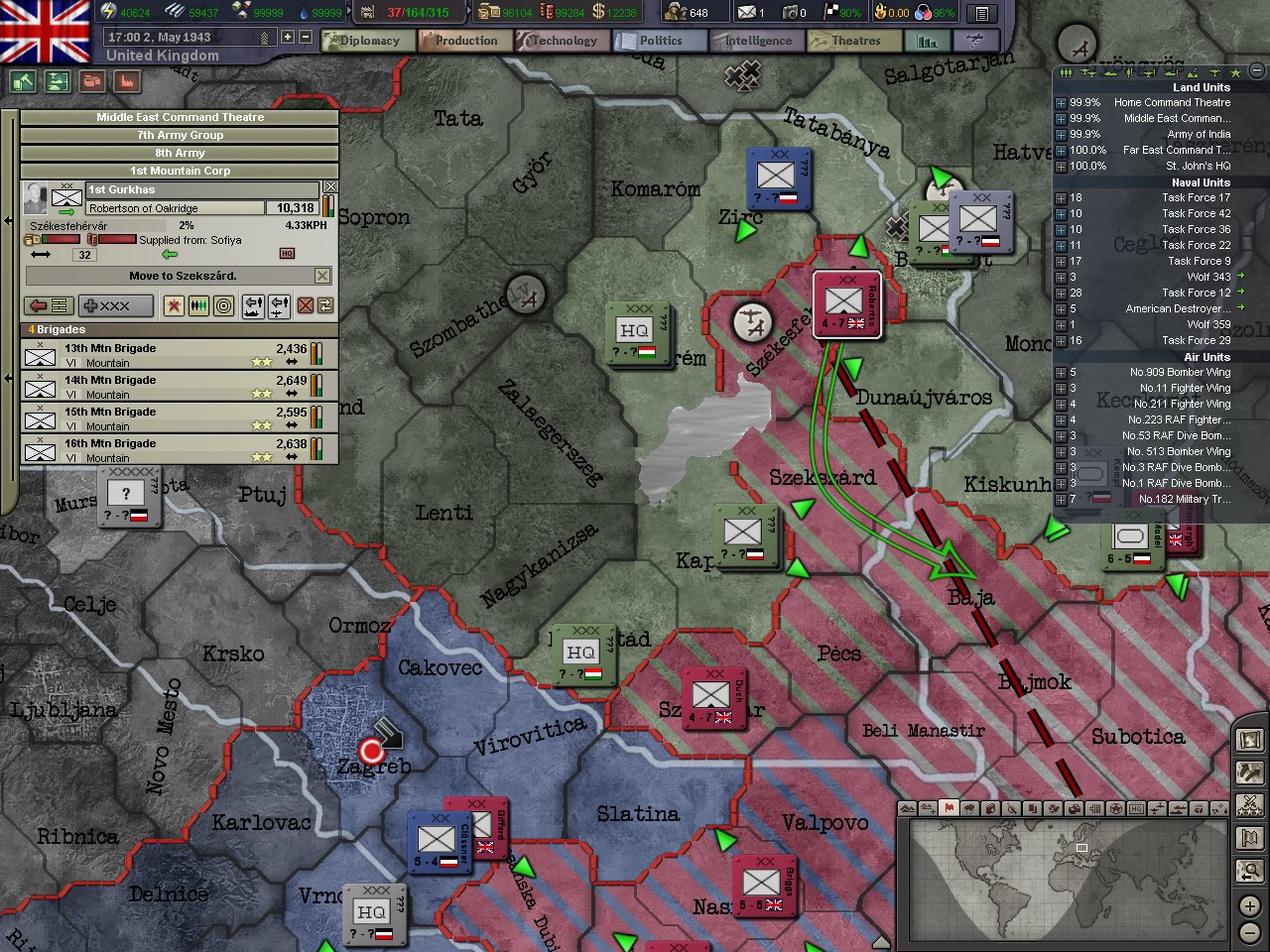
But before orders could even be dispatched to send troops north along the river, orders had to be issued sending troops south. Slovakian and German divisions were making a push to surround the Gurkhas and trap them north of our lines.
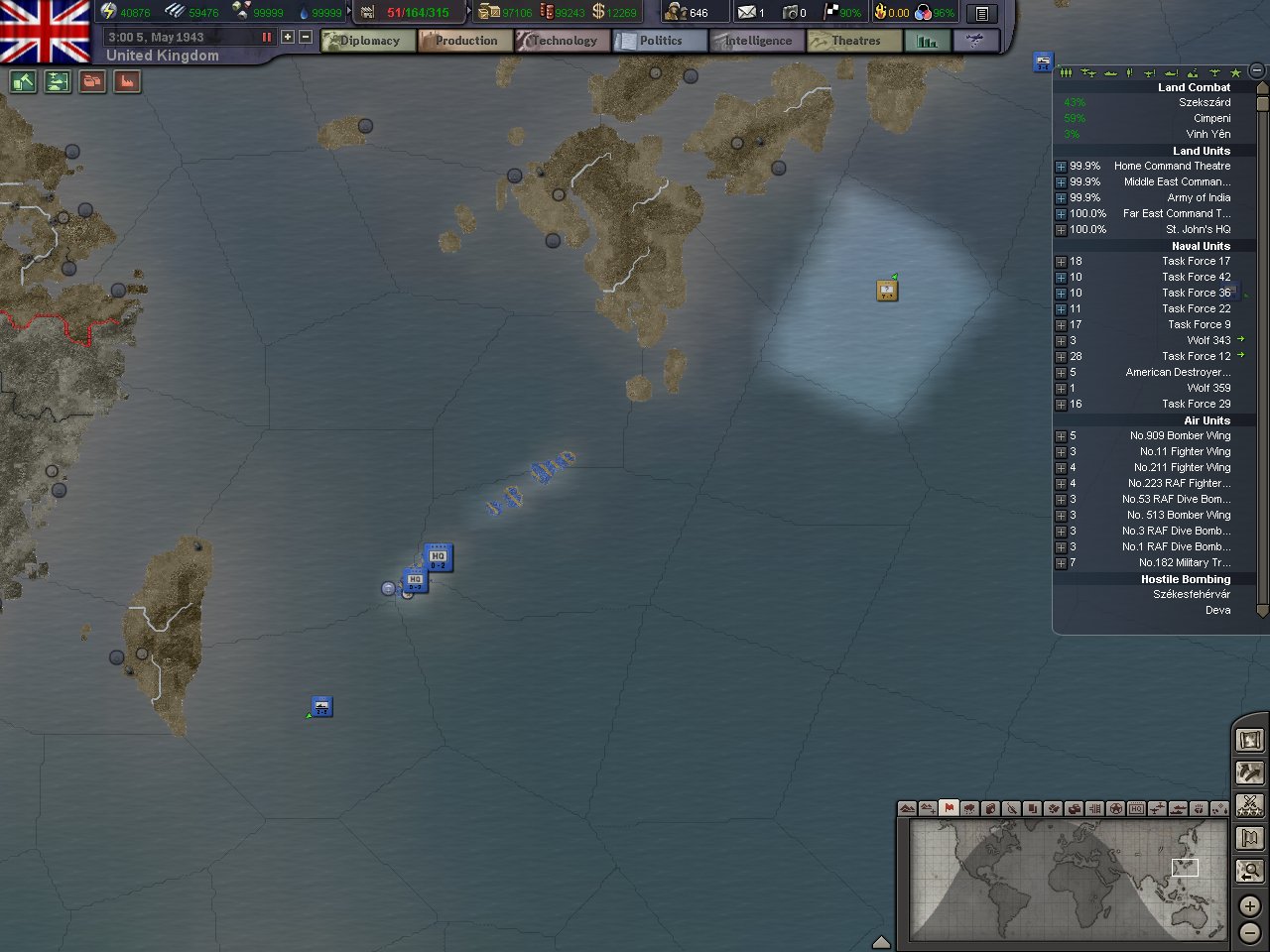
Away from the bloody battles around Budapest and Hanoi, American forces had landed and secured Okinawa, on the doorstep of the Japanese Home Islands. Reports of mass Japanese suicide attacks from Kamikaze planes and banzai charges were filling the news reels. The fighting the Americans were experiencing was the same type of fighting our troop had been enduring for almost two years against the Japanese.
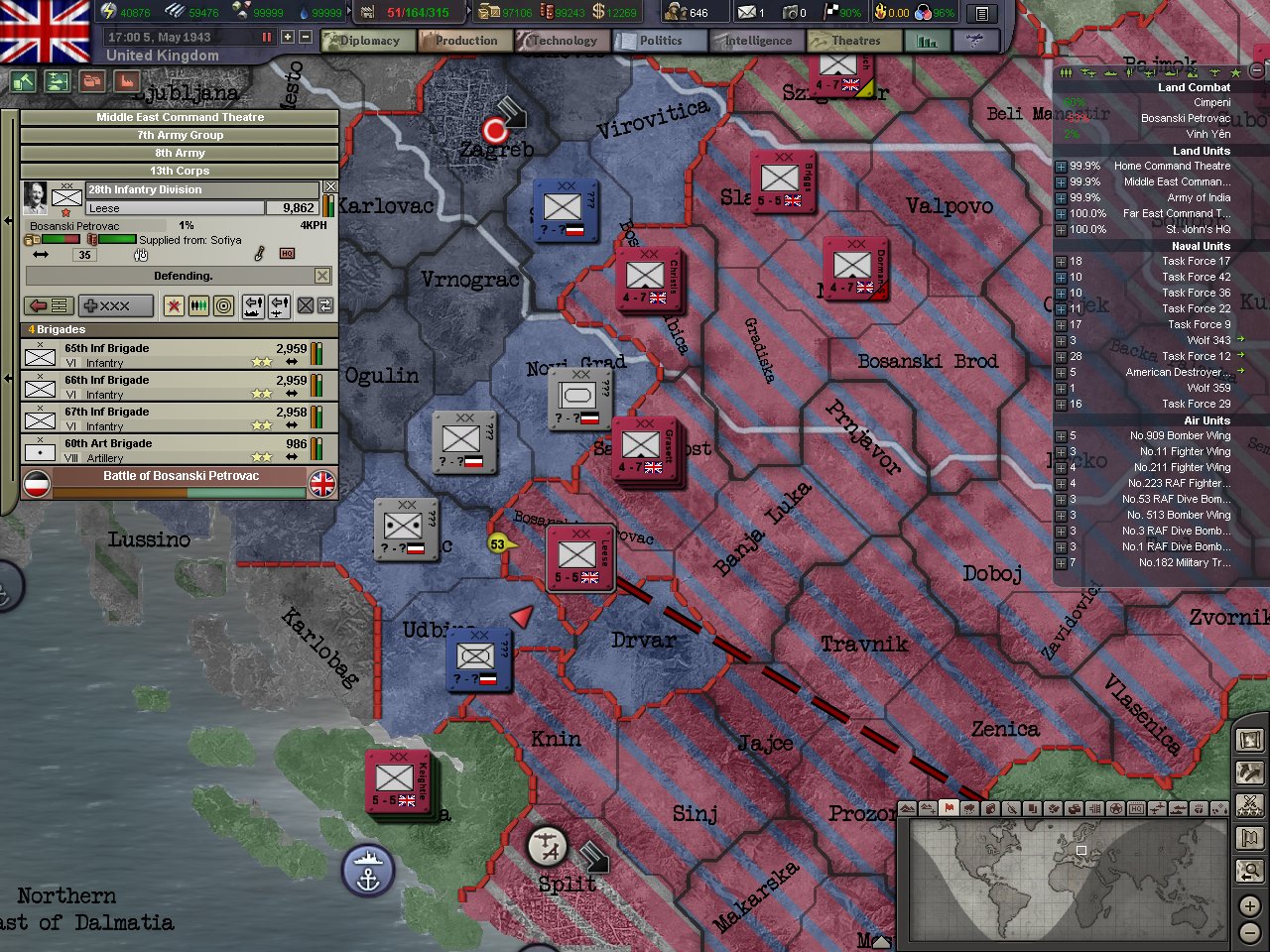
German units had managed to form a frontline and were trying to push us back from Zagreb in Croatia and were meeting with some success. Our troops would have to keep their cohesion and form orderly withdrawals in the face of this new German offensive. If our troops panicked it could spell disaster for our plans.
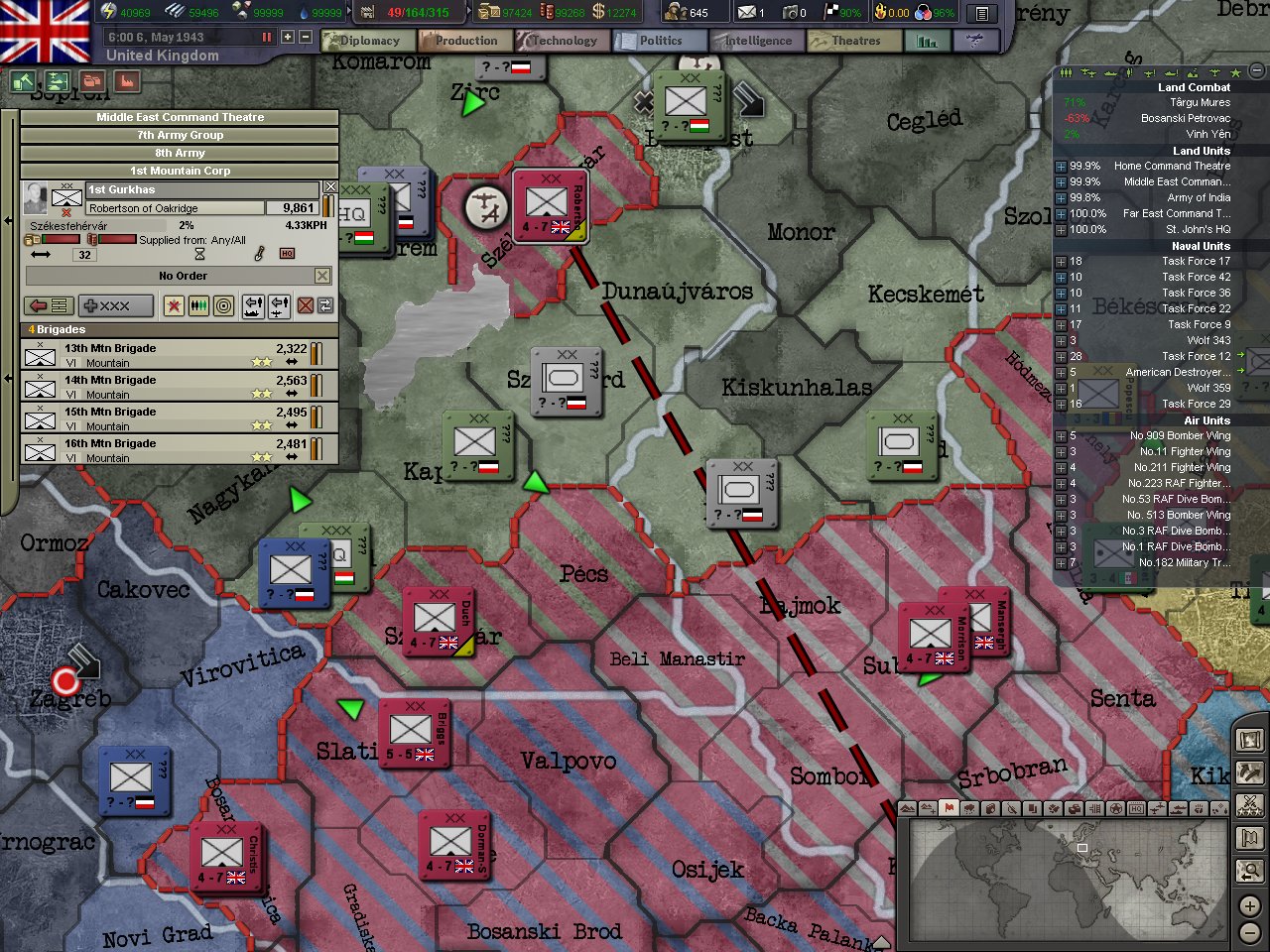
While German units had managed to form a front line and were trying to push us back from Zagreb in Croatia, in Slovakia, disaster had struck.
The 1st Gurkha Division was surrounded and now panzer divisions were standing between us and our troops. Finding troops to make an assault north to link up with the Gurkha's was now a priority, as our divisions were becoming more and more stretched along the front line, creating tantalizing gaps from Axis forces to expose.
The 1st Gurkha Division was surrounded and now panzer divisions were standing between us and our troops. Finding troops to make an assault north to link up with the Gurkha's was now a priority, as our divisions were becoming more and more stretched along the front line, creating tantalizing gaps from Axis forces to expose.
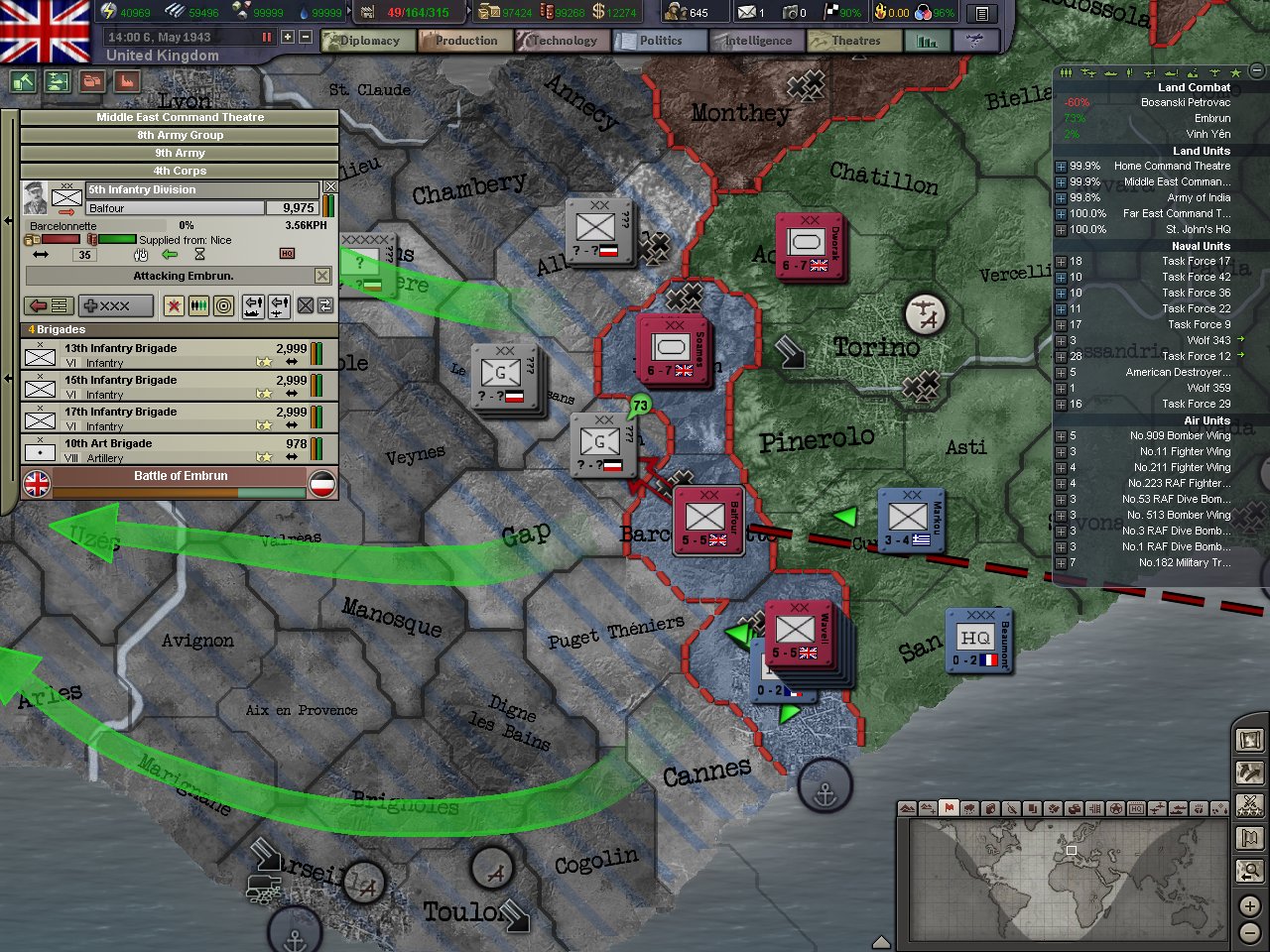
On the French border in the Alps, a general advance was ordered. German units, for some reason. Had left several regions and roads open for our troops. Free French Forces that were landed in Nice also joined us in this advance. Securing Toulon and the river to the west was now the objective.
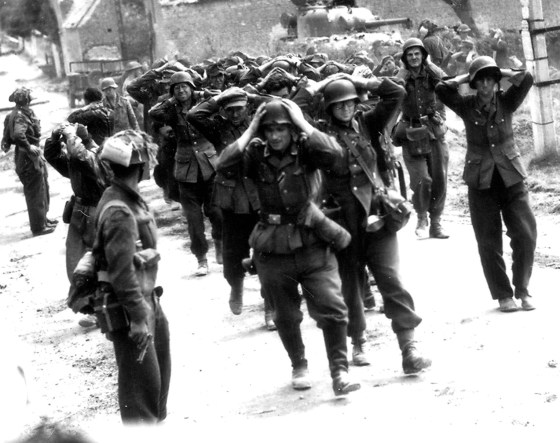
German conscripts from a garrison division surrender on mass to Empire soldiers of the 12 'Eastern' Division,'43
Raw German troops who were on the border were no match for our troops. Some of our soldiers had been fighting for almost 4 years, either in Europe in 1940 or in Africa in the year prior. The raw men of the Volkssturm that were across the lines to our men on the Franco-Italian border had no fight in them and didn't wish to tango with our dare devils.
Raw German troops who were on the border were no match for our troops. Some of our soldiers had been fighting for almost 4 years, either in Europe in 1940 or in Africa in the year prior. The raw men of the Volkssturm that were across the lines to our men on the Franco-Italian border had no fight in them and didn't wish to tango with our dare devils.
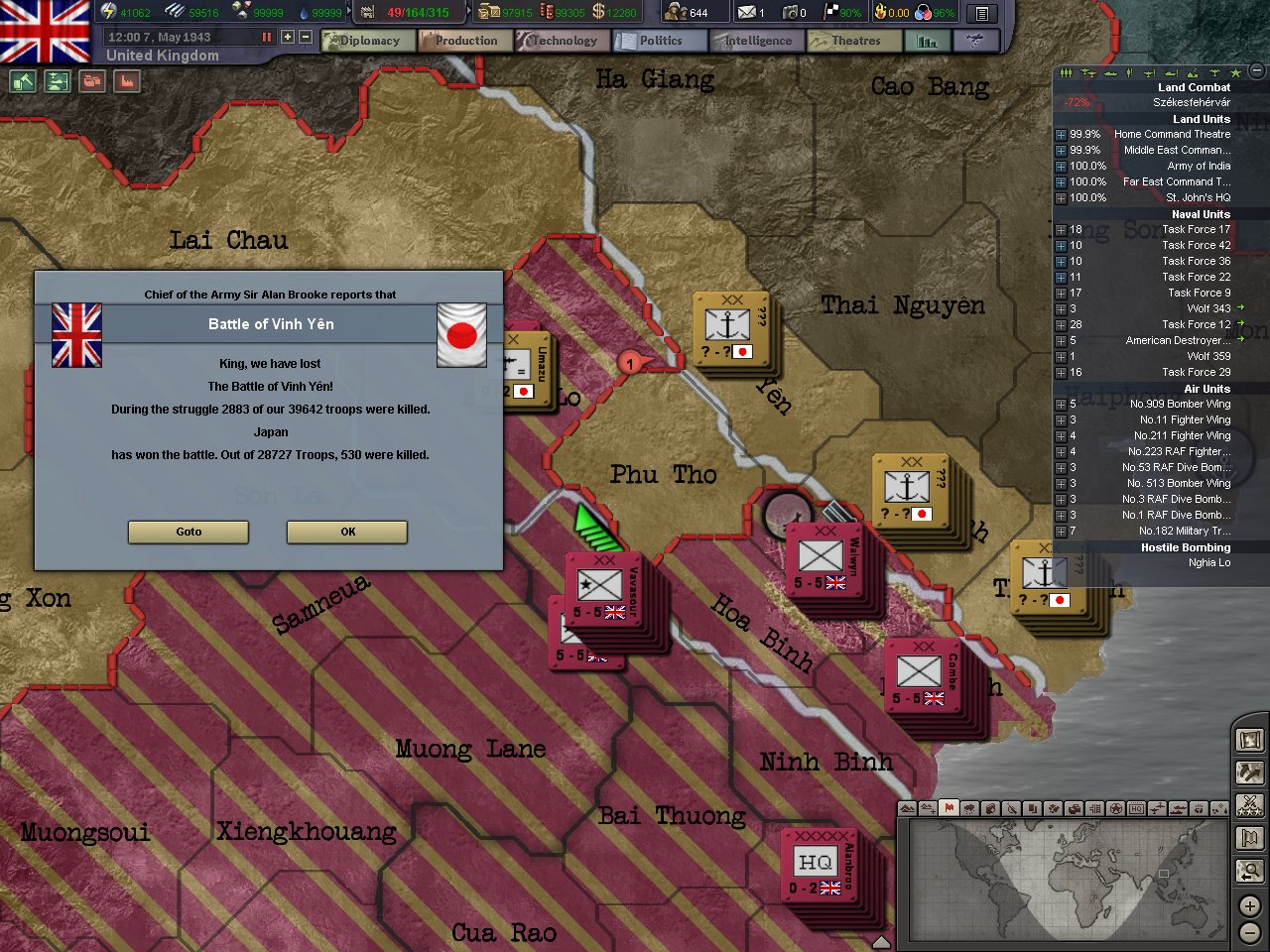
In Vietnam, our troops were fighting a desperate battle to force a river crossing to the north. Our troops went in wave after wave, and two Victoria Cross's were awarded to soldiers in the battles here.
When our attack was finally called off after we nearly lost three thousand men, the Japanese would launch their own attack. But thankfully reinforcements were rushed north and the Japanese attack was slaughtered and stopped.
When our attack was finally called off after we nearly lost three thousand men, the Japanese would launch their own attack. But thankfully reinforcements were rushed north and the Japanese attack was slaughtered and stopped.
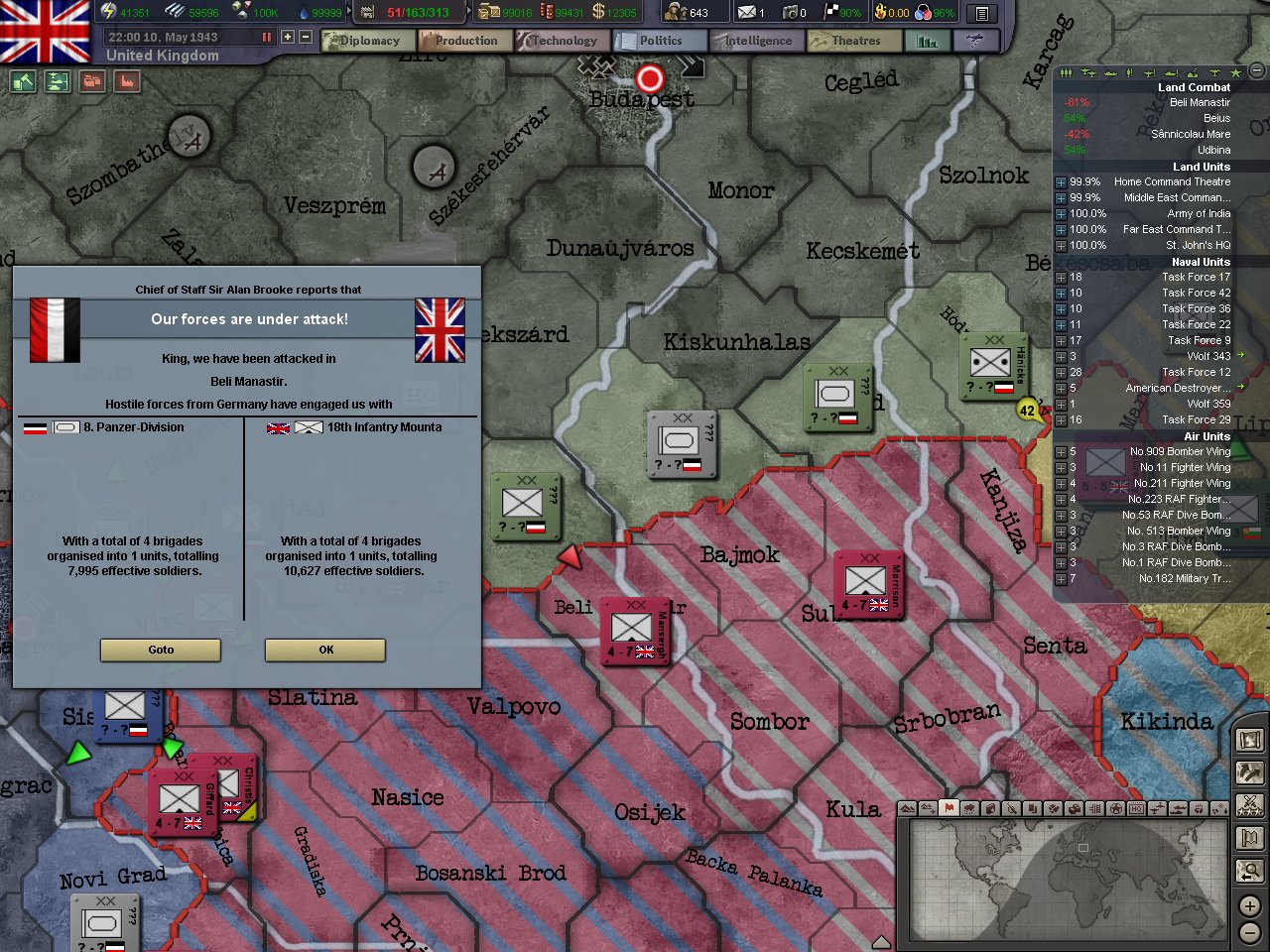
After four days of brutal fighting, Axis forces over ran and destroyed the 1st Gurkha Division. A total and complete casualty list was unknown for the Gurkha's, but from the fighting experience of those brave men who were surrounded, it was definitely high.
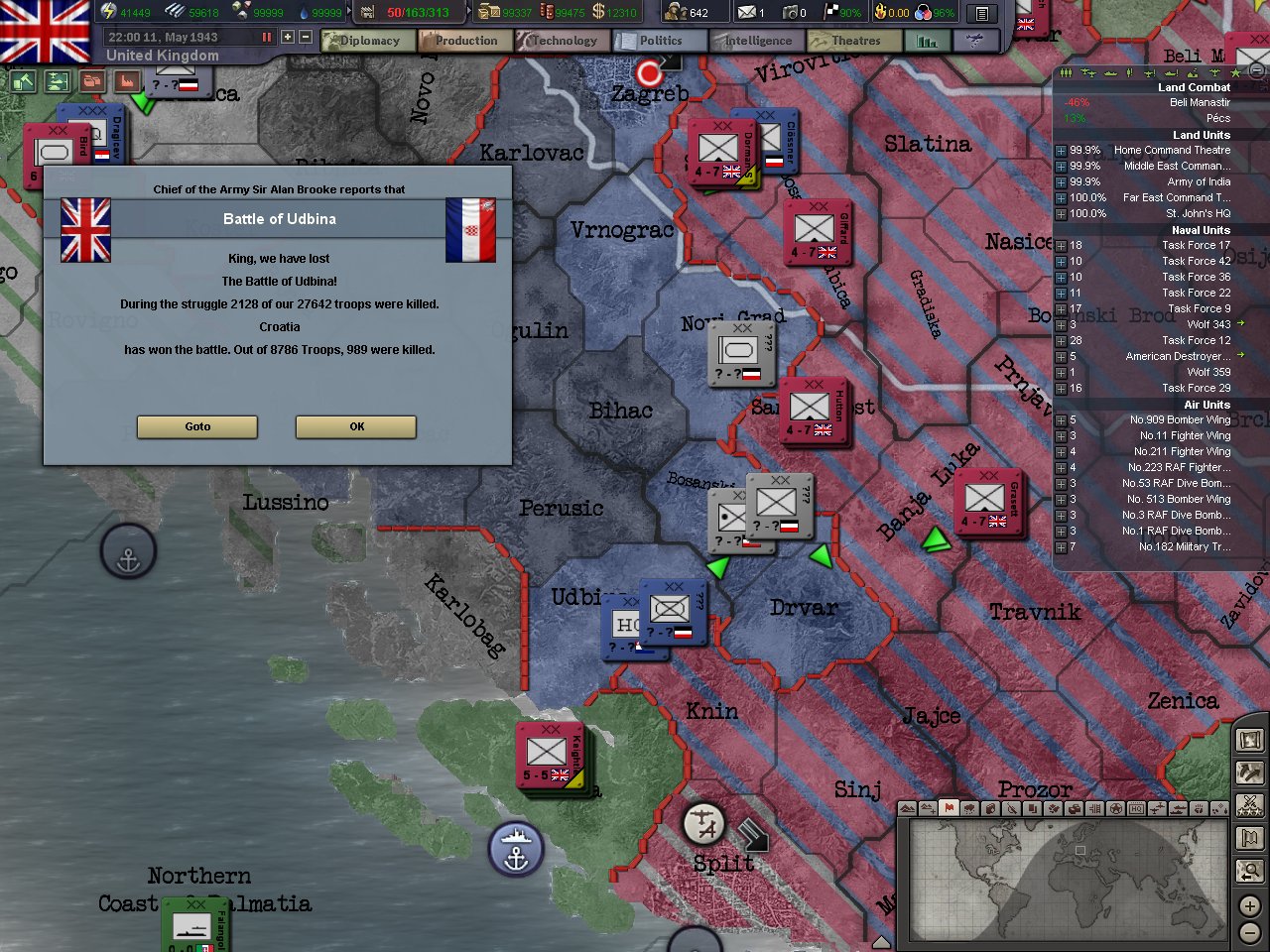
While disaster was striking in Slovakia, steady progress was being made in Croatia.
Our troops had once again advanced to the outskirts of the city of Zagreb and two German mechanized divisions and a infantry division were getting penned in as our forces advanced.
As our troops moved from the south, troops from the north in the Alps were advancing south to help surround Axis forces in Croatia. Once the fronts linked it. An advance into Germany either timed with Operation Juno or on it's own would be ordered.
Our troops had once again advanced to the outskirts of the city of Zagreb and two German mechanized divisions and a infantry division were getting penned in as our forces advanced.
As our troops moved from the south, troops from the north in the Alps were advancing south to help surround Axis forces in Croatia. Once the fronts linked it. An advance into Germany either timed with Operation Juno or on it's own would be ordered.
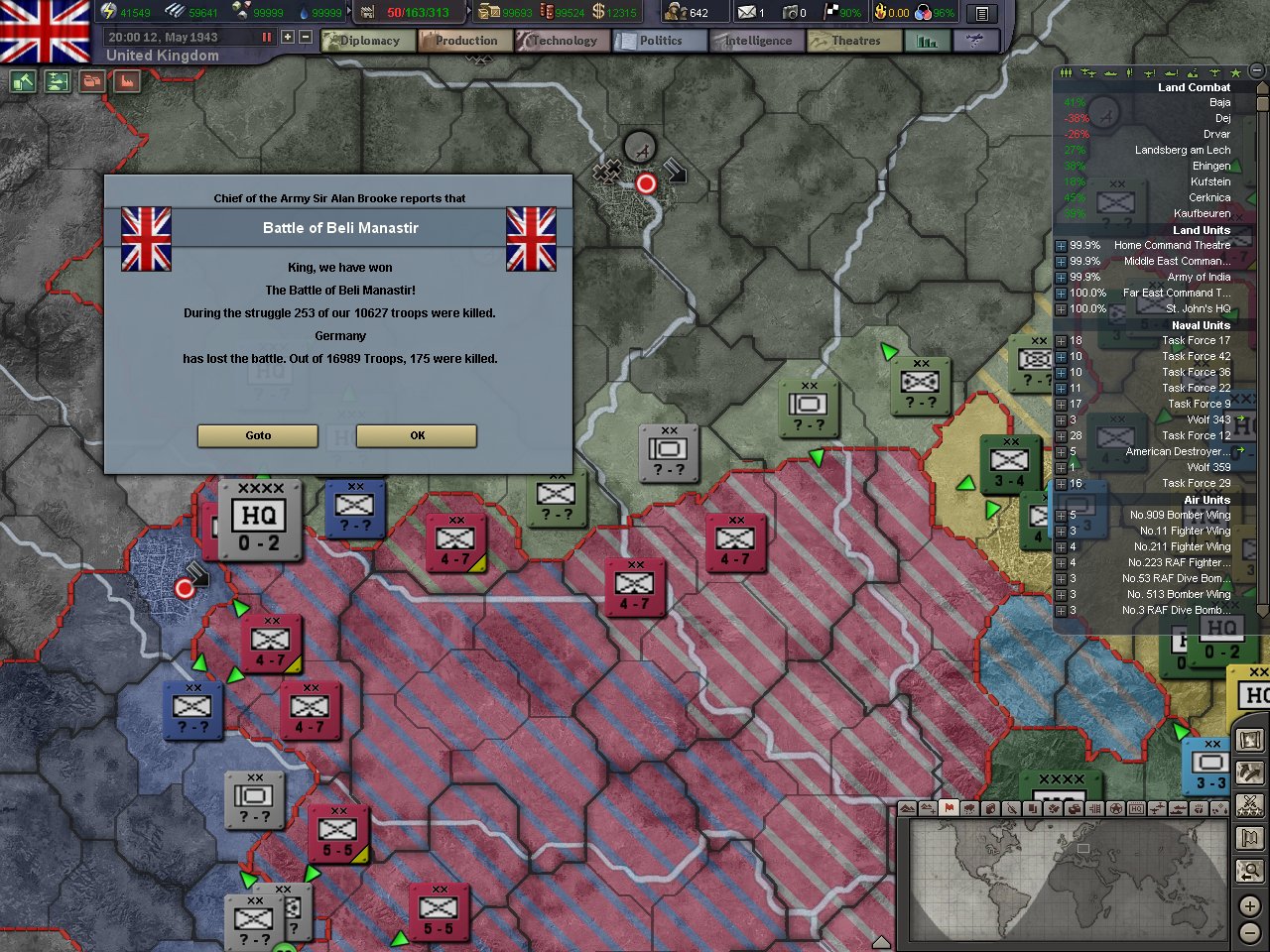
On the Slovakian front, Axis forces were making assaults on our line and were marching into gaps that we had neglected to shore up. Our brave Italian allies were hopefully going to move into the gap and shore up our right flanks.
Meanwhile in Germany...
Meanwhile in Germany...
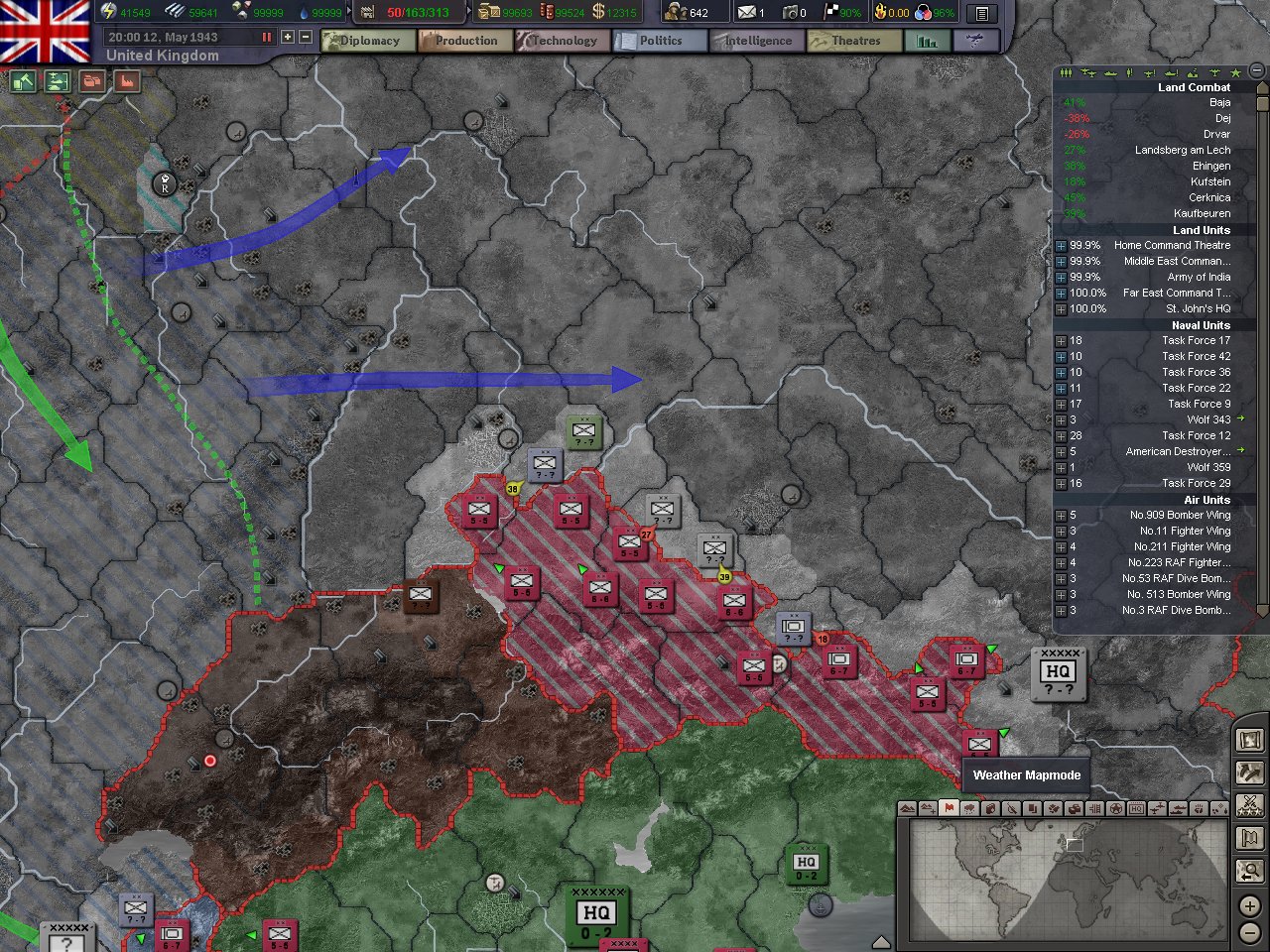
For the first time in the war, Allied forces were fighting in Germany, true Germany. The cities of Munich and Stuttgart were threatened by our forces and the seriousness of the situation was displayed by how hard the Germans were fighting. Every house and every block was contested to the death. These German soldiers were not going to simply roll over and let our men occupy a German city.
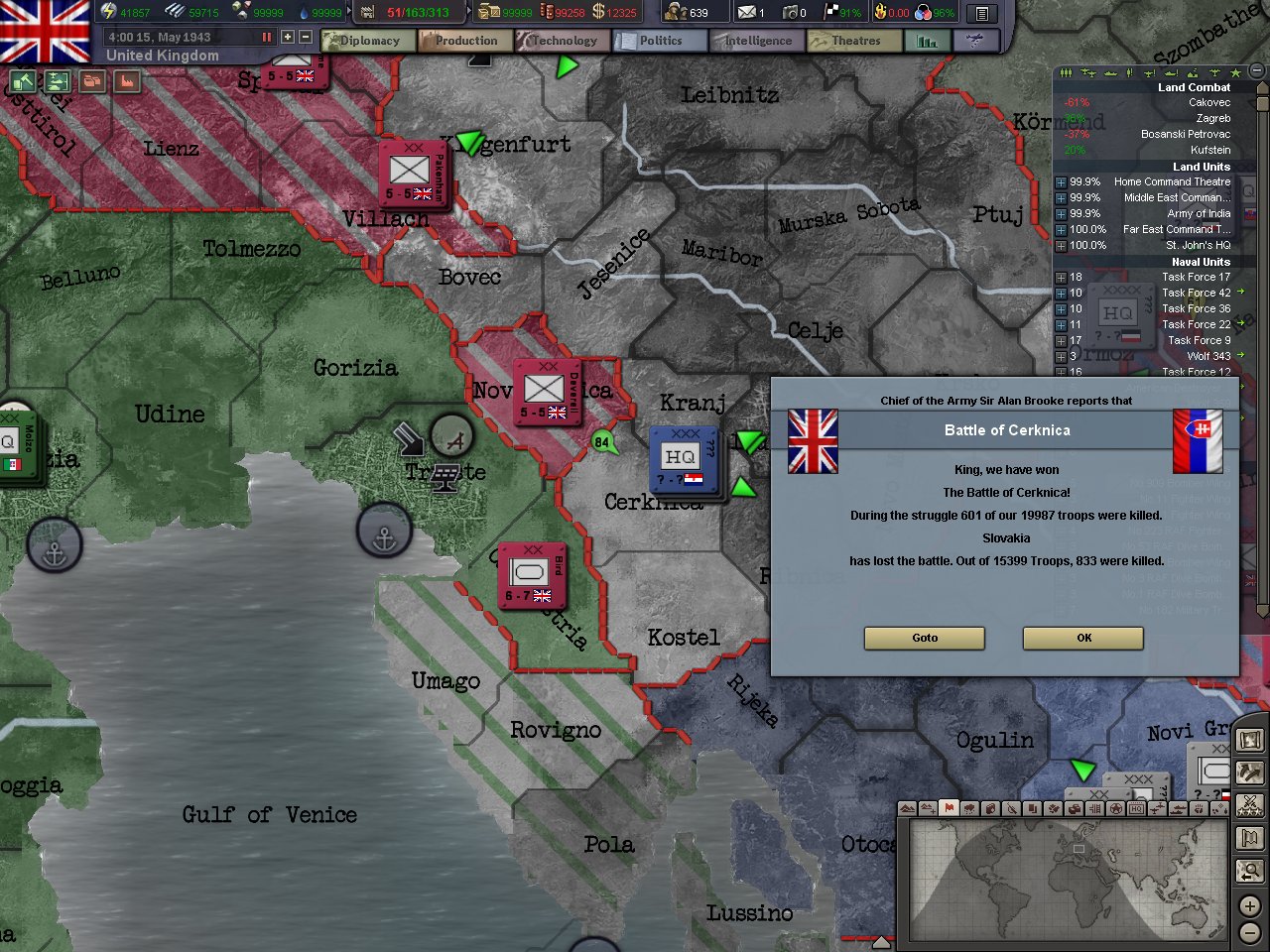
On the German-Italian border our forces were pushing Axis forces down south. It was a brutal fight and the Axis forces were becoming more desperate as their supply lines become more and more ragged. Our rapid advance had meant that Axis forces had had to abandon supply depots and much of their heavy equipment. As well as a shortage on gas and oil was hampering the German war effort.
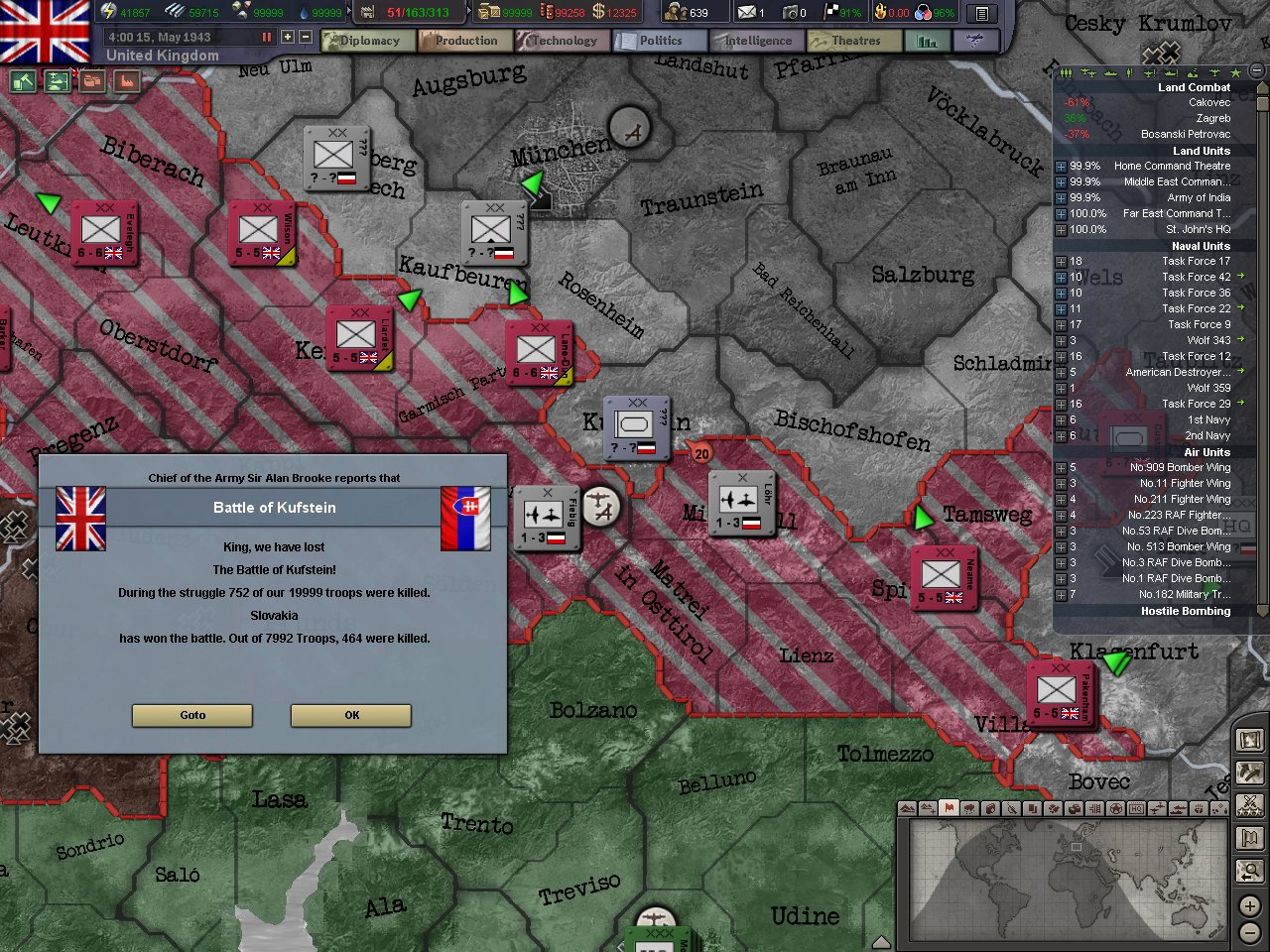
In the high mountain passes of the Alps, our boys were given a bloody beaten.
A Slovakian armored division, dug in deep to the mountain passes cut down our troops as they tried to get around dug in tanks and bunkers.
At the same time as our forces against the Slovakian's were being given a hard blow, our troops forced a German division back towards Munich. Hopefully it would become the first German city to fall to our forces.
A Slovakian armored division, dug in deep to the mountain passes cut down our troops as they tried to get around dug in tanks and bunkers.
At the same time as our forces against the Slovakian's were being given a hard blow, our troops forced a German division back towards Munich. Hopefully it would become the first German city to fall to our forces.
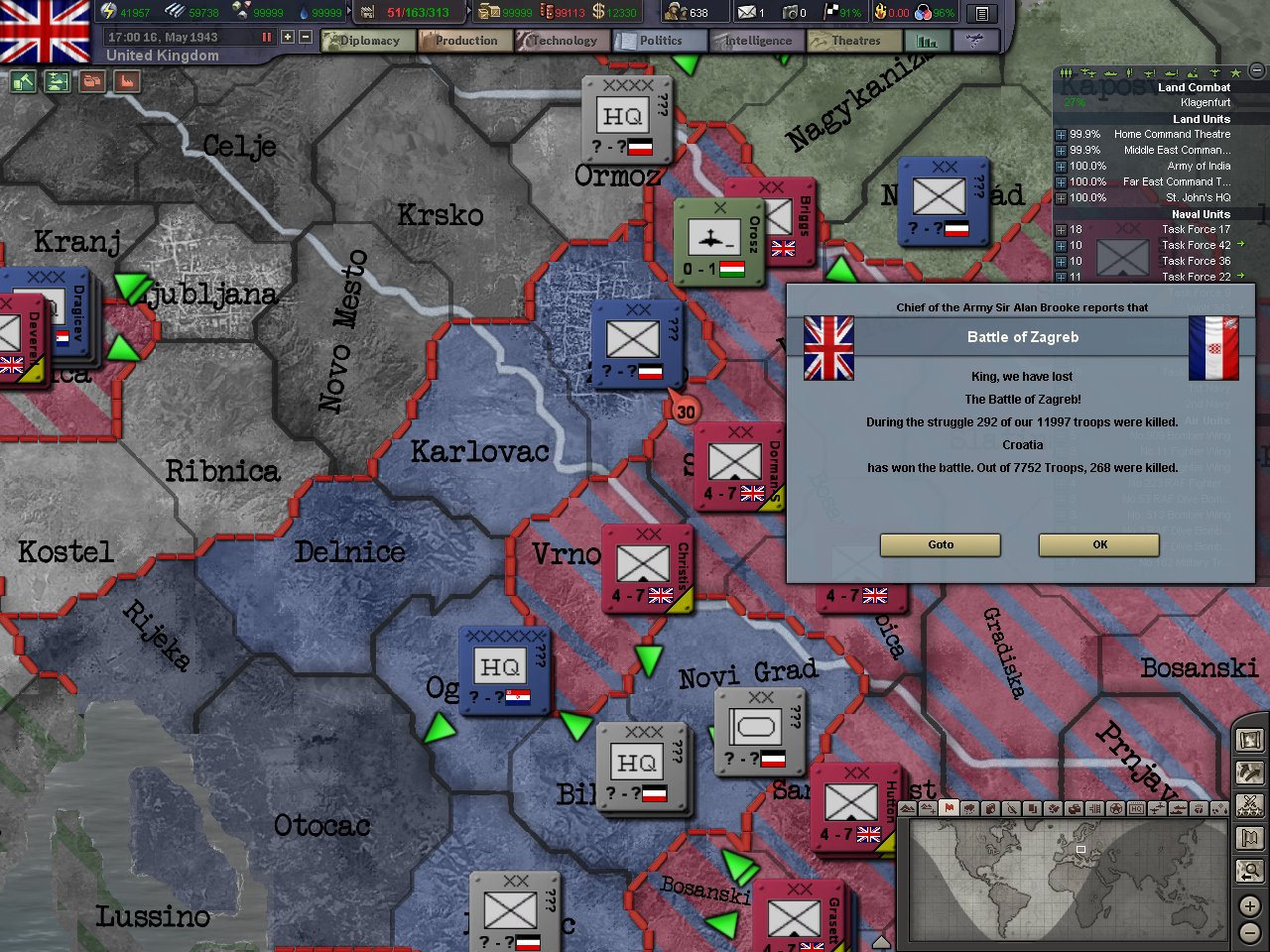
Gurkha units were now making an assault on Zagreb, but once again Croatian and German troops were dug into the city and were not about to give it up. And just to the south, our forces had managed to get around the river and were now behind a German panzer division. Our forces were rushed to try and surround and destroy that division.
While bloody fighting continued in the Balkans, as it had for over three years. Clandestine operations were being run in France to gain intelligence for the coming invasion.
While bloody fighting continued in the Balkans, as it had for over three years. Clandestine operations were being run in France to gain intelligence for the coming invasion.
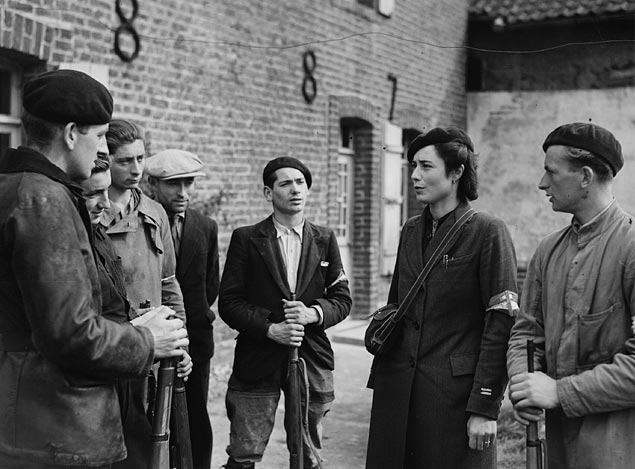
Members of the French Maquis near Calais, noteable members are-Gerald Nickopeles (far right) and Tabitha Ker (second from right) who risked their lives gaining information before Operation Juno
RAF recon planes, as well as SOE operatives in cooperation with the French resistance were busy gaining intelligence on the planned landing zones for Operation Juno.
Information gained showed no major fortifications on the coast, and a garrison division as well as two other unidentified divisions in the Calais and Dunkirk area. These divisions would be the main enemy forces that the Royal Marines would go up against when the landings were made.
RAF recon planes, as well as SOE operatives in cooperation with the French resistance were busy gaining intelligence on the planned landing zones for Operation Juno.
Information gained showed no major fortifications on the coast, and a garrison division as well as two other unidentified divisions in the Calais and Dunkirk area. These divisions would be the main enemy forces that the Royal Marines would go up against when the landings were made.
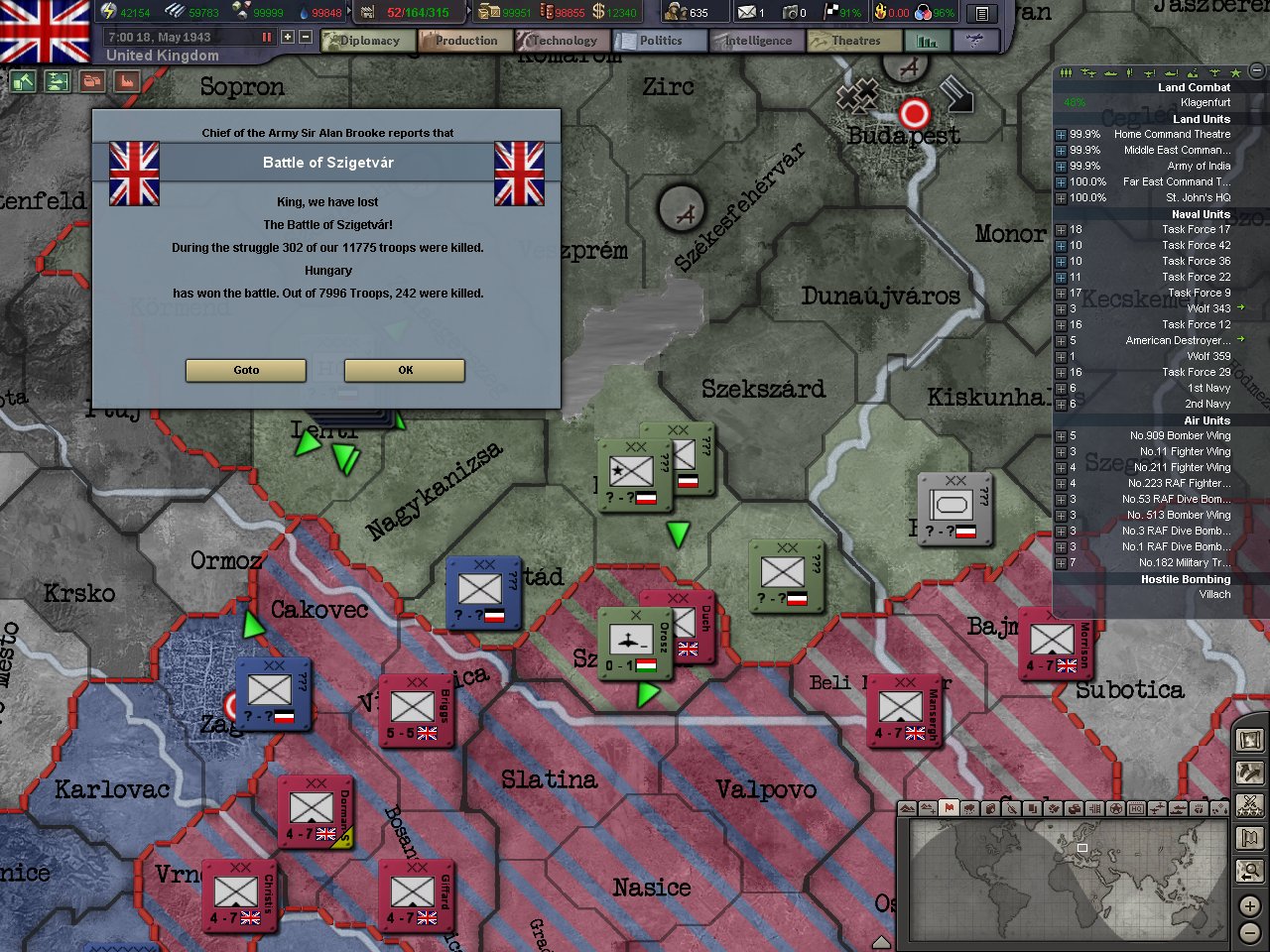
As Croatian forces kept the fight up in Zagreb, a Slovakian SS division pushed our forces back across the Slovak border in a bloody battle.
And finally the 7th Panzer Division, to the south of Zagreb was encircled by our forces, as our forces from the Alps kept inching south closing the noose around the neck of the Axis in Croatia.
And finally the 7th Panzer Division, to the south of Zagreb was encircled by our forces, as our forces from the Alps kept inching south closing the noose around the neck of the Axis in Croatia.
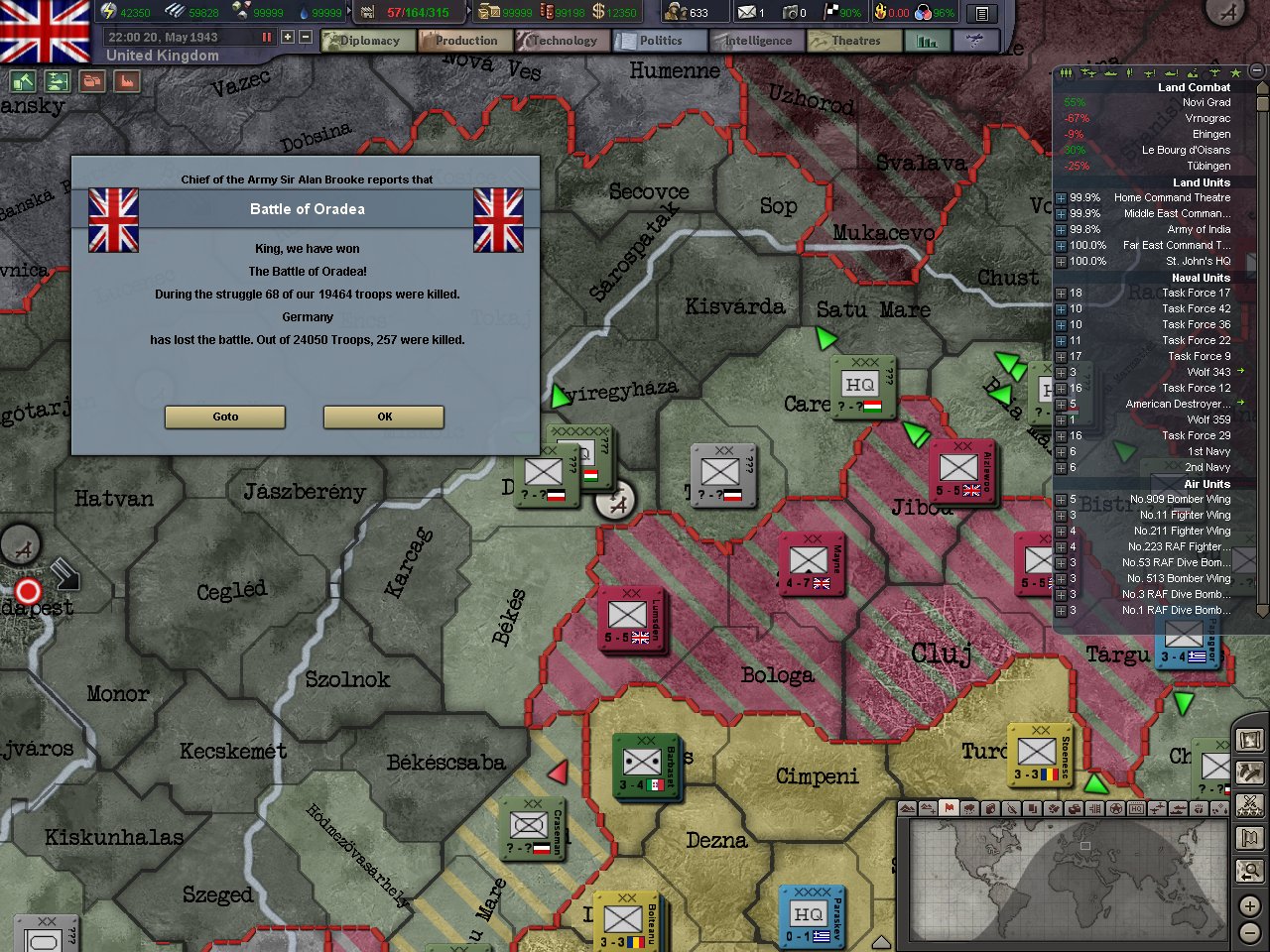
In eastern Slovakia, our troops kept marching forward.
Our recent advancements was actually bringing our forces within several kilometers of the Soviet border. Which presented a unique situation, our forces could advance into Soviet territory and liberate it,but that may cause an international incident since that would be even more foreign troops inside the Soviet Union. So until our allied forces brought up their divisions and troops onto our frontline, and a diplomatic issue could be solved,only an advance into Slovakia and to the capital of Budapest was ordered. We would not risk advancing into Soviet territory, even if Germany occupied it.
Our recent advancements was actually bringing our forces within several kilometers of the Soviet border. Which presented a unique situation, our forces could advance into Soviet territory and liberate it,but that may cause an international incident since that would be even more foreign troops inside the Soviet Union. So until our allied forces brought up their divisions and troops onto our frontline, and a diplomatic issue could be solved,only an advance into Slovakia and to the capital of Budapest was ordered. We would not risk advancing into Soviet territory, even if Germany occupied it.
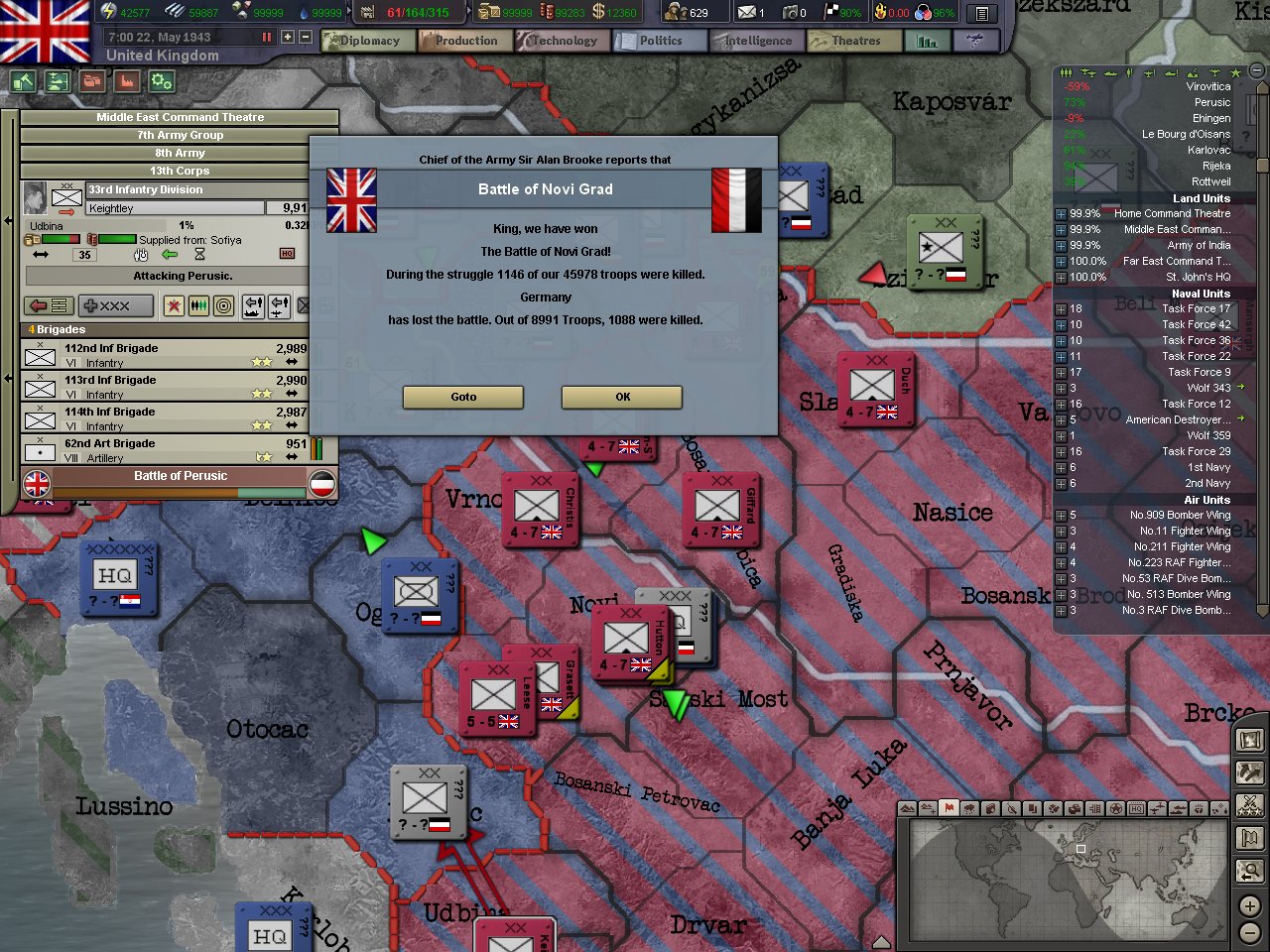
After a week of savage fighting, the 7th Panzer division was destroyed.
Just less than seven thousand Germans were marched into captivity and then sailed to Egypt to be put into POW camps. The destruction of this division that had been in such a thorn in our side was a small coup for our hopes in Croatia.
Just less than seven thousand Germans were marched into captivity and then sailed to Egypt to be put into POW camps. The destruction of this division that had been in such a thorn in our side was a small coup for our hopes in Croatia.
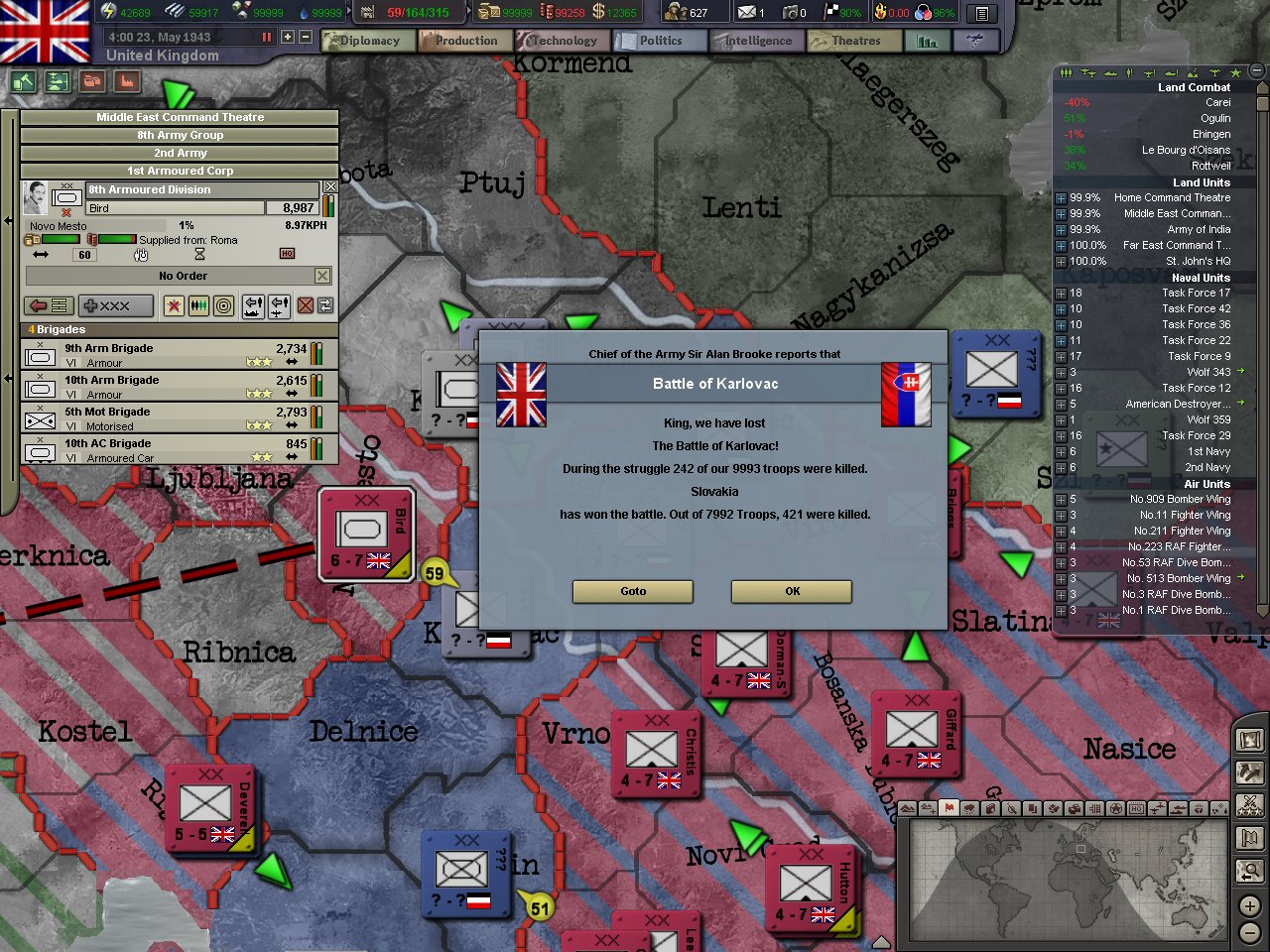
Vicious fighting would be the mainstay around Zagreb. Axis forces were fighting desperately to either escape Croatia or hold our men back from taking Zagreb. Cruelty on both sides was common place and quarter was rarely offered or given.
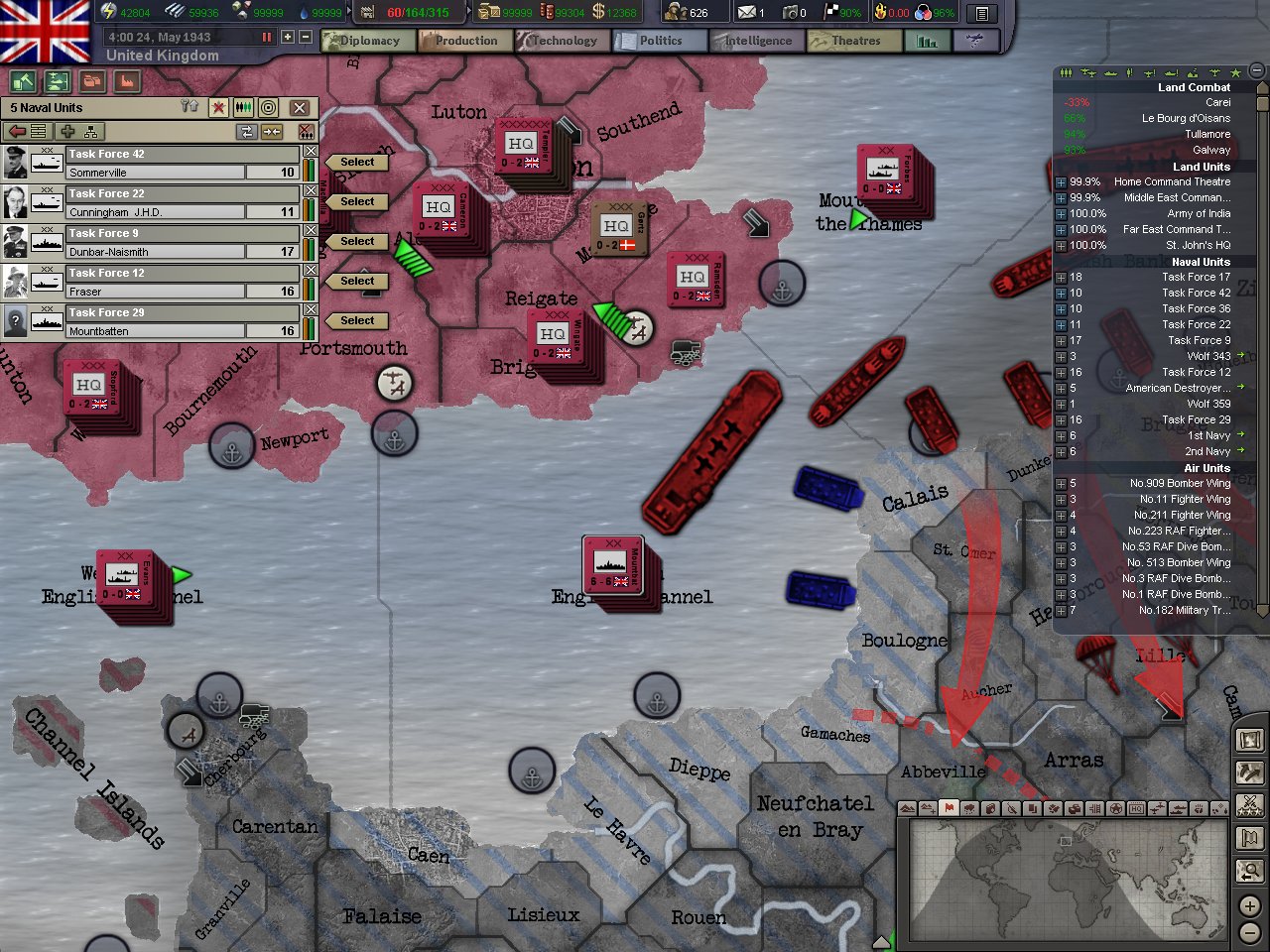
In the last days of May, almost all of the Royal Navy that was still in the European theater was massed on the southern and eastern coast of England.
Task Forces 42,22,9,12, and 29. With battleships such as the- Rodney, Royal Soverign, Nelson, Hood, Queen Elizabeth. And carriers like Ark Royal, Glorious, Furious and Courageous, and Eagle.
A whole host of RAF fighters were also being massed on airfields in the south. Troops flooded coastal towns and the port cities. Supplies were stockpiled and equipment was ready to replace destroyed tanks and landing craft. As well as medical centers were ready and set up to deal with the flood of wounded that was assumed would come.
Task Forces 42,22,9,12, and 29. With battleships such as the- Rodney, Royal Soverign, Nelson, Hood, Queen Elizabeth. And carriers like Ark Royal, Glorious, Furious and Courageous, and Eagle.
A whole host of RAF fighters were also being massed on airfields in the south. Troops flooded coastal towns and the port cities. Supplies were stockpiled and equipment was ready to replace destroyed tanks and landing craft. As well as medical centers were ready and set up to deal with the flood of wounded that was assumed would come.
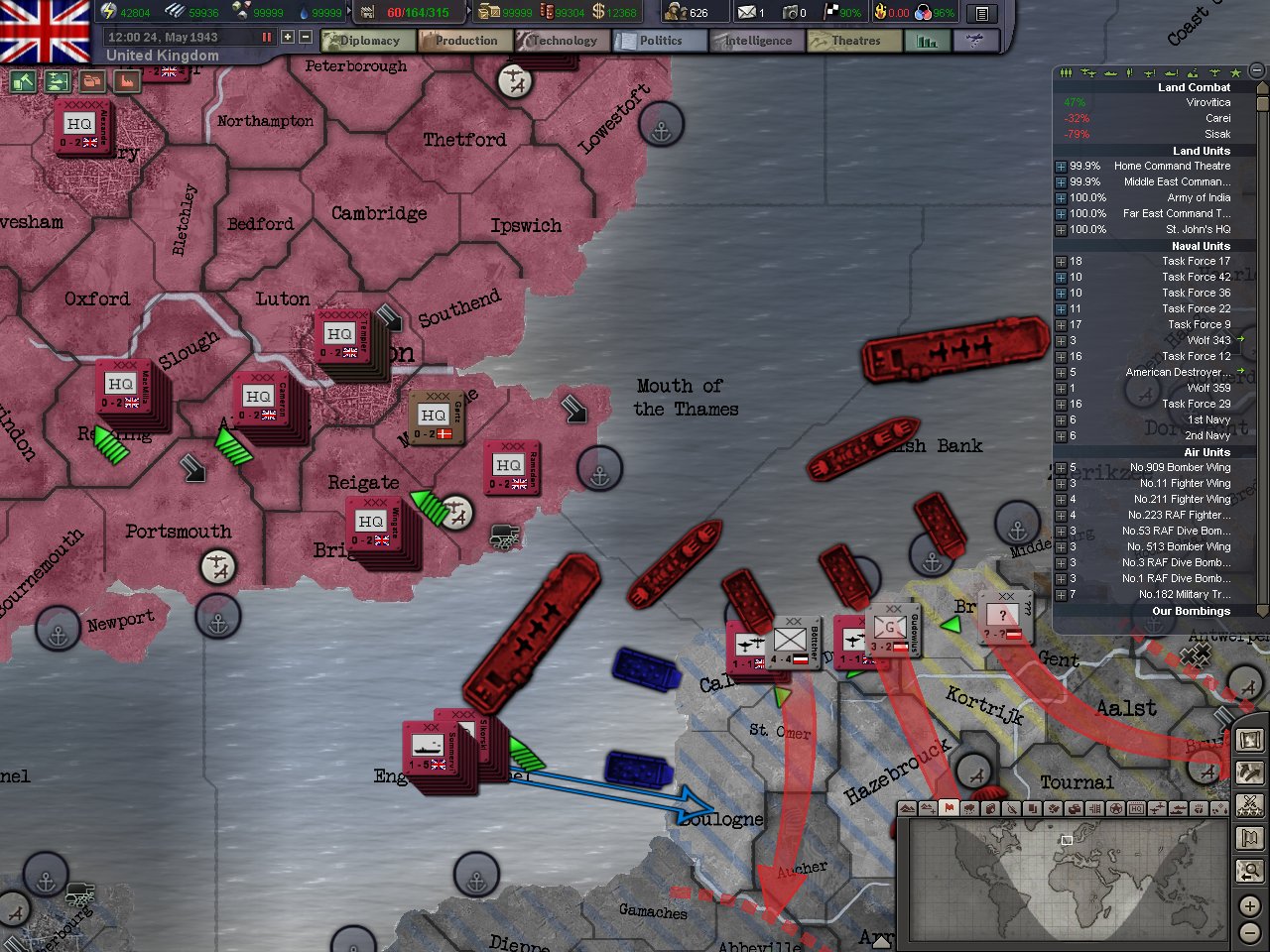
In the early morning of May 24th, a meeting of the General Headquarters in England was ordered. A quick change of plans was made to Juno, two Commando corps would be landed not on Calais or Dunkirk, but to the west of Calais and away from the jaws of waiting German divisions.
The original plan for the landings was to land them in the early morning. But due to the change of plans and weather, the boats didn't hit the beach till nearly eight in the morning. Paratroopers still hit their landing zones at the ordered time and were only told of the new landing sites in the plane to maximize secrecy.
Royal Navy ships sailed up and down the coast lobbing shells on the beach and inland. And RAF fighters and bombers hit the the German divisions, as well as roads and bridges the Germans would have to hit.
The original plan for the landings was to land them in the early morning. But due to the change of plans and weather, the boats didn't hit the beach till nearly eight in the morning. Paratroopers still hit their landing zones at the ordered time and were only told of the new landing sites in the plane to maximize secrecy.
Royal Navy ships sailed up and down the coast lobbing shells on the beach and inland. And RAF fighters and bombers hit the the German divisions, as well as roads and bridges the Germans would have to hit.
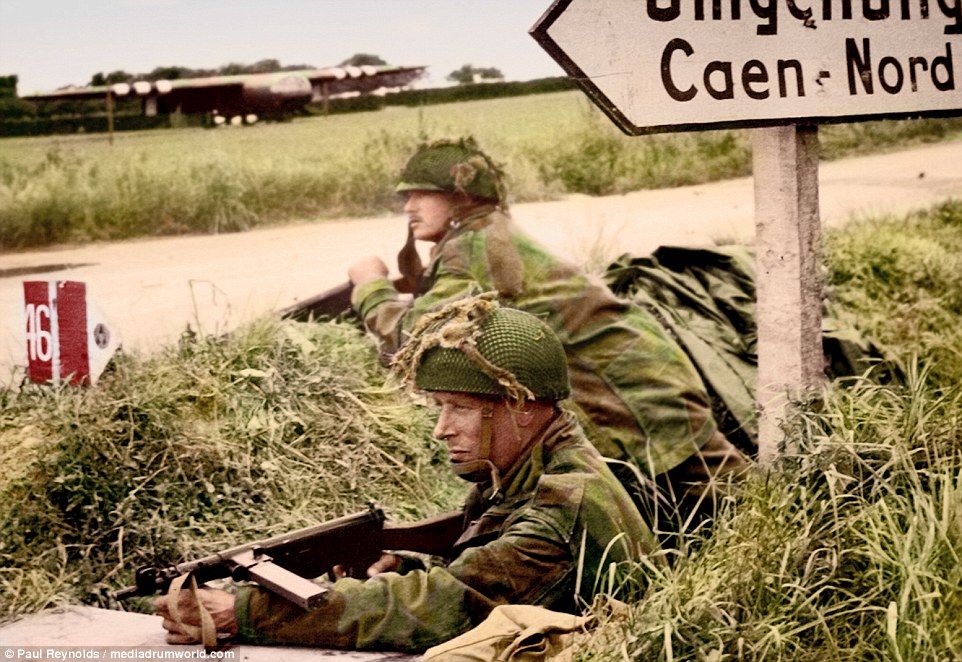
two paratroopers from 1st Parachute Division, or 1 Para, holding a crossroads in France, looking for relieve that was hoped would come before mass German formations could try and force their way through to the beach
The climax of the war was now happening. A mass landing on the French coast was underway, our troops were liberating cities in southern France. Other forces were fighting in Germany herself outside Munich and Stuggart, and were carving a bloody path through the Balkans linking up with other Empire divisions along the way.
In the Far East, our troops were still locked in a bloody stalemate and soon a major operation was going to be needed to either destroy the Japanese, or isolate them and go around. Either way, something would have to change in the Far East so that an advance could continue on towards Tokyo.
As the great crusade begins in the west that will hopefully lift the iron shroud that has been laid across western Europe, our forces in the Balkans and Far East are locked in a bloody struggle that has only been getting more and more vicious.
The climax of the war was now happening. A mass landing on the French coast was underway, our troops were liberating cities in southern France. Other forces were fighting in Germany herself outside Munich and Stuggart, and were carving a bloody path through the Balkans linking up with other Empire divisions along the way.
In the Far East, our troops were still locked in a bloody stalemate and soon a major operation was going to be needed to either destroy the Japanese, or isolate them and go around. Either way, something would have to change in the Far East so that an advance could continue on towards Tokyo.
As the great crusade begins in the west that will hopefully lift the iron shroud that has been laid across western Europe, our forces in the Balkans and Far East are locked in a bloody struggle that has only been getting more and more vicious.





